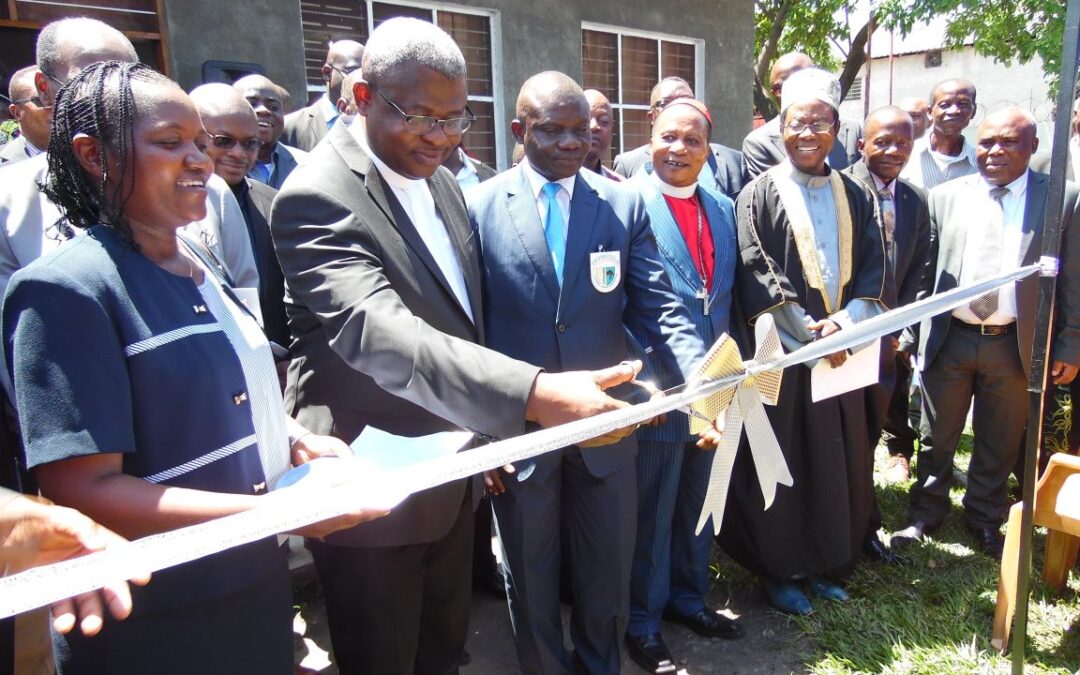
Nov 14, 2017 | Focolare Worldwide
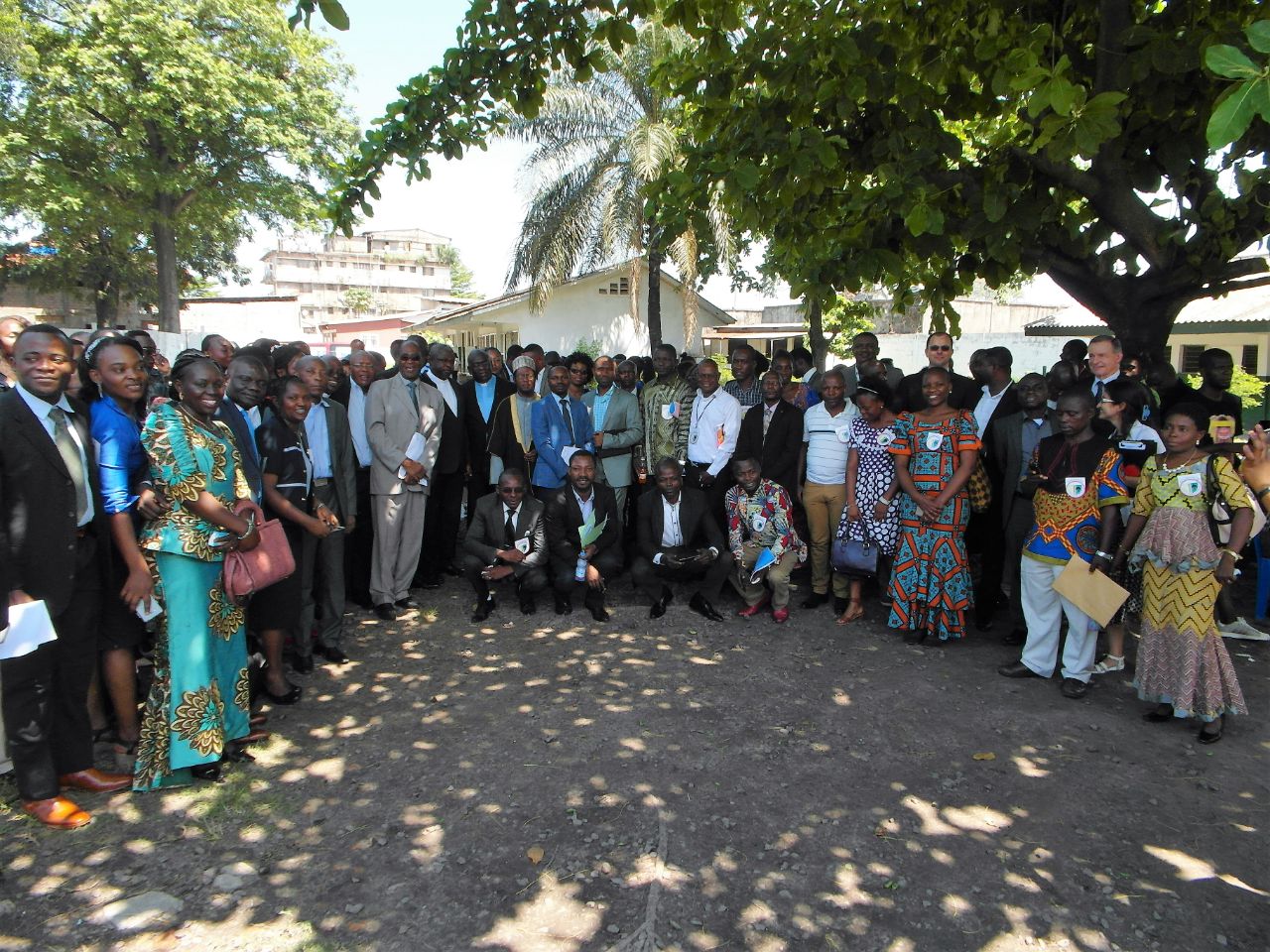 The political and social context is very dangerous and the per capita income is among the lowest in the world as pressure from international powers is being placed on the enormous natural resources of the region. But there is also the echo of the great African leaders from the twentieth century, from Nkruah to Senghor, from Lumumba to Nyerere that still resonates like a warning to leave the past behind and set great goals that “always seem impossible until done” (Mandela). It was in that context that on November 4th of last year the Ecoforleaders School of Higher Training in Communion Leadership was inaugurated in Kinshasa, Democratic Republic of the Congo in the presence of several political, diplomatic, academic ((among whom the Rectors of the Catholic University and the University of Mapon, and the two Emeritus Rectors of the Kasangani University and the National Pedagogy), Christian and Muslim religious leaders in an attempt to lift up a hope for openness in that African country. It all began with a group of African students who wondered how they could offer themselves for the building of a new Africa. Now they are working with the support of Sophia University Institute and the Focolare’s International Centre of the Movement for Unity in Politics.
The political and social context is very dangerous and the per capita income is among the lowest in the world as pressure from international powers is being placed on the enormous natural resources of the region. But there is also the echo of the great African leaders from the twentieth century, from Nkruah to Senghor, from Lumumba to Nyerere that still resonates like a warning to leave the past behind and set great goals that “always seem impossible until done” (Mandela). It was in that context that on November 4th of last year the Ecoforleaders School of Higher Training in Communion Leadership was inaugurated in Kinshasa, Democratic Republic of the Congo in the presence of several political, diplomatic, academic ((among whom the Rectors of the Catholic University and the University of Mapon, and the two Emeritus Rectors of the Kasangani University and the National Pedagogy), Christian and Muslim religious leaders in an attempt to lift up a hope for openness in that African country. It all began with a group of African students who wondered how they could offer themselves for the building of a new Africa. Now they are working with the support of Sophia University Institute and the Focolare’s International Centre of the Movement for Unity in Politics. 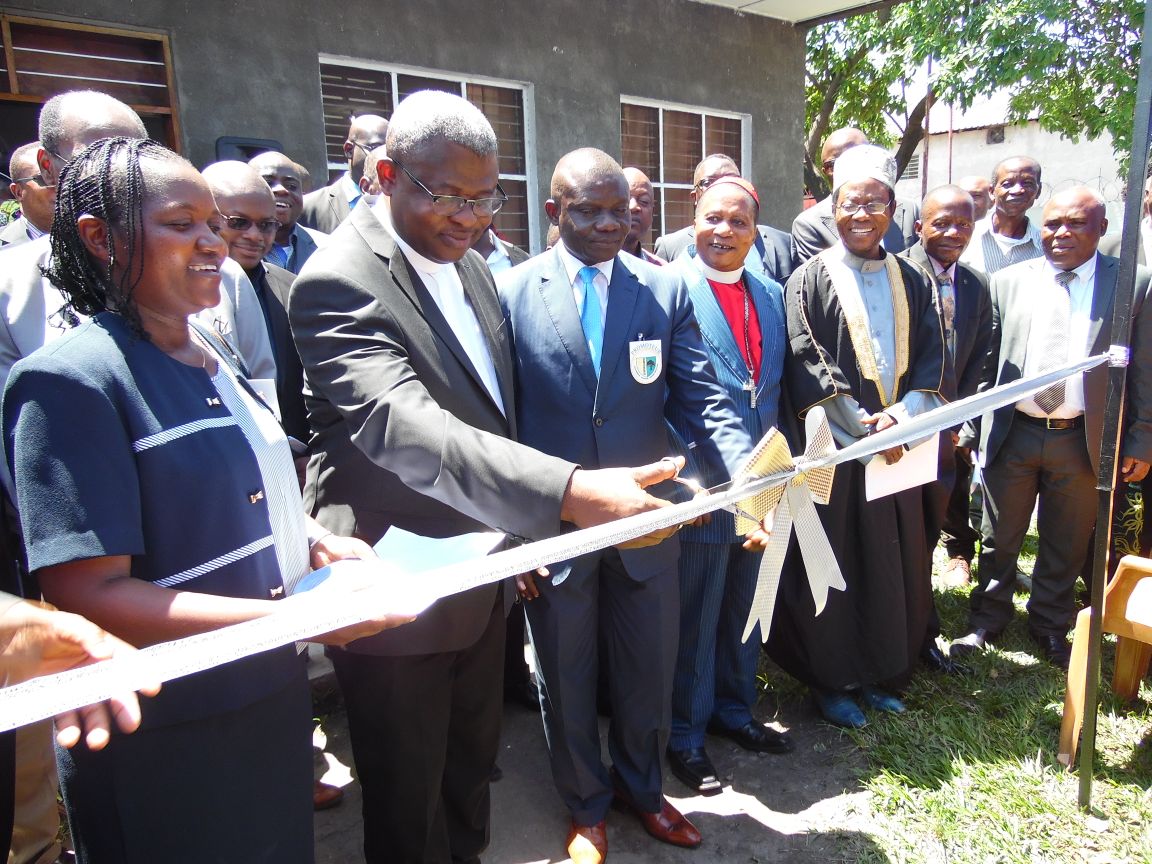 The Secretary of the Bishops Conference of the Democratic Republic of the Congo was invited to cut the ribbon, a man know for having conducted the dialogue between politicians of the majority and opposition leaders during the election controversy that linked the presidential election date to the next census. The Secretary remains a point of encounter between the parties until this day. Five students will begin courses given by a faculty that includes three university rectors and several tutors. This is not an isolated initiative, because the School is inserted into a broader project already presented at UNESCO, a project of formation in a leadership style inspired by universal brotherhood, which include the training of tutors and professors in Nairobi next January. The project is of interest to the whole East of Africa and will last for three years. Afterwards, it will be expanded to other regions of the continent. See also: News Repubblica Democratica del Congo
The Secretary of the Bishops Conference of the Democratic Republic of the Congo was invited to cut the ribbon, a man know for having conducted the dialogue between politicians of the majority and opposition leaders during the election controversy that linked the presidential election date to the next census. The Secretary remains a point of encounter between the parties until this day. Five students will begin courses given by a faculty that includes three university rectors and several tutors. This is not an isolated initiative, because the School is inserted into a broader project already presented at UNESCO, a project of formation in a leadership style inspired by universal brotherhood, which include the training of tutors and professors in Nairobi next January. The project is of interest to the whole East of Africa and will last for three years. Afterwards, it will be expanded to other regions of the continent. See also: News Repubblica Democratica del Congo

Nov 13, 2017 | Non categorizzato
 Yesterday, November 12,an earthquake with a magnitude of 7.3 caused hundreds of casualties in the Iraq-Iran border. 11 people died and thousands are wounded in Iraq, while in Iran the earthquake killed around 348 people and left 6,603 wounded. The devastated areas show entire buildings which had crumbled by the powerful tremor. The epicenter of the earthquake was located at a distance of 31 kilometres from the city of Halabja, 240km North-East of Baghdad, and about 15km from the Iranian border, but the shock waves have been felt by millions of people in Central Asia. Iraqi authorities have ordered urgent evacuation in the area surrounding the Darbandiyan hydroelectric power station. It is feared that many people will be buried under the rubble. Iran’s authorities also sent the country’s armed forces to give emergency help. According to the Mehr News agency, the Iraqi prime minister thanked Iran for its collaboration with Iraq. Pope Francis “expresses his sorrow towards all those who weep for the loss of their loved ones” and “offers his prayers for the dead”. The Pope also “invokes divine blessings of consolation and strength” for the wounded and for those who work in the search and rescue.
Yesterday, November 12,an earthquake with a magnitude of 7.3 caused hundreds of casualties in the Iraq-Iran border. 11 people died and thousands are wounded in Iraq, while in Iran the earthquake killed around 348 people and left 6,603 wounded. The devastated areas show entire buildings which had crumbled by the powerful tremor. The epicenter of the earthquake was located at a distance of 31 kilometres from the city of Halabja, 240km North-East of Baghdad, and about 15km from the Iranian border, but the shock waves have been felt by millions of people in Central Asia. Iraqi authorities have ordered urgent evacuation in the area surrounding the Darbandiyan hydroelectric power station. It is feared that many people will be buried under the rubble. Iran’s authorities also sent the country’s armed forces to give emergency help. According to the Mehr News agency, the Iraqi prime minister thanked Iran for its collaboration with Iraq. Pope Francis “expresses his sorrow towards all those who weep for the loss of their loved ones” and “offers his prayers for the dead”. The Pope also “invokes divine blessings of consolation and strength” for the wounded and for those who work in the search and rescue.
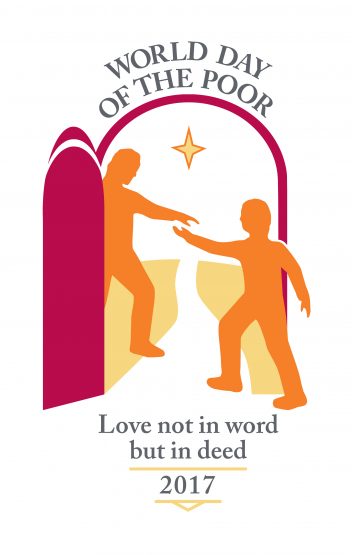
Nov 13, 2017 | Non categorizzato
 November 19 marks the first World Day of the Poor, which was announced by Pope Francis in order to focus attention, in a respectful and attentive way, on all those who are socially marginalized, excluded or discarded. It is also aimed for us all to choose a simpler lifestyle in response to our disposable and wasteful culture. “As long as Lazarus is at the door of our home,” the Pope said, “there can be no justice or social peace.” It is an invitation to work hard, especially during the week before the event, to create opportunities to meet, build friendship and solidarity, and offer tangible help. People are also being asked to invite the poor to participate in the Sunday Eucharist and later open their homes to them as privileged guests. The logo for the World Day of the Poor reflects its meaning, with two hands that extend toward each other, each offering something. They are two arms that express solidarity and invite the poor to come in and not stay at the door.
November 19 marks the first World Day of the Poor, which was announced by Pope Francis in order to focus attention, in a respectful and attentive way, on all those who are socially marginalized, excluded or discarded. It is also aimed for us all to choose a simpler lifestyle in response to our disposable and wasteful culture. “As long as Lazarus is at the door of our home,” the Pope said, “there can be no justice or social peace.” It is an invitation to work hard, especially during the week before the event, to create opportunities to meet, build friendship and solidarity, and offer tangible help. People are also being asked to invite the poor to participate in the Sunday Eucharist and later open their homes to them as privileged guests. The logo for the World Day of the Poor reflects its meaning, with two hands that extend toward each other, each offering something. They are two arms that express solidarity and invite the poor to come in and not stay at the door.
Nov 13, 2017 | Focolare Worldwide
Nov 12, 2017 | Non categorizzato
On 9 November, 2017, at the Vienna Cathedral – dedicated to St Stephen – hundreds of people gathered to pray for peace together with Cardinal Christoph Schönborn with an ecumenical group of ecclesiastical authorities. Members of the ecumenical network Together for Europe at the heart of the Austrian capital city, at the vigil of their annual Congress. They came from countries such as Portugal, Russia, England, and Greece. Their aim: unity and reconciliation among various Christian denominations and cultures, as well as solidarity and integration within Europe. See press release
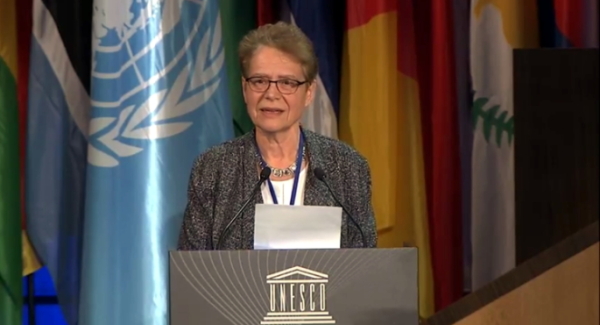
Nov 11, 2017 | Non categorizzato
 Within the framework of the 39th UNESCO General Conference, which at the end of two years reunited the Organisation’s 195 members last 4 November in Paris, Dr. Chantal Grevin, representative of New Humanity, presented some good practices against violent extremism. In her speech, Dr. Grevin evidenced the commitment of the Youth for a United World (juvenile section of New Humanity) and in particular the “United World Week” event during which the youths of New Humanity meet and exhibit the various actions aimed at promoting universal brotherhood. For some years now, such actions have been gathered in a specific dossier, already presented before various national UNESCO commissions. At the end, the New Humanity director acted as spokesman for the numerous International NGOs, the International Catholic Office for Infancy and the International Catholic Office for education, that have asked the UN to recognise the “United World Week” and other similar initiatives that aim to promote Art. 1 of the Universal Declaration of Human Rights as a common legacy for the building of a global citizenship. Read the entire article https://youtu.be/eWW_b4UEJDU
Within the framework of the 39th UNESCO General Conference, which at the end of two years reunited the Organisation’s 195 members last 4 November in Paris, Dr. Chantal Grevin, representative of New Humanity, presented some good practices against violent extremism. In her speech, Dr. Grevin evidenced the commitment of the Youth for a United World (juvenile section of New Humanity) and in particular the “United World Week” event during which the youths of New Humanity meet and exhibit the various actions aimed at promoting universal brotherhood. For some years now, such actions have been gathered in a specific dossier, already presented before various national UNESCO commissions. At the end, the New Humanity director acted as spokesman for the numerous International NGOs, the International Catholic Office for Infancy and the International Catholic Office for education, that have asked the UN to recognise the “United World Week” and other similar initiatives that aim to promote Art. 1 of the Universal Declaration of Human Rights as a common legacy for the building of a global citizenship. Read the entire article https://youtu.be/eWW_b4UEJDU
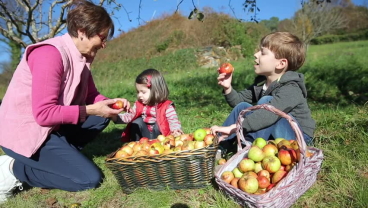
Nov 11, 2017 | Non categorizzato
 “The mystery of Providence that arrives in concrete terms in Christian life has always been unfathomable, because it has to do with the way God makes himself known to us that was revealed by Jesus: God’s Fatherhood. All of us have worries about material goods: fathers and mothers need to stretch their budget until the end of the month; directors of civil or religious organisations struggle to keep expenses within budget. Every day, turmoil and change occurs among peoples and nations seeking to find new economic alignments. Generally speaking, in terms of economics, the tough laws of competition are uppermost in people’s minds. We often hear that economics is like physics or mathematics. It runs in cycles and foreseeable processes that are necessary and determined. Some things can be forecast and there are inevitable disruptions and crises. Little can be changed, so the textbooks say. However, in one book we can instead find the true law governing economic life on earth, the law that Jesus proclaimed: “Strive first for the kingdom of God and his righteousness, and all these things will be given to you as well. (Mt 6:33) “There is no one who has left house or brothers or sisters or mother or father or children or fields, for my sake and for the sake of the good news, who will not receive a hundredfold now in this age” (Mk 10:29-30) In this law, we discover the mystery that occurs when the divine and human are joined. Economic laws certainly have value, but if we do not take into account the fact that Divine Providence exists, which also regulates economic factors, we will never understand why some great things happen. Heaven exists, as well as earth and Heaven has promised to intervene and help the little people on earth, if they look to Heaven. This is not a fairy-tale: it is the daily experience had by many Christian parents; it is the experience had by the Church and by the founders of Religious Orders and many apostles of practical charity. God intervenes in human affairs every time human beings want God to intervene, by adapting their lives to God’s life. All Christians can have this experience.” Pasquale Foresi – Parole di Vita [Words of Life] – Città Nuova, Roma, 1963 – pp.91-92
“The mystery of Providence that arrives in concrete terms in Christian life has always been unfathomable, because it has to do with the way God makes himself known to us that was revealed by Jesus: God’s Fatherhood. All of us have worries about material goods: fathers and mothers need to stretch their budget until the end of the month; directors of civil or religious organisations struggle to keep expenses within budget. Every day, turmoil and change occurs among peoples and nations seeking to find new economic alignments. Generally speaking, in terms of economics, the tough laws of competition are uppermost in people’s minds. We often hear that economics is like physics or mathematics. It runs in cycles and foreseeable processes that are necessary and determined. Some things can be forecast and there are inevitable disruptions and crises. Little can be changed, so the textbooks say. However, in one book we can instead find the true law governing economic life on earth, the law that Jesus proclaimed: “Strive first for the kingdom of God and his righteousness, and all these things will be given to you as well. (Mt 6:33) “There is no one who has left house or brothers or sisters or mother or father or children or fields, for my sake and for the sake of the good news, who will not receive a hundredfold now in this age” (Mk 10:29-30) In this law, we discover the mystery that occurs when the divine and human are joined. Economic laws certainly have value, but if we do not take into account the fact that Divine Providence exists, which also regulates economic factors, we will never understand why some great things happen. Heaven exists, as well as earth and Heaven has promised to intervene and help the little people on earth, if they look to Heaven. This is not a fairy-tale: it is the daily experience had by many Christian parents; it is the experience had by the Church and by the founders of Religious Orders and many apostles of practical charity. God intervenes in human affairs every time human beings want God to intervene, by adapting their lives to God’s life. All Christians can have this experience.” Pasquale Foresi – Parole di Vita [Words of Life] – Città Nuova, Roma, 1963 – pp.91-92
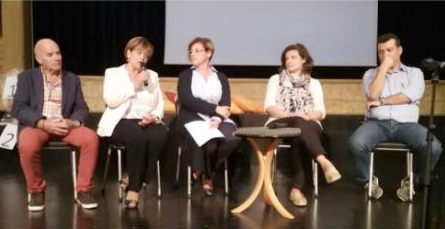
Nov 10, 2017 | Non categorizzato
 At the end of October, the Focolare Movement held a presentation day for the spirituality of unity and initiatives of the community in Greece, with testimonies of families, youths and a priest of the diocese of Athens. “The testimonials make our faith credible,” commented the Archbishop of Athens, Bishop Sebastianos Rossolatos who attended the event. “The Holy Spirit, through the centuries, has sent the charisms to renew the Church. Among these is also that of the Focolare.” An article was published in the Catholic Church’s national daily bulletin, and signed by the daily paper’s photographer, who attended a Focolare event for the first time: “It was a day for social issues concerning the future of our lives and the application of Christianity’s Golden Rule. For all, it was the start of a better lifestyle.”
At the end of October, the Focolare Movement held a presentation day for the spirituality of unity and initiatives of the community in Greece, with testimonies of families, youths and a priest of the diocese of Athens. “The testimonials make our faith credible,” commented the Archbishop of Athens, Bishop Sebastianos Rossolatos who attended the event. “The Holy Spirit, through the centuries, has sent the charisms to renew the Church. Among these is also that of the Focolare.” An article was published in the Catholic Church’s national daily bulletin, and signed by the daily paper’s photographer, who attended a Focolare event for the first time: “It was a day for social issues concerning the future of our lives and the application of Christianity’s Golden Rule. For all, it was the start of a better lifestyle.”
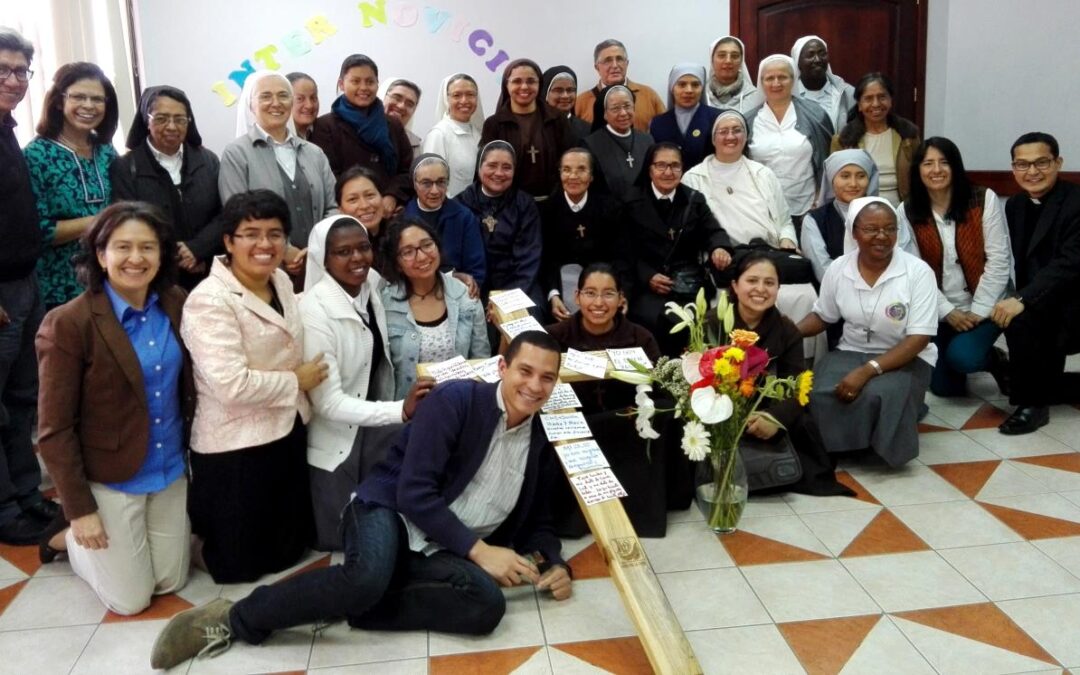
Nov 10, 2017 | Focolare Worldwide
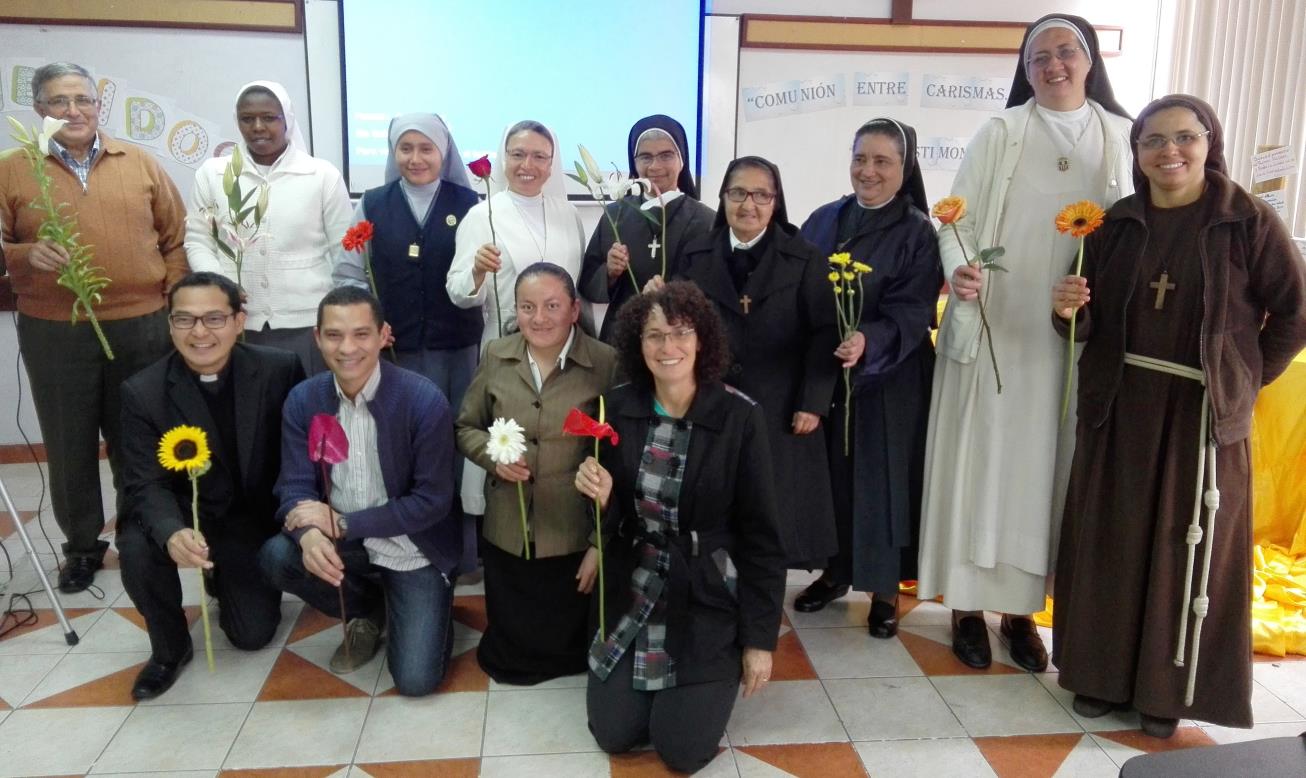 A magnificent garden of many flowers and colours – that is how the many farms appear in Ecuador that export their prized floral varieties worldwide. It is an image that Sr. Vanessa, a Franciscan youth missionary, used to introduce the spiritual retreat held 22 October in Quito, at the headquarters of the Ecuadorian Religious Conference. Sr. Vanessa had just recently finished a year at Casa Emmaus in Loppiano, the spirituality center for religious sisters who hope to go deeper into the Focolare charism. There in Ecuador she found no better example of the Church and its variety of charisms, with 27 consecrated sisters and one brother from 11 different congregations who had accepted the invitation. Utilizing a group dynamic, the young nun asked each participant to hang the word that each of the founders’ charisms was based on next to the crucifix there in the hall. This showed how the idea of each charism, brought about by the Spirit, is a new Christ unfolding throughout the centuries. Staying with her floral metaphor, each participant was given a flower that was different from the others, just as the charisms are different. They are different beauties that in communion, and in their common service of the Church, find themselves empowered and fulfilled.
A magnificent garden of many flowers and colours – that is how the many farms appear in Ecuador that export their prized floral varieties worldwide. It is an image that Sr. Vanessa, a Franciscan youth missionary, used to introduce the spiritual retreat held 22 October in Quito, at the headquarters of the Ecuadorian Religious Conference. Sr. Vanessa had just recently finished a year at Casa Emmaus in Loppiano, the spirituality center for religious sisters who hope to go deeper into the Focolare charism. There in Ecuador she found no better example of the Church and its variety of charisms, with 27 consecrated sisters and one brother from 11 different congregations who had accepted the invitation. Utilizing a group dynamic, the young nun asked each participant to hang the word that each of the founders’ charisms was based on next to the crucifix there in the hall. This showed how the idea of each charism, brought about by the Spirit, is a new Christ unfolding throughout the centuries. Staying with her floral metaphor, each participant was given a flower that was different from the others, just as the charisms are different. They are different beauties that in communion, and in their common service of the Church, find themselves empowered and fulfilled. 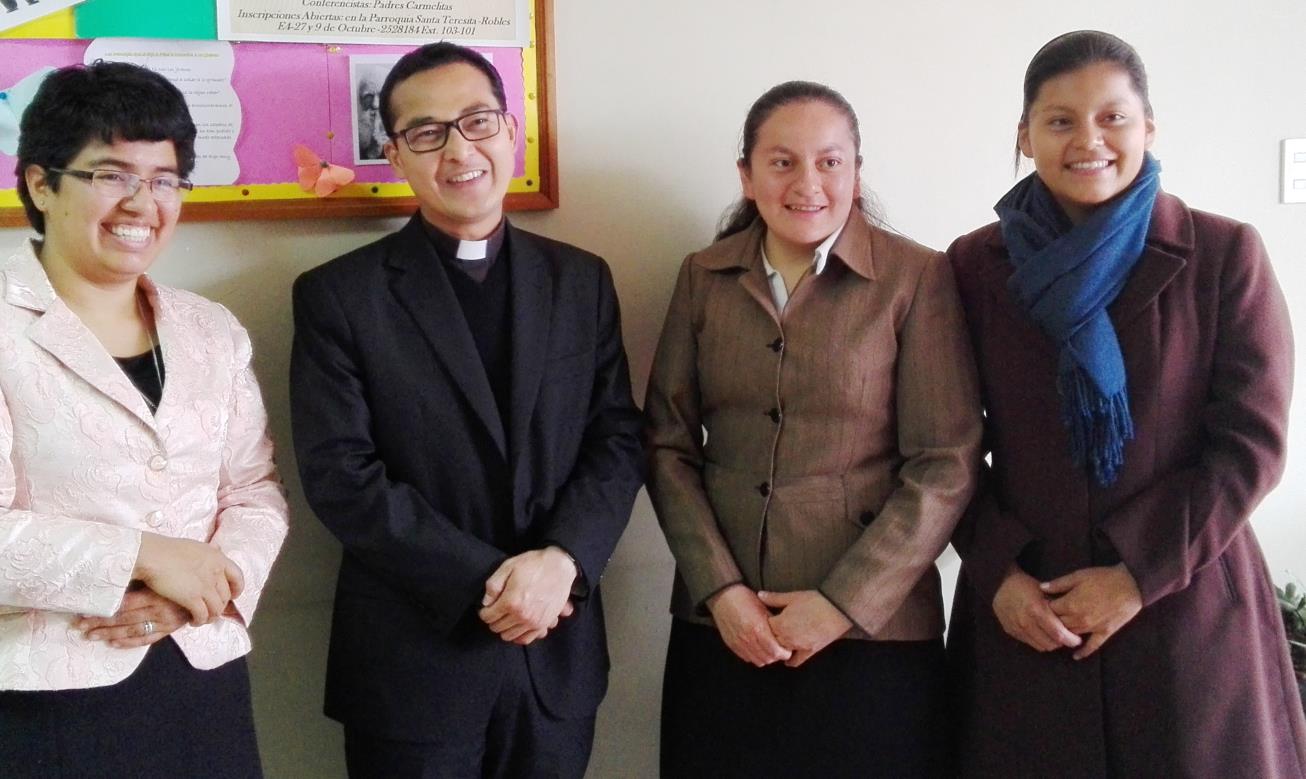 The program featured – in addition to talks that explored the value of communion between the new and ancient charisms in the Church and the truly different manner in which they developed or were nurtured – ample time for sharing. The Ecuadorian Religious Conference, in fact, had promoted the retreat with the title “Communion between charisms, a testimony of hope.” The occasion was the happy coincidence of the Mother Superior of the Little Servants of the Sacred Heart, Sr. Imelda Rizzato, visiting Ecuador. She has known about Focolare spirituality since her days in novitiate. She was able to share the impact that this spirituality had for her. Besides reinforcing her choice of vocation, it gave her a particular inclination to weave relationships of communion with those she met. In doing so, according to her superiors, she was living out the charism of her founder, Blessed Carlo Liviero, in an authentic way. In time the congregation gave her a number of responsibilities, to the point of asking her to be their highest guide. It is a role that she tries to carry out together with her sisters, with an openness and communion with other realities in the Church and other religious families. The goal is the “Church which goes forth” that the pope expects.
The program featured – in addition to talks that explored the value of communion between the new and ancient charisms in the Church and the truly different manner in which they developed or were nurtured – ample time for sharing. The Ecuadorian Religious Conference, in fact, had promoted the retreat with the title “Communion between charisms, a testimony of hope.” The occasion was the happy coincidence of the Mother Superior of the Little Servants of the Sacred Heart, Sr. Imelda Rizzato, visiting Ecuador. She has known about Focolare spirituality since her days in novitiate. She was able to share the impact that this spirituality had for her. Besides reinforcing her choice of vocation, it gave her a particular inclination to weave relationships of communion with those she met. In doing so, according to her superiors, she was living out the charism of her founder, Blessed Carlo Liviero, in an authentic way. In time the congregation gave her a number of responsibilities, to the point of asking her to be their highest guide. It is a role that she tries to carry out together with her sisters, with an openness and communion with other realities in the Church and other religious families. The goal is the “Church which goes forth” that the pope expects. 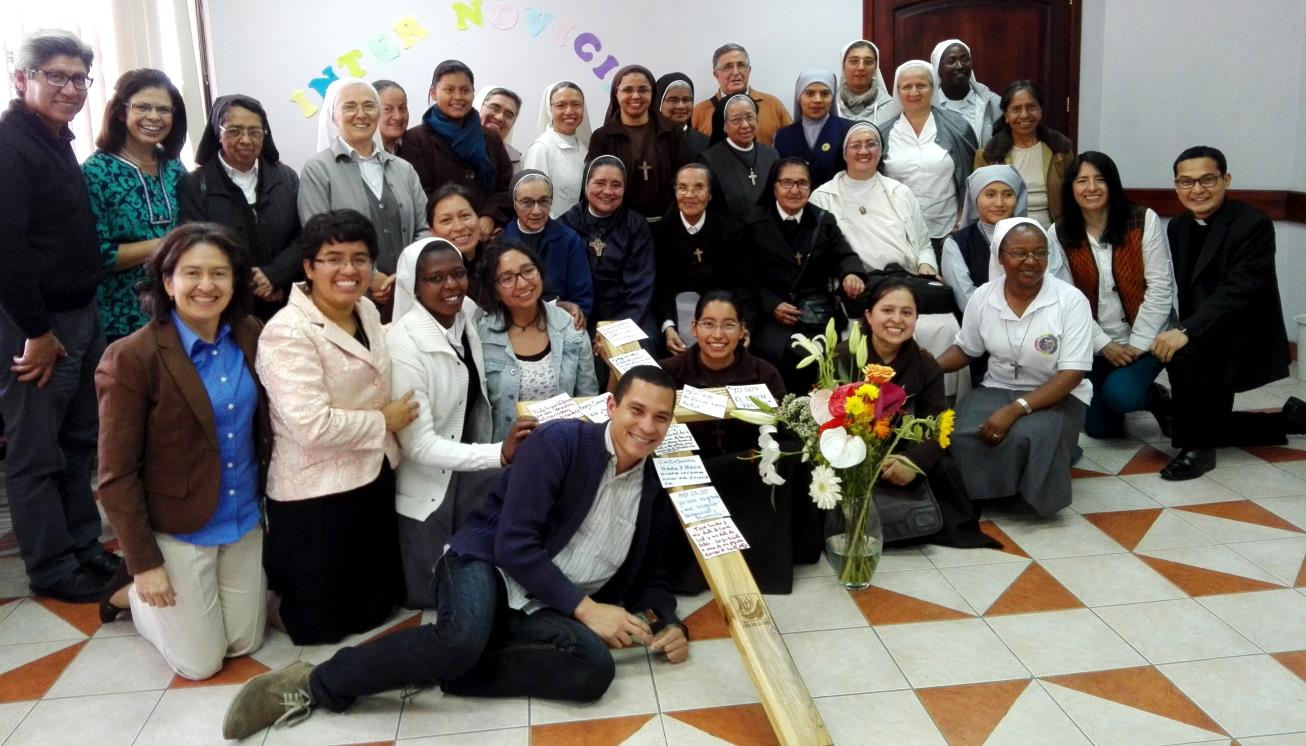 Sr Imelda and the other sisters who spoke were able to bear witness to how the charism of unity by no means conflicts with their individual charisms. On the contrary, it is a true help to accomplish what the Church expects of each charism, individually and in communion between them. News of the retreat even reached Apostolic Nunzio Monsignor Andrés Carrascosa, who not only allowed the sisters of the papal nunziature to participate, but sent his secretary to celebrate Mass. Staying for the entire meeting, the secretary said that it was a “true privilege to be there.” The day after the retreat some of the sisters wished to visit the Focolare center. They were putting down the foundations for their new path of unity between charisms in Ecuador, to open new horizons and give hope to the Church and the world.
Sr Imelda and the other sisters who spoke were able to bear witness to how the charism of unity by no means conflicts with their individual charisms. On the contrary, it is a true help to accomplish what the Church expects of each charism, individually and in communion between them. News of the retreat even reached Apostolic Nunzio Monsignor Andrés Carrascosa, who not only allowed the sisters of the papal nunziature to participate, but sent his secretary to celebrate Mass. Staying for the entire meeting, the secretary said that it was a “true privilege to be there.” The day after the retreat some of the sisters wished to visit the Focolare center. They were putting down the foundations for their new path of unity between charisms in Ecuador, to open new horizons and give hope to the Church and the world.
Nov 9, 2017 | Non categorizzato
On November 9, 28 years ago, the Government in East Germany declared the opening of the borders with the Federal Republic. To this announcement, tens of thousands of people in East Berlin descended on the streets armed with pick-axes, to demolish once and for all the wall dividing them from the West. The collapse of the wall was universally interpreted as the sign of a new era that had started. The East Berliners were greeted with huge jubilation by their brothers and sisters in the West, so much so that bars and cafes offered free beer for everyone! Less than a year later, on 3 October 1990, Germany was reunited definitively, thus becoming the Federal Republic of Germany. Today, the few features of what remained of the Berlin Wall have become the symbol of a historic era and a memorial to the 170 people who were killed in their desperate attempt to cross the border.
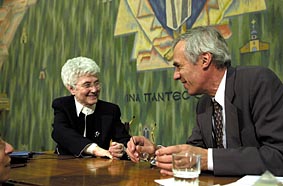
Nov 9, 2017 | Non categorizzato
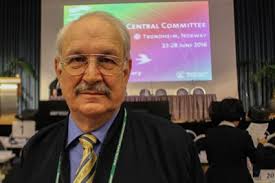
Georges “Yorgo” Lemopoulos

Geneva, October 2002: Chiara Lubich and Dr Konrad Raiser, who was then Secretary-General of WCC.
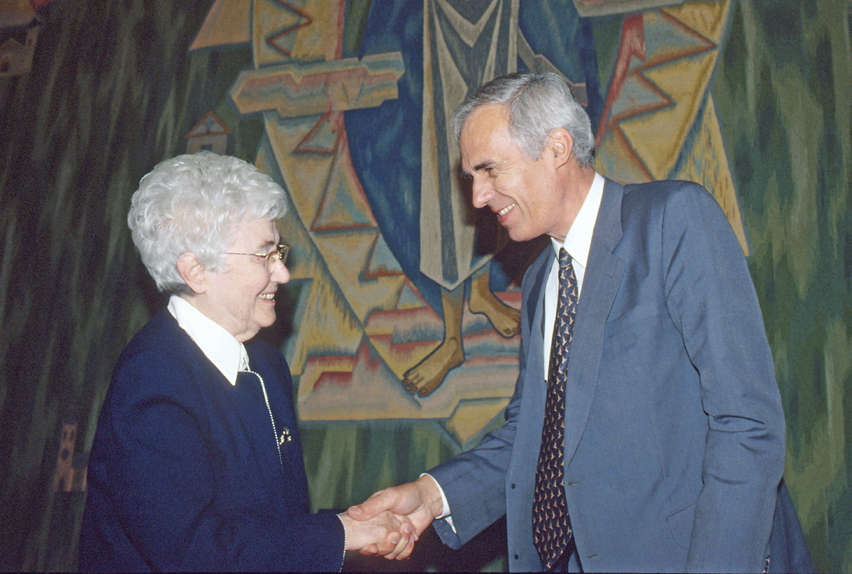
Nov 9, 2017 | Focolare Worldwide
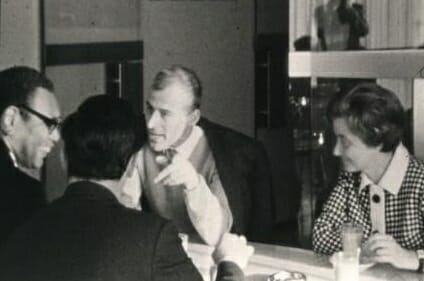
Geneva 1967: Chiara at the WCC with Philip Potter and Lukas Vischer

Geneva, October 2002: Chiara Lubich and Dr Konrad, then Secretary-General of WCC
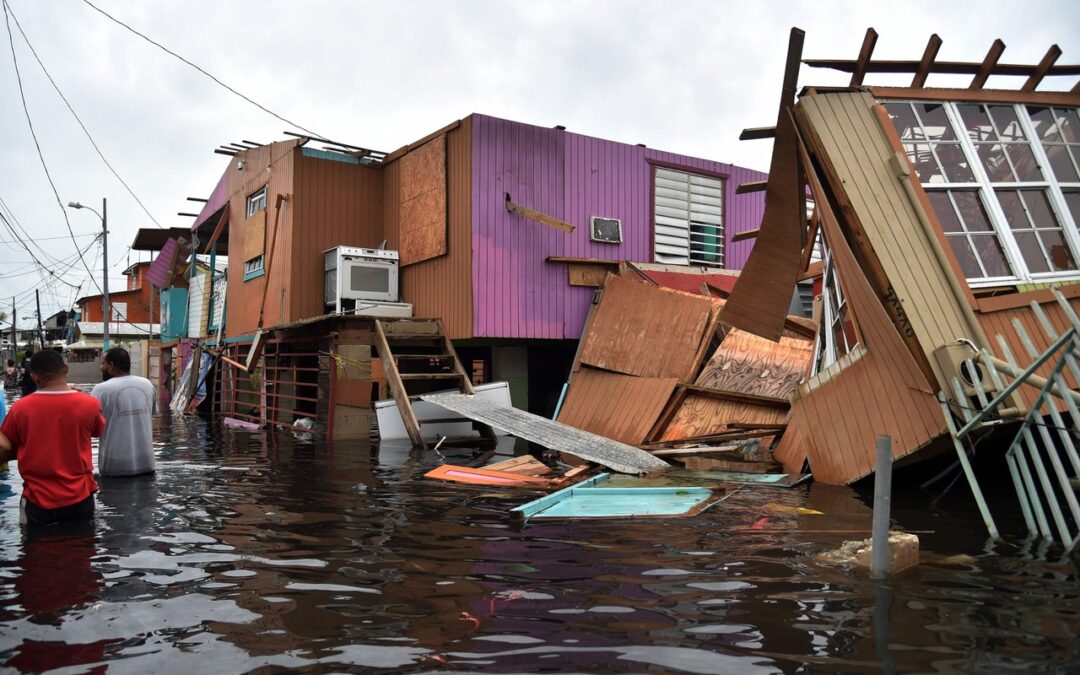
Nov 8, 2017 | Non categorizzato
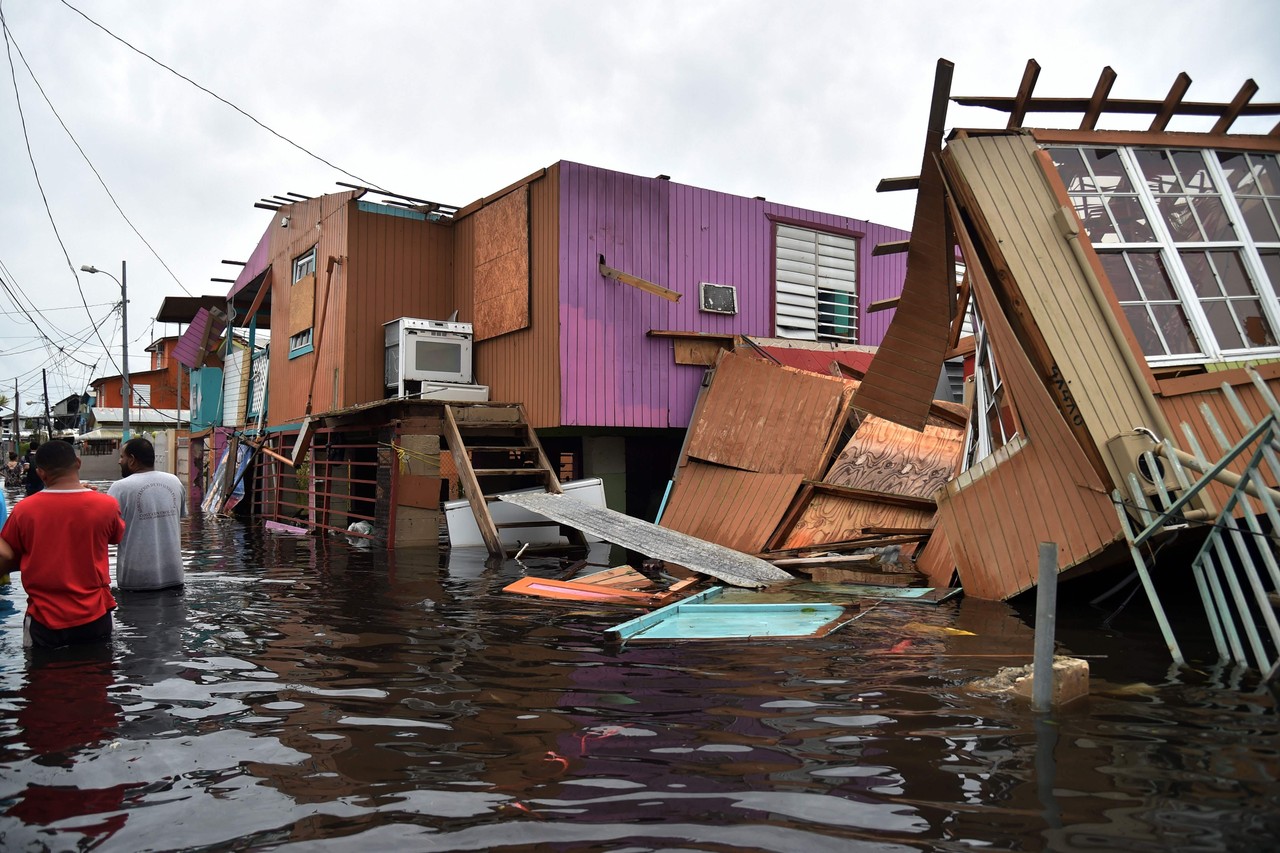 A month and a half has gone by since the passing of Hurricane Maria, which caused the death of ten people and the destruction of thousands of homes, with its 250 km winds and torrential rains. Puerto Rico hasn’t had such a wave of bad weather since 1928 when it was overwhelmed by a category 5 hurricane. From that day on, the island, with more than 3 million and a half inhabitants, suffers from a great problem with the water supply, food, medicine and electricity. The problems are not over, and it could provoke an exodus never witnessed before, further reducing the possibility of mid-term recovery. In the midst of these huge difficulties, the local Focolare community has also contributed its share, with collections of food and clothing to lift up the local population. “Some of us had some physical damages,” they write “especially in one family that lost everything, managing to salvage on a few small objects from the fury of the hurricane. At the moment they are in a small apartment that was placed at their service, but the entire community is conducting a communion of good to support them. The reconstruction of the area will be slow, but we have faith in God and have placed ourselves in His hands.” There have been many experiences with neighbours and people in difficulty. “Yesterday, for the second time, a well-dressed woman was walking down my street in a confused, aimless state. She was obviously lost. I followed her, without letting her out of my sight, until she was met by another person who had been looking for her. She explained to me that the woman suffered from Alzheimer’s and had come out of the institution she was staying in, because the back door had been opened by the hurricane, the electrical generator wasn’t working and it was just too hot. When I got back home I spoke with a friend who distributes benzene. He promised me that he would take some to them. Other people I contacted went to repair the door. Now the door is secure again.” “Yesterday I got in line early, at five o’clock in the morning, to buy some petrol. I saw a bus in the rear-view mirror of my car. It was a long wait, so I was able watch the scene. In the driver’s seat, a very angry man who continued to curse and swear. Next to him, a woman, perhaps his wife. An awful smell of tobacco smoke was pouring out of the driver’s window. The line was moving slowly in front of me – around twenty cars. As if that wasn’t enough, the news began to spread that the gas station would open only at eight and not six as I had thought. As I waited, the woman approached me and asked if I would help her to move the bus, because her husband had left and her feet didn’t reach the pedals. At first I refused, with the excuse that I wasn’t able to drive a bus. But the real reason was something else: I really didn’t like the way that man was acting. I realized I had to change my attitude and welcome her request as if Jesus himself had made it. When the driver returned, I explained that I was the one who moved his bus at the request of his wife. He began to let it all out, describing all his problems to me, for the next three hours. By the time we were finished filling up on gas, he was a completely different person, We shook hands. I had managed to overcome my prejudice.” “The street I live on was completely blocked with debris and uprooted trees. The majority of my neighbours are old and in frail physical health. I began wondering what would happen if there were need of an ambulance. I began to saw tree trunks and move them off the road. In the end, we had lunch together with whatever anyone had to share.” “We wanted to share water and food provisions with neighbours. Our own reserves dwindled, but the rapport among us intensified”
A month and a half has gone by since the passing of Hurricane Maria, which caused the death of ten people and the destruction of thousands of homes, with its 250 km winds and torrential rains. Puerto Rico hasn’t had such a wave of bad weather since 1928 when it was overwhelmed by a category 5 hurricane. From that day on, the island, with more than 3 million and a half inhabitants, suffers from a great problem with the water supply, food, medicine and electricity. The problems are not over, and it could provoke an exodus never witnessed before, further reducing the possibility of mid-term recovery. In the midst of these huge difficulties, the local Focolare community has also contributed its share, with collections of food and clothing to lift up the local population. “Some of us had some physical damages,” they write “especially in one family that lost everything, managing to salvage on a few small objects from the fury of the hurricane. At the moment they are in a small apartment that was placed at their service, but the entire community is conducting a communion of good to support them. The reconstruction of the area will be slow, but we have faith in God and have placed ourselves in His hands.” There have been many experiences with neighbours and people in difficulty. “Yesterday, for the second time, a well-dressed woman was walking down my street in a confused, aimless state. She was obviously lost. I followed her, without letting her out of my sight, until she was met by another person who had been looking for her. She explained to me that the woman suffered from Alzheimer’s and had come out of the institution she was staying in, because the back door had been opened by the hurricane, the electrical generator wasn’t working and it was just too hot. When I got back home I spoke with a friend who distributes benzene. He promised me that he would take some to them. Other people I contacted went to repair the door. Now the door is secure again.” “Yesterday I got in line early, at five o’clock in the morning, to buy some petrol. I saw a bus in the rear-view mirror of my car. It was a long wait, so I was able watch the scene. In the driver’s seat, a very angry man who continued to curse and swear. Next to him, a woman, perhaps his wife. An awful smell of tobacco smoke was pouring out of the driver’s window. The line was moving slowly in front of me – around twenty cars. As if that wasn’t enough, the news began to spread that the gas station would open only at eight and not six as I had thought. As I waited, the woman approached me and asked if I would help her to move the bus, because her husband had left and her feet didn’t reach the pedals. At first I refused, with the excuse that I wasn’t able to drive a bus. But the real reason was something else: I really didn’t like the way that man was acting. I realized I had to change my attitude and welcome her request as if Jesus himself had made it. When the driver returned, I explained that I was the one who moved his bus at the request of his wife. He began to let it all out, describing all his problems to me, for the next three hours. By the time we were finished filling up on gas, he was a completely different person, We shook hands. I had managed to overcome my prejudice.” “The street I live on was completely blocked with debris and uprooted trees. The majority of my neighbours are old and in frail physical health. I began wondering what would happen if there were need of an ambulance. I began to saw tree trunks and move them off the road. In the end, we had lunch together with whatever anyone had to share.” “We wanted to share water and food provisions with neighbours. Our own reserves dwindled, but the rapport among us intensified”
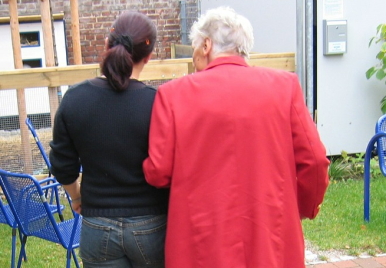
Nov 7, 2017 | Non categorizzato
 A friend falls ill Our friend Lia, who still has teenage children, was diagnosed with a malignant tumour. The whole community banded together around her with a prayer chain and gestures of solidarity. Once a week we got together at church for an hour of adoration and to ask the gift of healing for her. We tried to understand how to lighten those difficult days. We took on a number of tasks: someone made food, carefully choosing the appropriate ingredients for her; someone else put money in common to pay for medicine. These were small actions that helped her not to feel alone, but part of a community. When her health permitted, she would tell of her experience at community meetings. After a round of chemotherapy, any trace of the tumour had disappeared. For us it was an answer to our prayers and our commitment to love and serve her in a privileged way. (C.V., Brazil) Despite the wrongs done After my husband died I had to put up with tiresome humiliations from his relatives, who wanted me out of the room we had always lived in. One brother-in-law in particular, despite being the godfather of one of our four children, started making quite a few problems. Suddenly this brother-in-law got sick. Each time he fell ill, I ran to buy him medicine to ease the pain and brought it to him. My neighbours asked, “Why are you doing this, after everything you went through?” I responded that for me, to love means to put myself at the service of others. A few days later my brother-in-law died, and I stayed there and comforted his wife, helping her with all the things that her husband used to take care of. She later thanked me publicly. Now she lives with us and we are truly one family. (R.P., India) The mushroom expert As I was walking through the woods gathering mushrooms, I came upon a man lying on the ground. I went to him and helped him get back up. He was trembling. He pointed toward where he lived – a rusted out container among the trees. I tried to get him to lie down on some kind of bed. I later went back a number of times to see him, bringing him food and medicine. He was a great expert on mushrooms and made a living selling them. In the time we shared, he taught me where to find the best ones and how to dig them up. He started to tell me about his life, business failures and abandonment. One day I found him with a high fever, and I brought him in. He was in serious condition. He told me: “By now you know all about me, but the most important thing is that I always had faith in God. To have met you was a sign from him.” He then told me he had money hidden and gave me the task of getting it and giving it to someone who needed it. Now, each time I go gathering mushrooms, I think of him like a guiding angel. (R.S. Poland)
A friend falls ill Our friend Lia, who still has teenage children, was diagnosed with a malignant tumour. The whole community banded together around her with a prayer chain and gestures of solidarity. Once a week we got together at church for an hour of adoration and to ask the gift of healing for her. We tried to understand how to lighten those difficult days. We took on a number of tasks: someone made food, carefully choosing the appropriate ingredients for her; someone else put money in common to pay for medicine. These were small actions that helped her not to feel alone, but part of a community. When her health permitted, she would tell of her experience at community meetings. After a round of chemotherapy, any trace of the tumour had disappeared. For us it was an answer to our prayers and our commitment to love and serve her in a privileged way. (C.V., Brazil) Despite the wrongs done After my husband died I had to put up with tiresome humiliations from his relatives, who wanted me out of the room we had always lived in. One brother-in-law in particular, despite being the godfather of one of our four children, started making quite a few problems. Suddenly this brother-in-law got sick. Each time he fell ill, I ran to buy him medicine to ease the pain and brought it to him. My neighbours asked, “Why are you doing this, after everything you went through?” I responded that for me, to love means to put myself at the service of others. A few days later my brother-in-law died, and I stayed there and comforted his wife, helping her with all the things that her husband used to take care of. She later thanked me publicly. Now she lives with us and we are truly one family. (R.P., India) The mushroom expert As I was walking through the woods gathering mushrooms, I came upon a man lying on the ground. I went to him and helped him get back up. He was trembling. He pointed toward where he lived – a rusted out container among the trees. I tried to get him to lie down on some kind of bed. I later went back a number of times to see him, bringing him food and medicine. He was a great expert on mushrooms and made a living selling them. In the time we shared, he taught me where to find the best ones and how to dig them up. He started to tell me about his life, business failures and abandonment. One day I found him with a high fever, and I brought him in. He was in serious condition. He told me: “By now you know all about me, but the most important thing is that I always had faith in God. To have met you was a sign from him.” He then told me he had money hidden and gave me the task of getting it and giving it to someone who needed it. Now, each time I go gathering mushrooms, I think of him like a guiding angel. (R.S. Poland)
Nov 6, 2017 | Focolare Worldwide
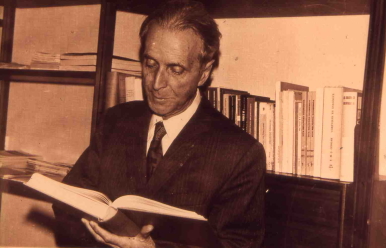
Nov 4, 2017 | Non categorizzato
 Just as war is ignorance, instinct and darkness, peace is science, civilization and light. Expecting – as we did – to have a better society from carnage, good from evil, black from white, is the same as expecting a better education for the heads it severs. Science, which was meant to devise exciting tools, will make the next war an exquisite case of refined, methodological stupidity. Fear is the great regulator of human relationships. Stimulated by fear, drained and exhausted lands keep disproportionately large and costly armies standing. There would be a solution: to substitute fear with mutual trust, indifference with friendship. But the solution would be too . . . easy; that is why it is so difficult. And it would bankrupt various oligarchies. I would have a good solution for the impulsive and powerful youngsters, deputies and public figures, improvised journalists and bank rats, for the tatsteless little misses to the spinsters on the committees, for speculators both high and low, for the generals and the professors, for the supporters of war – I would leave them in one of the trenches for ten minutes under a debilitating bombing, as all reason is lost and all nature rebells. When they come out of that, they’ll understand what war is – and they’ll curse it. This honoured society of ministers, deputies and journalists who presume to explain the significance of war to the rest of us, should understand once and for all that all their discourse turns our stomachs. We want peace and serenity, and we want the violence that they would unleash to be gone. Is that asking too much? Igino Giordani, from Rivolta Cattolica (Rome: Edizioni Gobettiane, 2016), 10-13.
Just as war is ignorance, instinct and darkness, peace is science, civilization and light. Expecting – as we did – to have a better society from carnage, good from evil, black from white, is the same as expecting a better education for the heads it severs. Science, which was meant to devise exciting tools, will make the next war an exquisite case of refined, methodological stupidity. Fear is the great regulator of human relationships. Stimulated by fear, drained and exhausted lands keep disproportionately large and costly armies standing. There would be a solution: to substitute fear with mutual trust, indifference with friendship. But the solution would be too . . . easy; that is why it is so difficult. And it would bankrupt various oligarchies. I would have a good solution for the impulsive and powerful youngsters, deputies and public figures, improvised journalists and bank rats, for the tatsteless little misses to the spinsters on the committees, for speculators both high and low, for the generals and the professors, for the supporters of war – I would leave them in one of the trenches for ten minutes under a debilitating bombing, as all reason is lost and all nature rebells. When they come out of that, they’ll understand what war is – and they’ll curse it. This honoured society of ministers, deputies and journalists who presume to explain the significance of war to the rest of us, should understand once and for all that all their discourse turns our stomachs. We want peace and serenity, and we want the violence that they would unleash to be gone. Is that asking too much? Igino Giordani, from Rivolta Cattolica (Rome: Edizioni Gobettiane, 2016), 10-13.
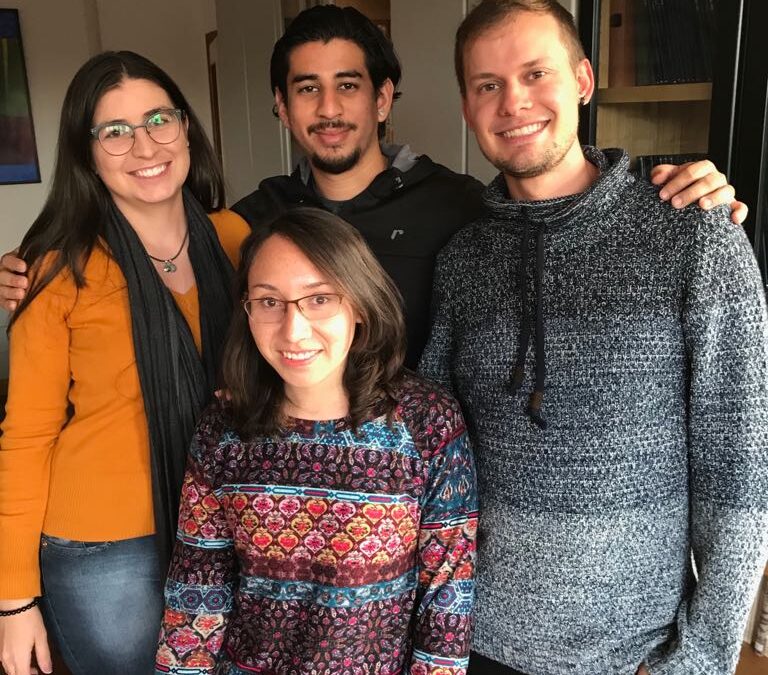
Nov 4, 2017 | Non categorizzato
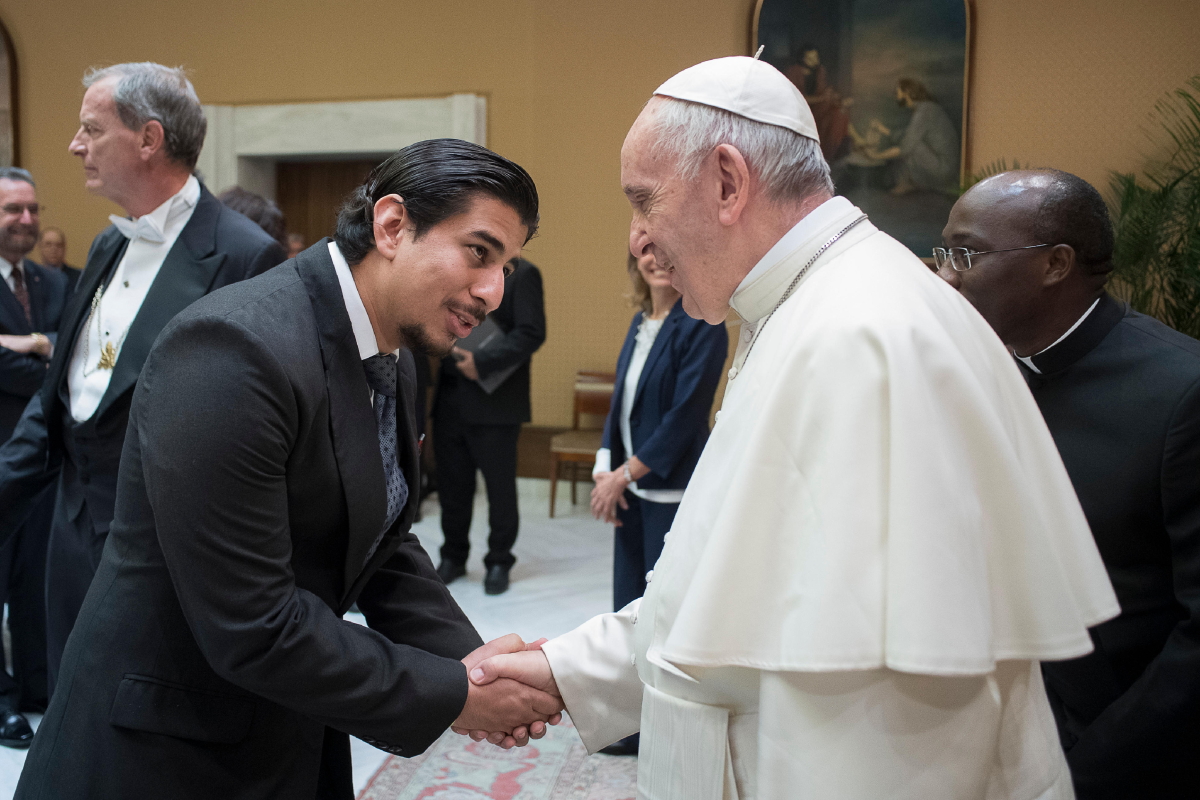
Nelson from El Salvador greets Pope Francis. Photo credit: © Osservatore Romano
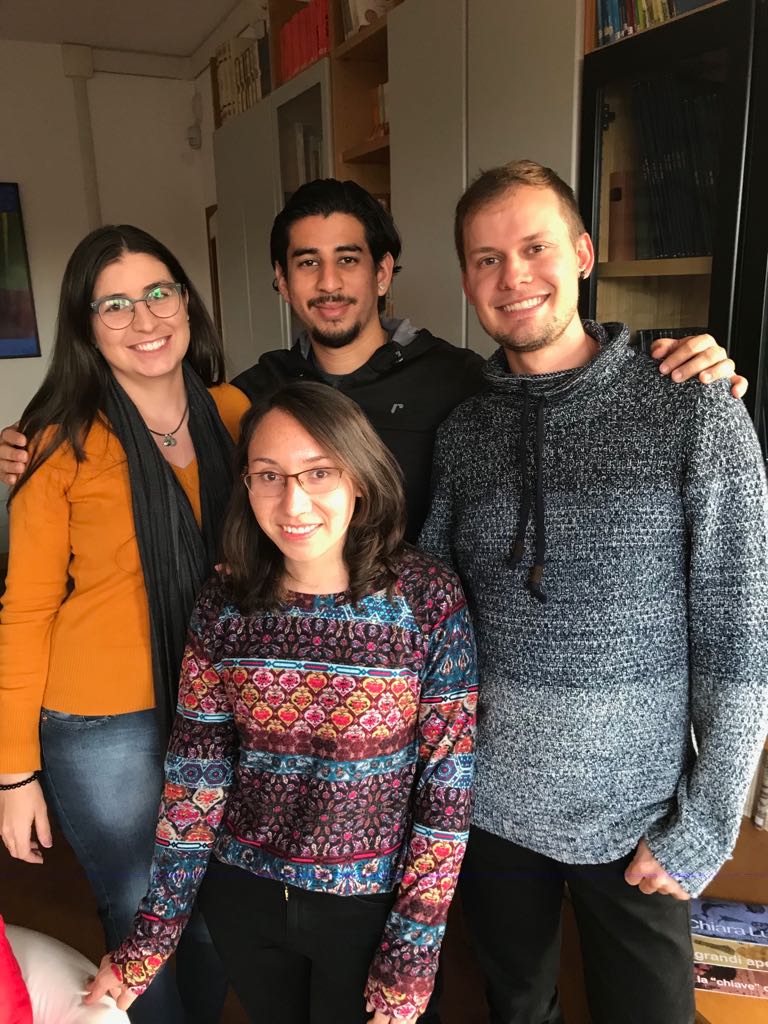 “We had the opportunity to build a rapport with many of the leaders attending. They were interested and asked us many questions. Two of them told us about projects that they hope to accomplish. “Raissa and I,” says Nelson, “were busy translating for a Brazilian cardinal into Portuguese. We rejoiced when they said they hoped that young people would also attend the next meetings, which was in sync with what the pope had said about the upcoming Youth Synod in October 2018. “For us it was really great to see that Religions for Peace is not really about the different faiths facing off, but a place to cooperate in favor of peace and saving the environment. To work for peace means to work for the planet: often wars are caused by inequality and poverty and produce ecological disasters. “In her address, Focolare President Maria Voce announced that Genfest 2018, ‘Beyond all borders,’ would take place in Manila. ‘Ten thousand young people will gather from all latitudes, ethnicities, cultures, religions – motivated by the idea of building a united world.’ “To see these important religious leaders together seemed like we were already participating as observers at a tiny Genfest where people work for peace and unity. “We went to carry out a service, but we didn’t expect to receive such a great gift: to greet the pope and receive, in the name of all the Gen and young people of the Focolare, such encouragement from him: ‘Adelante!’”
“We had the opportunity to build a rapport with many of the leaders attending. They were interested and asked us many questions. Two of them told us about projects that they hope to accomplish. “Raissa and I,” says Nelson, “were busy translating for a Brazilian cardinal into Portuguese. We rejoiced when they said they hoped that young people would also attend the next meetings, which was in sync with what the pope had said about the upcoming Youth Synod in October 2018. “For us it was really great to see that Religions for Peace is not really about the different faiths facing off, but a place to cooperate in favor of peace and saving the environment. To work for peace means to work for the planet: often wars are caused by inequality and poverty and produce ecological disasters. “In her address, Focolare President Maria Voce announced that Genfest 2018, ‘Beyond all borders,’ would take place in Manila. ‘Ten thousand young people will gather from all latitudes, ethnicities, cultures, religions – motivated by the idea of building a united world.’ “To see these important religious leaders together seemed like we were already participating as observers at a tiny Genfest where people work for peace and unity. “We went to carry out a service, but we didn’t expect to receive such a great gift: to greet the pope and receive, in the name of all the Gen and young people of the Focolare, such encouragement from him: ‘Adelante!’”
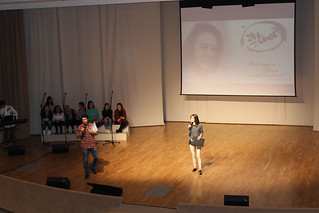
Nov 3, 2017 | Non categorizzato
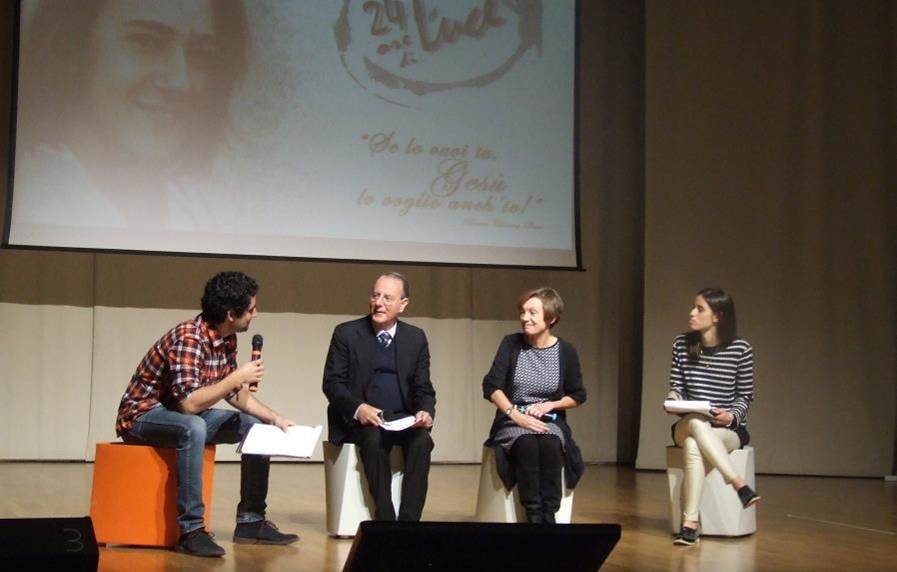 What could be so special about a teenager, and why does her life continue to illuminate anyone who comes across her even for one moment? One very lively and international group tells us. They were in Loppiano, Italy, for the 24 Hours of Light event that took place from noon on Saturday, October 28 until noon on Sunday, October 29th. It was an experience of fraternity that left them all marked by their encounter with God. It was the experience of Chiara Luce Badano. She was only 18 years old when, stricken with an incurable form of cancer, she bore witness until her final breath to the fullness of joy that can only be had in God-Love and giving oneself to others. She was declared Blessed on September 25, 2010. Many events were held around the world during this month when her liturgical feast occurs, all of them highlighting the exemplarity of her life. “A ray of very brilliant light has illuminated us too,” say the young people who were at Loppiano for the event, “and it continues to illuminate many others. With Chiara Luce, keeping our eyes on Jesus Crucified and Forsaken, we’ll be able not to shake in front of any kind of situation. On the contrary, we’ll become rays of light right where we are, helping to guide our human family towards universal brotherhood.”
What could be so special about a teenager, and why does her life continue to illuminate anyone who comes across her even for one moment? One very lively and international group tells us. They were in Loppiano, Italy, for the 24 Hours of Light event that took place from noon on Saturday, October 28 until noon on Sunday, October 29th. It was an experience of fraternity that left them all marked by their encounter with God. It was the experience of Chiara Luce Badano. She was only 18 years old when, stricken with an incurable form of cancer, she bore witness until her final breath to the fullness of joy that can only be had in God-Love and giving oneself to others. She was declared Blessed on September 25, 2010. Many events were held around the world during this month when her liturgical feast occurs, all of them highlighting the exemplarity of her life. “A ray of very brilliant light has illuminated us too,” say the young people who were at Loppiano for the event, “and it continues to illuminate many others. With Chiara Luce, keeping our eyes on Jesus Crucified and Forsaken, we’ll be able not to shake in front of any kind of situation. On the contrary, we’ll become rays of light right where we are, helping to guide our human family towards universal brotherhood.” 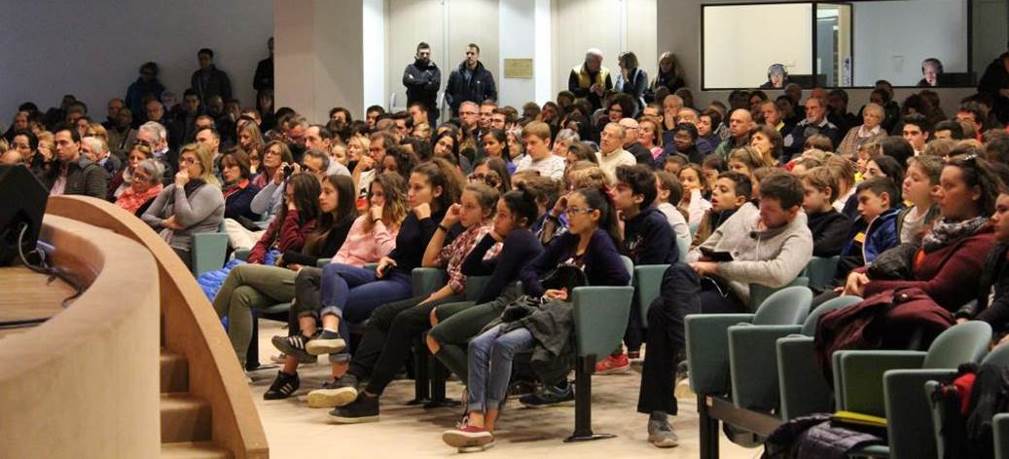 The program included songs, recitations, dances, real life experiences along with a bit of the thoughtlessness that is typical of teenagers, and the drive that is typical of people who have come to the realization that they have only one life. They’ve taken Chiara Lubich’s words to heart. Chiara was always quite frank with young people: “Living for something so-so would be too skimpy for a young person. It would be better to live for something great. So, live for Love. Sow love in every corner, so that an invasion of love will really take place and the civilization of love that we’re all waiting for will come true thanks also to you.” On the evening of the first day, as the glittering stars and the sparkles of a bonfire seemed to touch, a crowd of young people jammed into a hall that was being named after Chiara Luce. The image of the Blessed Chiara Luce, after its unveiling, seemed to spur the young people to want to become “light”, to form new and different constellations here on earth, living constellations made of people who love one another.
The program included songs, recitations, dances, real life experiences along with a bit of the thoughtlessness that is typical of teenagers, and the drive that is typical of people who have come to the realization that they have only one life. They’ve taken Chiara Lubich’s words to heart. Chiara was always quite frank with young people: “Living for something so-so would be too skimpy for a young person. It would be better to live for something great. So, live for Love. Sow love in every corner, so that an invasion of love will really take place and the civilization of love that we’re all waiting for will come true thanks also to you.” On the evening of the first day, as the glittering stars and the sparkles of a bonfire seemed to touch, a crowd of young people jammed into a hall that was being named after Chiara Luce. The image of the Blessed Chiara Luce, after its unveiling, seemed to spur the young people to want to become “light”, to form new and different constellations here on earth, living constellations made of people who love one another. 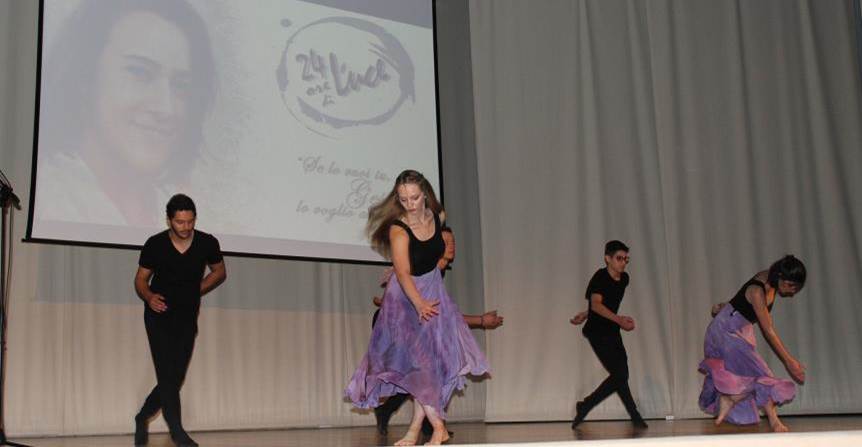 On the morning of Sunday, October 29th, Loppiano’s main auditorium was packed with young people. Thanks to a live streaming, Chiara Luce’s message ran thousands of kilometres, all the way to one group in Nepal. The final Mass was celebrated at the Shrine of Mary the Theotokos, which wasn’t able to hold the entire crowd that was celebrating the young Blessed who has been proposed as example for the upcoming Synod of Young People in 2018. “What are we left with after these 24 hours? Love, fullness, light, security, trust that life can change. But also the need for teamwork, sacrifice, unity at the expense of our pride. Chiara Luce often said: Anyone who loves is not little. Indeed, her greatness was clearly manifested when she even said yes to the pain of the illness. She found Jesus in that pain, someone who was like her, a man on a cross who cried out His abandonment. Looking at His example we’ll be able to become a ray of light too, ready to risk the darkness in which the world is immersed.” Source: Loppiano online: http://www.loppiano.it/ Photo gallery on Flickr
On the morning of Sunday, October 29th, Loppiano’s main auditorium was packed with young people. Thanks to a live streaming, Chiara Luce’s message ran thousands of kilometres, all the way to one group in Nepal. The final Mass was celebrated at the Shrine of Mary the Theotokos, which wasn’t able to hold the entire crowd that was celebrating the young Blessed who has been proposed as example for the upcoming Synod of Young People in 2018. “What are we left with after these 24 hours? Love, fullness, light, security, trust that life can change. But also the need for teamwork, sacrifice, unity at the expense of our pride. Chiara Luce often said: Anyone who loves is not little. Indeed, her greatness was clearly manifested when she even said yes to the pain of the illness. She found Jesus in that pain, someone who was like her, a man on a cross who cried out His abandonment. Looking at His example we’ll be able to become a ray of light too, ready to risk the darkness in which the world is immersed.” Source: Loppiano online: http://www.loppiano.it/ Photo gallery on Flickr 
https://www.youtube.com/watch?v=1XbJVCElU_o&feature=youtu.be
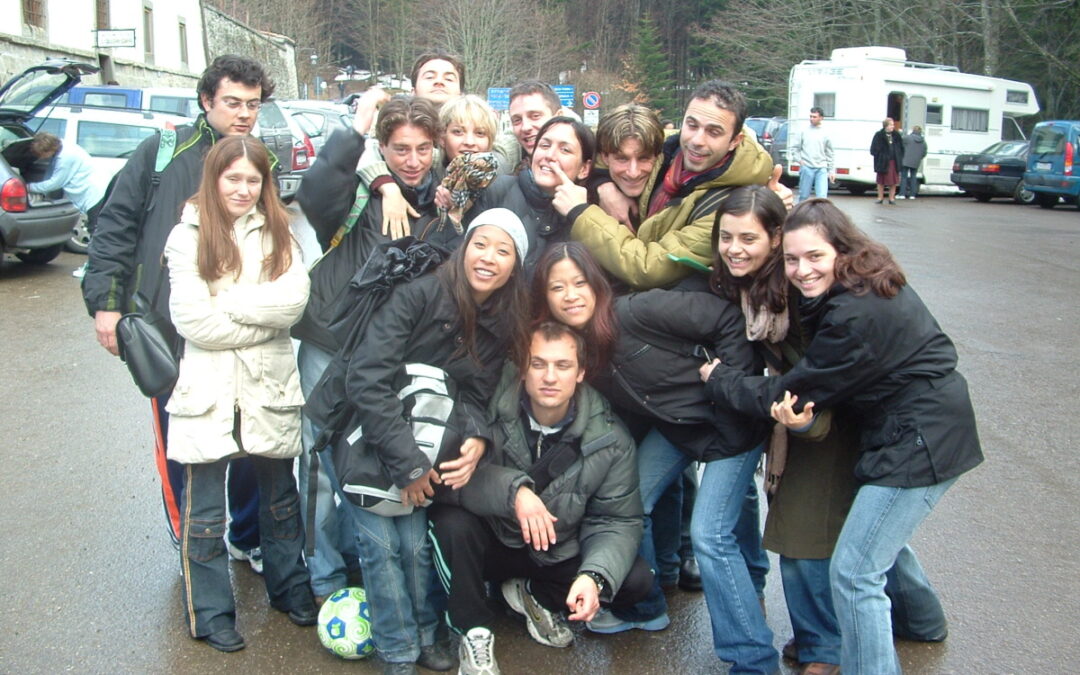
Nov 2, 2017 | Non categorizzato
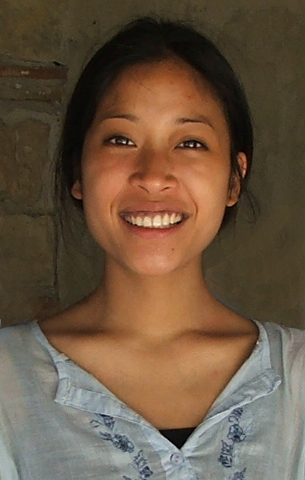 Hers is a moving story. It began when her parents, who were still quite young, swam across the Mekong river, fleeing the regime in their country, Laos, to reach Thailand. Eventually, after enormous challenges, they landed in Italy and were welcomed by a family they hadn’t ever met who live in Loppiano, the Focolare’s international community. And it was right there at the house of Raffaella and Roberto Cardinali that Sengsoury (which means “ray of light” in Laotian) and her twin sister Sourinia came into the world on September 12, 1979. Ever since she was small, “Senny” showed a special fondness for the Gospel spirit of unity and love that fuels Loppiano. When she was 9 she asked to be baptized, choosing the name Francesca. Becoming involved enthusiastically in the Gen Movement, when she became a teen she was on the front line with Sourinia preparing Supercongress 1997. When she was 23 she achieved her dream of spending the entire year at Mariapolis Lia, the Focolare’s Argentinian little city, where young people head to from all over the world. It was an experience that brought her to a more radical choice of God, and to choose a love that was more practical and polished than ever for those she met. Sengsoury loved to write poetry and lyrics that she sang together with her sister, accompanying her beautiful voice with guitar. She enrolled in beauty school in Florence. Those who know her describe her as a girl who was fascinating because of her perceptiveness, natural grace and radiant eyes. Yet she was also a person whose determination to follow Jesus could floor you. She and her boyfriend Marco became close and began to make plans for the future. In 2004, when she was 25, a sudden, serious autoimmune disease changed her life. Four years later she dictated a letter to a friend for Chiara Lubich where she described her situation: “I have a rare disease that has made it difficult for me to get around, to use language. There’s a lot of pain – sometimes shooting pain – in my bones and muscles. “These last few years, thanks to the support of my ‘grandparents’ Raffaella and Roberto, from Focolare young people and from many from the movement, I tried to transform these moments of pain into ‘drops of love’ for Jesus, including the long stretches in the hospital, tests and medicines. “At Christmas I checked in to a facility near Florence for therapy. However, bronchitis forced me to return to the hospital. I suffered a lot, and not just physically. I asked myself why it was me in this situation. I am the youngest in the ward, I have to be fed by tube and wear an oxygen mask. I have seen many of my dreams shattered: getting married, a career, travel, guitar, singing. “Sometimes I feel that Jesus is so far away. I turn to Mary, but she too is not close to me. Yet answer always comes: from a reflection, a spiritual writing, or a word from those who come to visit me. Peace returns, and with it the strength to say ‘for you Jesus; in every situation, like a sleepless night because of the pain. I don’t want to give up, and I ask Jesus to help me make it and to fulfil God’s design for me. I want so much to become a saint!”
Hers is a moving story. It began when her parents, who were still quite young, swam across the Mekong river, fleeing the regime in their country, Laos, to reach Thailand. Eventually, after enormous challenges, they landed in Italy and were welcomed by a family they hadn’t ever met who live in Loppiano, the Focolare’s international community. And it was right there at the house of Raffaella and Roberto Cardinali that Sengsoury (which means “ray of light” in Laotian) and her twin sister Sourinia came into the world on September 12, 1979. Ever since she was small, “Senny” showed a special fondness for the Gospel spirit of unity and love that fuels Loppiano. When she was 9 she asked to be baptized, choosing the name Francesca. Becoming involved enthusiastically in the Gen Movement, when she became a teen she was on the front line with Sourinia preparing Supercongress 1997. When she was 23 she achieved her dream of spending the entire year at Mariapolis Lia, the Focolare’s Argentinian little city, where young people head to from all over the world. It was an experience that brought her to a more radical choice of God, and to choose a love that was more practical and polished than ever for those she met. Sengsoury loved to write poetry and lyrics that she sang together with her sister, accompanying her beautiful voice with guitar. She enrolled in beauty school in Florence. Those who know her describe her as a girl who was fascinating because of her perceptiveness, natural grace and radiant eyes. Yet she was also a person whose determination to follow Jesus could floor you. She and her boyfriend Marco became close and began to make plans for the future. In 2004, when she was 25, a sudden, serious autoimmune disease changed her life. Four years later she dictated a letter to a friend for Chiara Lubich where she described her situation: “I have a rare disease that has made it difficult for me to get around, to use language. There’s a lot of pain – sometimes shooting pain – in my bones and muscles. “These last few years, thanks to the support of my ‘grandparents’ Raffaella and Roberto, from Focolare young people and from many from the movement, I tried to transform these moments of pain into ‘drops of love’ for Jesus, including the long stretches in the hospital, tests and medicines. “At Christmas I checked in to a facility near Florence for therapy. However, bronchitis forced me to return to the hospital. I suffered a lot, and not just physically. I asked myself why it was me in this situation. I am the youngest in the ward, I have to be fed by tube and wear an oxygen mask. I have seen many of my dreams shattered: getting married, a career, travel, guitar, singing. “Sometimes I feel that Jesus is so far away. I turn to Mary, but she too is not close to me. Yet answer always comes: from a reflection, a spiritual writing, or a word from those who come to visit me. Peace returns, and with it the strength to say ‘for you Jesus; in every situation, like a sleepless night because of the pain. I don’t want to give up, and I ask Jesus to help me make it and to fulfil God’s design for me. I want so much to become a saint!” 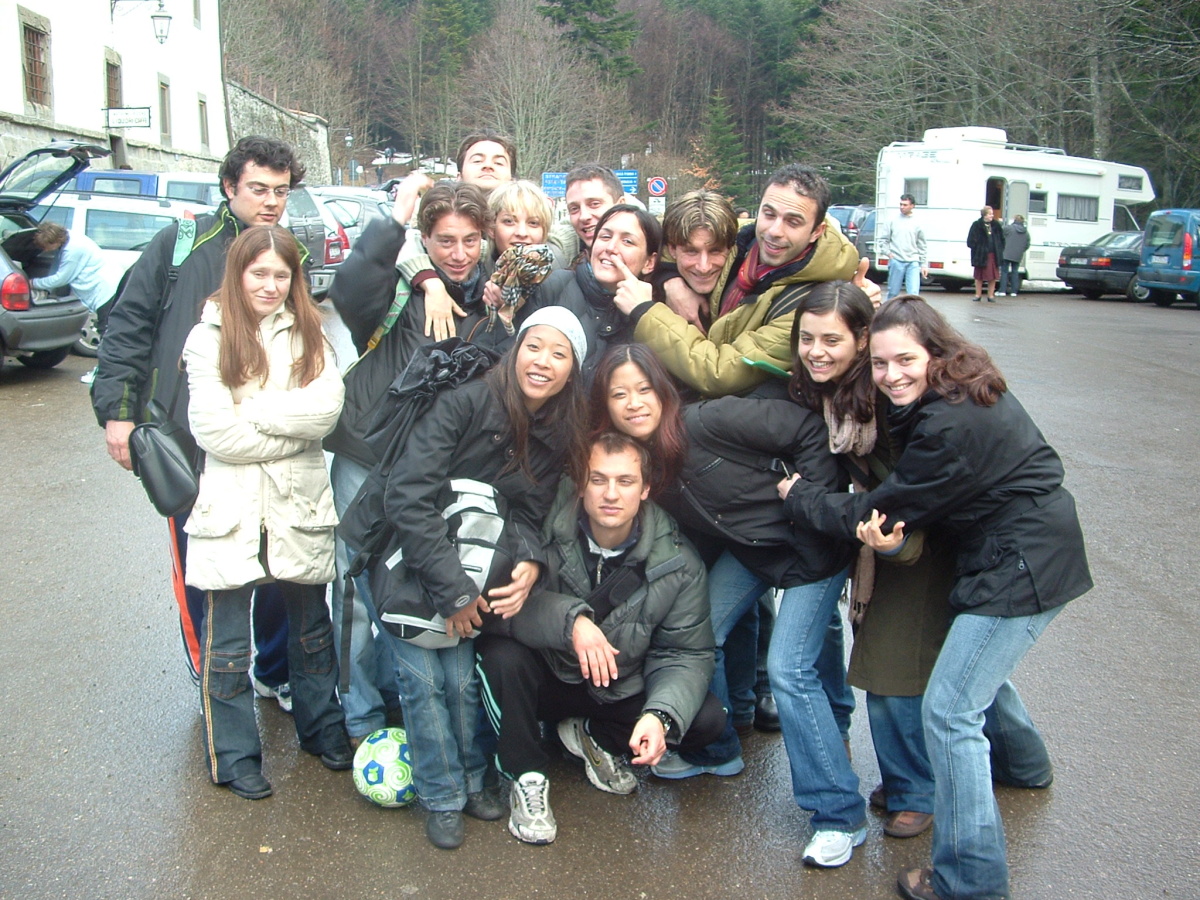 The Focolare community got involved in many ways, from moral and economic support for her parents to taking turns at her side, even to celebrate and share. From her bed, Sengsoury spread a special love. “There is only the present!” she confided to a Gen. With her feeble voice, she started to sing “O sole mio” to Jesus. She was more and more determined to offer him every suffering and transform them – as she used to say – into ‘golden nuggets’. On September 16, 2008, she began intensive treatment. In the days before her passing on September 24, she became more than ever that “ray of light,” dispelling every darkness with many a “yes” to Jesus. Those near to her sensed it through a hint in her eye or a squeeze of her hand. For them, for the ward staff and for all the young people of the movement, Sengsoury is – as her name says – a true ray of light, a vibrant light, an authentic witness of the Gospel lived.
The Focolare community got involved in many ways, from moral and economic support for her parents to taking turns at her side, even to celebrate and share. From her bed, Sengsoury spread a special love. “There is only the present!” she confided to a Gen. With her feeble voice, she started to sing “O sole mio” to Jesus. She was more and more determined to offer him every suffering and transform them – as she used to say – into ‘golden nuggets’. On September 16, 2008, she began intensive treatment. In the days before her passing on September 24, she became more than ever that “ray of light,” dispelling every darkness with many a “yes” to Jesus. Those near to her sensed it through a hint in her eye or a squeeze of her hand. For them, for the ward staff and for all the young people of the movement, Sengsoury is – as her name says – a true ray of light, a vibrant light, an authentic witness of the Gospel lived.
Nov 1, 2017 | Focolari nel Mondo
https://www.focolare.org/gb/files/2017/10/201711WOL.mp3 (more…)
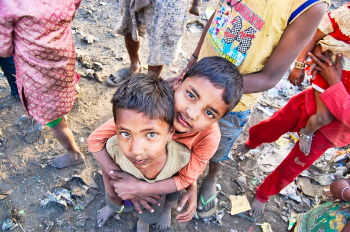
Nov 1, 2017 | Non categorizzato
 Great saints have always begun by moving toward God and toward the poor and underprivileged in an unconventional way. They left where they were from and went out towards the poor – not to give alms, but to share life, to take others’ lives in, in such a way that their own radically changed. The radical choice of God is really, in most cases in the history of salvation, a choice of the poor, a choice of the young in society, a choice of the most vulnerable. It is a choice that is not only about making the situation better, not just increase a bit of donations, or even living a small and temporary part of their lives and then go back to their own situation. It always comes from metanoia – a deep change in mentality, sensibility and being. I belong to them, I am like them, exactly like them before God, and I am not any better than them. No, I am at their level and, in fact, the Most Holy One came down to that level. From a homily on January 11, 1993. Klaus Hemmerle, The Light Within all Things, Rome: Citta’ Nuova, 1998, p. 340.
Great saints have always begun by moving toward God and toward the poor and underprivileged in an unconventional way. They left where they were from and went out towards the poor – not to give alms, but to share life, to take others’ lives in, in such a way that their own radically changed. The radical choice of God is really, in most cases in the history of salvation, a choice of the poor, a choice of the young in society, a choice of the most vulnerable. It is a choice that is not only about making the situation better, not just increase a bit of donations, or even living a small and temporary part of their lives and then go back to their own situation. It always comes from metanoia – a deep change in mentality, sensibility and being. I belong to them, I am like them, exactly like them before God, and I am not any better than them. No, I am at their level and, in fact, the Most Holy One came down to that level. From a homily on January 11, 1993. Klaus Hemmerle, The Light Within all Things, Rome: Citta’ Nuova, 1998, p. 340.
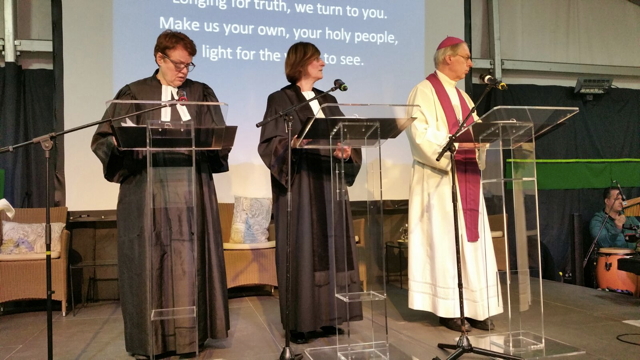
Oct 31, 2017 | Non categorizzato
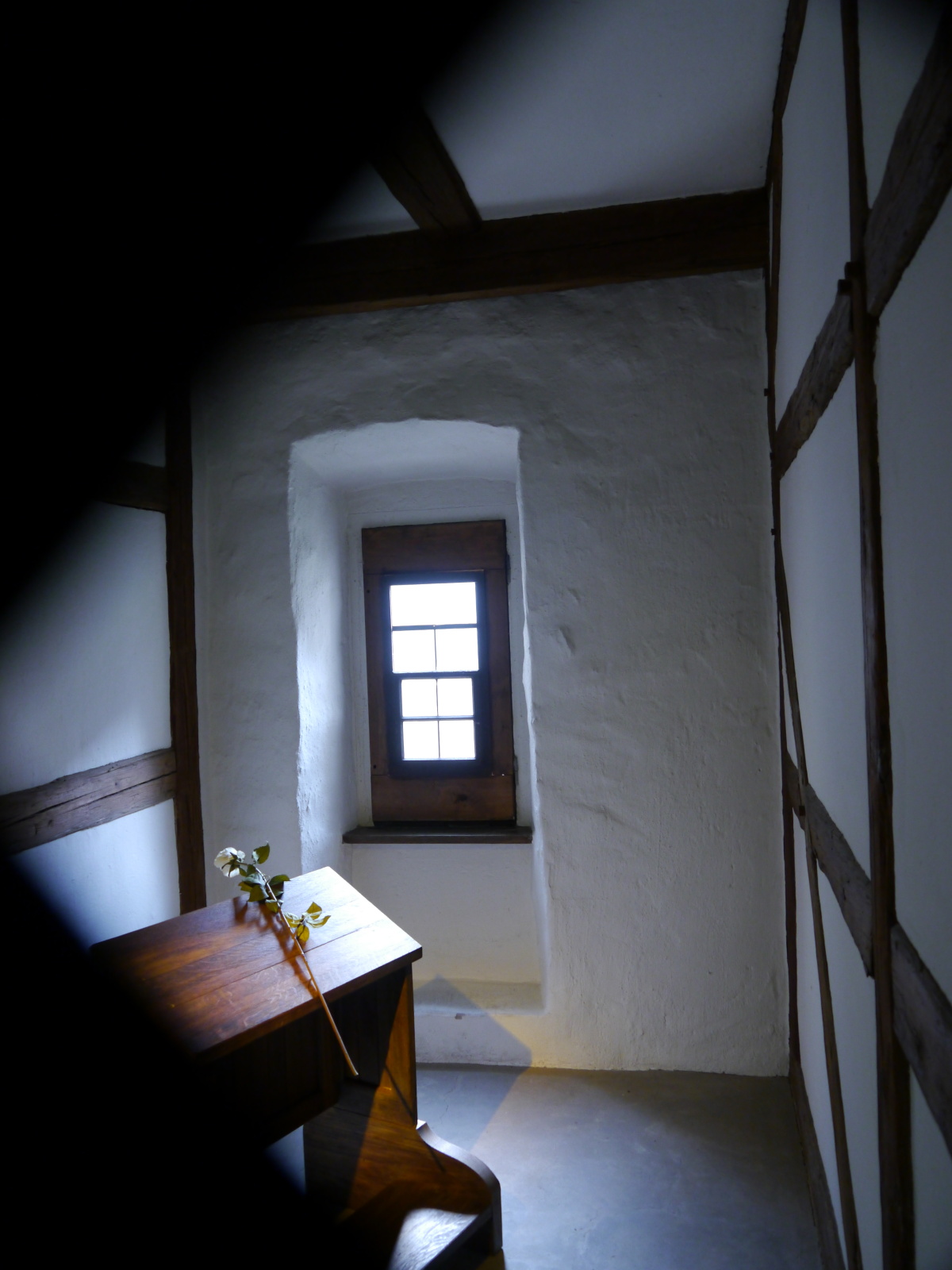
Erfurt: cell in Luther’s monastery
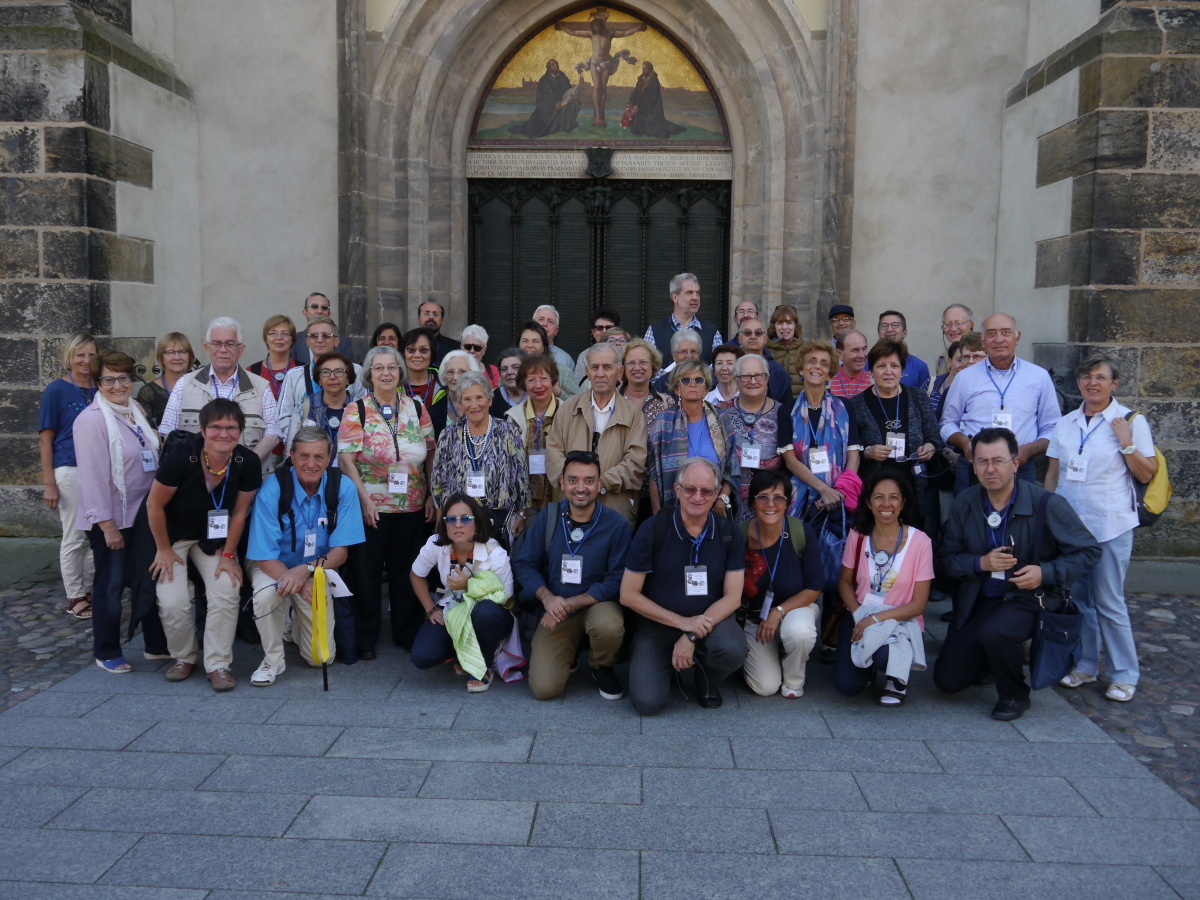 Throughout the year numerous encounters, conferences, ecumenical days and moments of common prayer in a variety of contexts and settings were held, almost always at local churches. They were opportunities to delve into the treasure of the different Christian traditions not only Catholic and Lutheran in a genuine family atmosphere. In May, during the Ecumenical Week called “Walking Together” and held at the Mariapolis Centre in Castel Gandolfo, Italy, Maria Voce spoke to 700 people from 42 countries and 69 different churches, identifying in the “five imperatives” of the Walking Together document the basis for any kind of fruitful ecumenical effort. Several presentations were made, including that of a new biography Lutero, L’uomo della Rivoluzione [Luther, the Man of the Revolution], written by Mario Dal Bello from Città Nuova. In Italy, the Focolare community held two evening programmes at Torino and Bra, with presentations by Hubertus Blaumeiser, a Catholic expert on Luther, and by Waldensian, Dr Paolo Ricca.
Throughout the year numerous encounters, conferences, ecumenical days and moments of common prayer in a variety of contexts and settings were held, almost always at local churches. They were opportunities to delve into the treasure of the different Christian traditions not only Catholic and Lutheran in a genuine family atmosphere. In May, during the Ecumenical Week called “Walking Together” and held at the Mariapolis Centre in Castel Gandolfo, Italy, Maria Voce spoke to 700 people from 42 countries and 69 different churches, identifying in the “five imperatives” of the Walking Together document the basis for any kind of fruitful ecumenical effort. Several presentations were made, including that of a new biography Lutero, L’uomo della Rivoluzione [Luther, the Man of the Revolution], written by Mario Dal Bello from Città Nuova. In Italy, the Focolare community held two evening programmes at Torino and Bra, with presentations by Hubertus Blaumeiser, a Catholic expert on Luther, and by Waldensian, Dr Paolo Ricca.  In Holland, leaders of the main Christian Churches began the Unity On the March Day. In Brazil, following a symposium promoted by the national ecumenical commission on Luther’s Comments on the Magnificat, there was an evening held at Mariapolis Ginetta which was followed via live streaming by many young people in 650 listening locations. In Venezuela several encounters and moments of prayer were held by the focolare communities. At Mariapolis Fiore in Poland the day event held in September for the 500th anniversary was the opportunity for a particular kind of witness: the fifteen year ecumenical pilgrimage shared by the people of Poland and Germany. In Ireland, on the initiative of the Focolare Movement and the Lutheran Church, studies were held, conference and an Ecumenical Bible week, which also involved the Anglican and Presbyterian Churches. There were also journeys to significant landmarks of the Reformation and of the life of Martin Luther. In the month of August, there was a seminar on Luther in Zwochau with fifty Catholics, Lutherans Waldensians and one Coptic-Orthodox, from several European countries, Egypt and Argentina. Included in the programme was a visit to Wartburg Castle and the city of Wittenberg, Effort where the young Luther entered the Augustinian Order, and Lipsia where his legacy met up with the musical genius of J. S. Bach. One Italian group visited another significant landmark, the city of Augusta, to get to know the Ecumenical Mariapolis of Ottmaring. A similar pilgrimage took place in June, promoted by the Ecumenical Commission of Hong Kong and accompanied by several focolarini. In Sweden, the Focolare community solemnly underwrote “the imperatives” and handed their signatures over to the Lutheran Archbishop. The Gen Verde performing arts group, through its concert concert “On the Other Side “, contributed to the commemoration in Stadthagen (Germany). These were but a few steps on a road that is still very long, which are added to many others that set the direction of the common search for truth and salvation, with an open gaze focused on all the Churches. It’s a new page in history.
In Holland, leaders of the main Christian Churches began the Unity On the March Day. In Brazil, following a symposium promoted by the national ecumenical commission on Luther’s Comments on the Magnificat, there was an evening held at Mariapolis Ginetta which was followed via live streaming by many young people in 650 listening locations. In Venezuela several encounters and moments of prayer were held by the focolare communities. At Mariapolis Fiore in Poland the day event held in September for the 500th anniversary was the opportunity for a particular kind of witness: the fifteen year ecumenical pilgrimage shared by the people of Poland and Germany. In Ireland, on the initiative of the Focolare Movement and the Lutheran Church, studies were held, conference and an Ecumenical Bible week, which also involved the Anglican and Presbyterian Churches. There were also journeys to significant landmarks of the Reformation and of the life of Martin Luther. In the month of August, there was a seminar on Luther in Zwochau with fifty Catholics, Lutherans Waldensians and one Coptic-Orthodox, from several European countries, Egypt and Argentina. Included in the programme was a visit to Wartburg Castle and the city of Wittenberg, Effort where the young Luther entered the Augustinian Order, and Lipsia where his legacy met up with the musical genius of J. S. Bach. One Italian group visited another significant landmark, the city of Augusta, to get to know the Ecumenical Mariapolis of Ottmaring. A similar pilgrimage took place in June, promoted by the Ecumenical Commission of Hong Kong and accompanied by several focolarini. In Sweden, the Focolare community solemnly underwrote “the imperatives” and handed their signatures over to the Lutheran Archbishop. The Gen Verde performing arts group, through its concert concert “On the Other Side “, contributed to the commemoration in Stadthagen (Germany). These were but a few steps on a road that is still very long, which are added to many others that set the direction of the common search for truth and salvation, with an open gaze focused on all the Churches. It’s a new page in history.
Listen to interview given to the BBC Radio (Ulster) by Swiss theologian Fr Hubertus Blaumeiser during the Sunday Sequence program on The Reformation (30/10/2017). Fr Blaumeiser is recognised as one of the leading authorities on Luther. http://www.bbc.co.uk/programmes/p05lc3dn
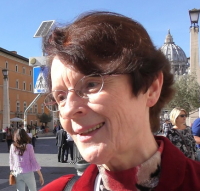
Oct 30, 2017 | Non categorizzato
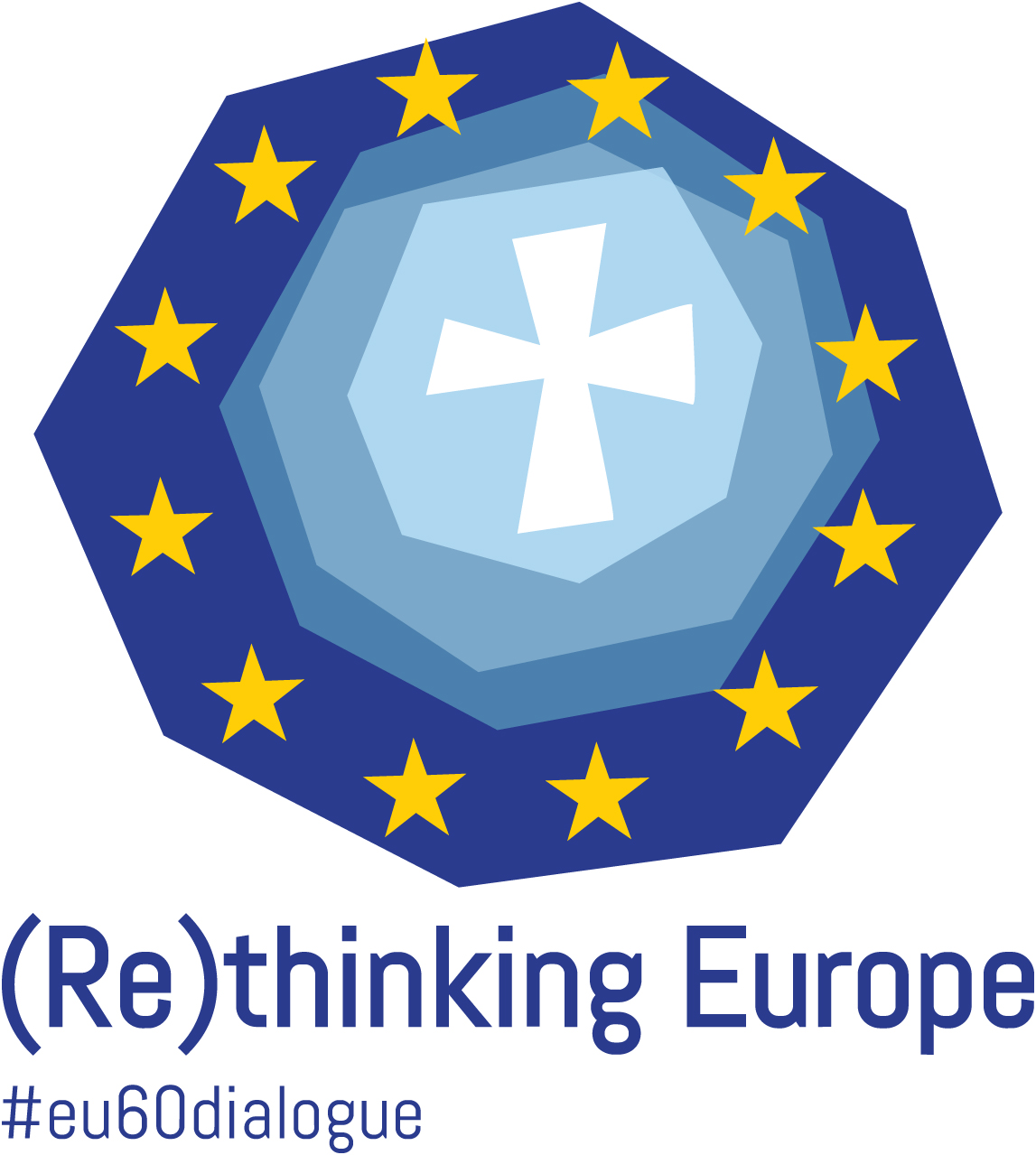 The convention entitled“(Re)Thinking Europe. A Christian contribution to the future of the Project for Europe” was held in the Vatican from 27 to 29 October. It was organised by the Commission of the European Bishops’ Conference (COMECE) in cooperation with the Secretary of State. “The commitment of Christians has to constitute a promise of peace,” Pope Francis said at the conclusion of the works. This is not “a time to build trenches, but rather, to work to fully pursue the dream of the Founding Fathers of a united and peaceful Europe, a community of peoples who want to share a future of development and peace.”
The convention entitled“(Re)Thinking Europe. A Christian contribution to the future of the Project for Europe” was held in the Vatican from 27 to 29 October. It was organised by the Commission of the European Bishops’ Conference (COMECE) in cooperation with the Secretary of State. “The commitment of Christians has to constitute a promise of peace,” Pope Francis said at the conclusion of the works. This is not “a time to build trenches, but rather, to work to fully pursue the dream of the Founding Fathers of a united and peaceful Europe, a community of peoples who want to share a future of development and peace.”

Ilona Toth
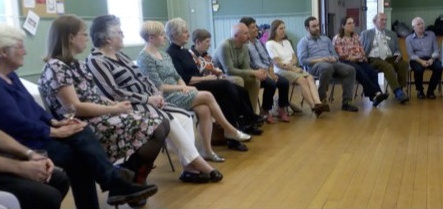
Oct 30, 2017 | Non categorizzato
 A small crowd gathered together despite the pouring rain and there was a tree of stylized branches on which many peace messages sprouted like leaves. This is just one of the more recent snapshots of an ongoing friendship between the Focolare community of Scotland and the Muslims of the Ahl Al Bait Society, founded in 1991 with the aim of promoting cultural legacy and religious faith of the Muslim minority in the country, and helping it to integrate into its social context. Together, the two communities have been promoting for some time now, moments of sharing, encounter and common prayer, where interreligious dialogue is proposed as a key element to face and heal the many divisions that are dangerously affecting the social weft, not only in Europe. Last 19 September, umbrellas opened under a grey sky to give a colourful sign of this commitment. Among those attending the Wake for Peace and Hope were some civil and religious personages, among which were Lord Provost, representative of the city’s Municipal Council, Metropolitan Archbishop Emeritus of Glasgow, Mario Conti, and some exponents of the Muslim Council of Scotland.
A small crowd gathered together despite the pouring rain and there was a tree of stylized branches on which many peace messages sprouted like leaves. This is just one of the more recent snapshots of an ongoing friendship between the Focolare community of Scotland and the Muslims of the Ahl Al Bait Society, founded in 1991 with the aim of promoting cultural legacy and religious faith of the Muslim minority in the country, and helping it to integrate into its social context. Together, the two communities have been promoting for some time now, moments of sharing, encounter and common prayer, where interreligious dialogue is proposed as a key element to face and heal the many divisions that are dangerously affecting the social weft, not only in Europe. Last 19 September, umbrellas opened under a grey sky to give a colourful sign of this commitment. Among those attending the Wake for Peace and Hope were some civil and religious personages, among which were Lord Provost, representative of the city’s Municipal Council, Metropolitan Archbishop Emeritus of Glasgow, Mario Conti, and some exponents of the Muslim Council of Scotland. 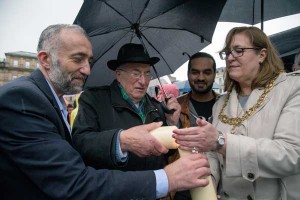 The organisers explained that this initiative was inspired by the appeal launched by Pope Francis for solidarity with Syrian people. Liz Taite of the Focolare Movement explained: “In a moment in which various circumstances are sowing division and conflicts, the Focolare Movement, together with people of different faiths, intends to publicly promote a message of peace. This event is the sign that God is at work and that peace is possible.” Azzam Mohammad, director of the Ahl Al Bait Society said: “Together we want to bring down the barriers, eliminate the fear and diffidence, and increase comprehension and mutual respect. We worked with sincerity and heartiness as a team, and it was a success. This is a step that marks the history of our common endeavours and will be an example for all the communities around us. Now we have started to plan for the next event.”
The organisers explained that this initiative was inspired by the appeal launched by Pope Francis for solidarity with Syrian people. Liz Taite of the Focolare Movement explained: “In a moment in which various circumstances are sowing division and conflicts, the Focolare Movement, together with people of different faiths, intends to publicly promote a message of peace. This event is the sign that God is at work and that peace is possible.” Azzam Mohammad, director of the Ahl Al Bait Society said: “Together we want to bring down the barriers, eliminate the fear and diffidence, and increase comprehension and mutual respect. We worked with sincerity and heartiness as a team, and it was a success. This is a step that marks the history of our common endeavours and will be an example for all the communities around us. Now we have started to plan for the next event.”  In August, Daniel, of Glasgow had participated in the Summer School Interfaith Engagement in Theory and Practice, a course/workshop dedicated to interreligious dialogue, and promoted for some years now by the Sophia University Institute and the Risalat Institute of Qum (Iran) in Tonadico, Northern Italy. This year the participants came from Canada, Europe and the United States. “I think that my city can understand the values of multiculturalism and integration. When we are united and supportive, and you recognise your own values in those who, at first sight, seem to be different, we can face the daily battles in a different way. These encounters between different faiths and cultures are testimonies of how unity is possible even when we are different. This diversity strengthens us and reminds us to greet each other as brothers and sisters, welcoming each other with open arms and a smile. We all can become messengers of hope and peace and engines of change.”
In August, Daniel, of Glasgow had participated in the Summer School Interfaith Engagement in Theory and Practice, a course/workshop dedicated to interreligious dialogue, and promoted for some years now by the Sophia University Institute and the Risalat Institute of Qum (Iran) in Tonadico, Northern Italy. This year the participants came from Canada, Europe and the United States. “I think that my city can understand the values of multiculturalism and integration. When we are united and supportive, and you recognise your own values in those who, at first sight, seem to be different, we can face the daily battles in a different way. These encounters between different faiths and cultures are testimonies of how unity is possible even when we are different. This diversity strengthens us and reminds us to greet each other as brothers and sisters, welcoming each other with open arms and a smile. We all can become messengers of hope and peace and engines of change.”
Oct 29, 2017 | Non categorizzato, Spiritualità, Word of
for ages 4-8 | for ages 9-17 | Print | Audio Jesus was speaking to the crowds that followed him, telling them about the new lifestyle of those who want to be his disciples, a way of life that went “against the current” in comparison to the usual way of thinking (see Mt 23:1–11). In his day (and today, too) it was easy to talk in high moral terms and then not live accordingly, seeking prestige in society, wanting to be seen or using others for personal advantage. Jesus asks his disciples to have a completely different logic when relating to others, as he himself had: “The greatest among you will be your servant.” At a September 1982 meeting in Payerne, Switzerland, Chiara Lubich shared her spiritual experience with people who wanted to discover how to live out the Gospel: “We must keep our gaze fixed on the one Father of so many children, and then consider all people as children of that one Father … “Jesus, who is our model, taught us two things that are ultimately one: to be children of our one Father and to be brothers and sisters to one another … God was calling us to universal brotherhood and sisterhood.” This is what is new, to love everyone just as Jesus did, because all people — you and me and every person on the face of the earth — are children of God, who have always been loved and wanted by him. In this way, we discover that the brother or sister we should love in concrete ways (with our muscles too) is every single person we meet on a daily basis. This means my dad, my mother-in-law and my rebellious child. It means someone in prison, a street beggar, someone who is disabled, my manager and the cleaners at work. It means my colleague in a political party and the person who has different political opinions than I do. It means people of our faith and culture, as well as foreigners. The characteristically Christian attitude toward every brother or sister is to serve them. “The greatest among you will be your servant.” “To strive for the primacy of the Gospel by putting ourselves at the service of everyone,” Chiara continued, “what is the best way to serve? “To make ourselves one with everyone we meet, feeling what they feel within ourselves: helping as though their problems were our own, made ours by love … No longer living just thinking of ourselves but seeking to bear other people’s burdens and to share their joys.” Each of our skills and good points, all that we might feel “great” about, is an opportunity to serve that should not be lost. Our work skills, our artistic talents, our knowledge, but also being able to laugh or make people laugh — or the time given to listening to someone who is unsure about what to do or who is in difficulty. There’s the energy of youth, but also the power of prayer, when physical strength lessens. “The greatest among you will be your servant.” Sooner or later, this selfless Gospel love kindles within the heart of our brothers and sisters the same desire to share, renewing relationships in the family, the parish, in workplaces and places where people relax, laying the foundations for a new society. Here’s an experience from Hermez, a teenager from the Middle East: “It was Sunday, and as soon as I woke up I asked Jesus to help me love all day long. I realized my parents had gone to an early Mass, and it occurred to me to clean and tidy the house. “I tried to do everything well, even putting some flowers on the table! Then I prepared breakfast and set the table. “When they came back, my parents were surprised and happy seeing all I had done. That Sunday, breakfast together was especially joyful; we spent time talking about many things, and I was able to share many experiences I had had that week. “That small act of love had set the tone for a fantastic day! By Letizia Magri
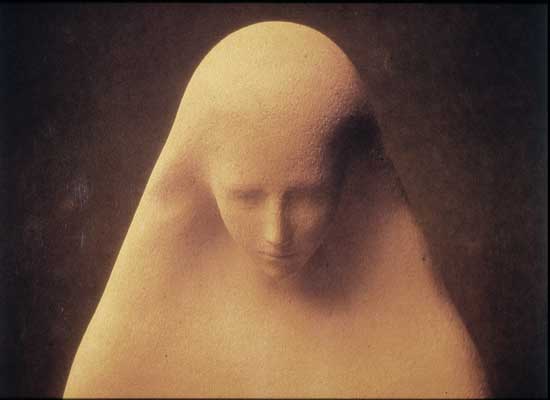
Oct 28, 2017 | Non categorizzato

Ave Cerquetti, ‘Mater Christi’ – Rome, 1971
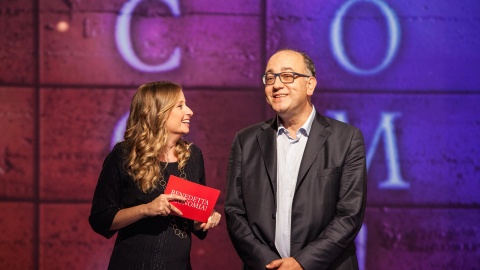
Oct 28, 2017 | Non categorizzato
 What connections can there be among the Bible and work, business, finance? Beginning tomorrow, an eight part series on Tv2000 with Luigino Bruni, focolarino, economist and passionate Bible enthusiast, instructor at Lumsa University in Rome, Italy, and Sophia University Institute in Loppiano, Italy. He will discuss with political world figures, labour union members and with workers, managers, business people who will present their testimonies of an economy oriented towards the human person. Based on the Economy of Communion, which considers as actors in the economy all those people that are not content with just turning a profit or themselves, but are open to the needs of the poorer folks, involving business owners, leaders and workers, students and ordinary citizens in the application of an economic culture that is marked by communion and reciprocity. In each episode a new connection will be made between a Bible passage and an aspect of the economy. The series will offer an opportunity to reflect on the original reasons, but also the current reasons for the inequity in the social fabric: insecurity, speculative logic, injustice, market intrusion in the public sphere and insecurity. There will also be business people and workers in the studio and via satellite to focus attention on small and medium-sized companies that have already exprienced success combining justice and market, profit and the common good, employment and solidarity. Beginning from the account of the Israelites in Egypt, found in the Book of Exodus, it considers the defence of workers rights. The second episode is an economic reading of the parable of the Prodigal Son and a comparison of themes of mercy and forgiveness with stories of business owners who have founded their business on a model of acceptance and sharing. A passage from Isaiah will raise a discussion in the episode dedicated to the “sacrificial model” adopted by many career managers, and by others that have been refuted in favour of free choice. A review of the story of Job, who falls into ruin and believes he is guilty, will be used to reflect on the hidden risks of the cult of merit. A page from the book of Jeremiah dedicated to false idols, will analyze the some of the motives that push many men and women of today into buying and consumerism on holy days, succumbing to the logic of the market square. Poverty and wealth will be themes of the sixth episode, in which the provocation of the Beatitudes will be confronted with the tendency to hide the value and meaning of poverty, sobriety and acceptance. The reading of the story of the Tower of Babel, mother of all failed businesses, will help to understand the errors that still today can lead a business into failure or towards mistaken ethical and social choices, and to discuss the social and economic consequences of organized crime. Finally, in the last episode, the reading of the story of Noah’s Ark will provide the opportunity to reflect on the “builders of arks of hope” that are still present in our day, with several stories of people that were able to veer in a different direction after very negative expriences, towards a more positive future for themselves and others.
What connections can there be among the Bible and work, business, finance? Beginning tomorrow, an eight part series on Tv2000 with Luigino Bruni, focolarino, economist and passionate Bible enthusiast, instructor at Lumsa University in Rome, Italy, and Sophia University Institute in Loppiano, Italy. He will discuss with political world figures, labour union members and with workers, managers, business people who will present their testimonies of an economy oriented towards the human person. Based on the Economy of Communion, which considers as actors in the economy all those people that are not content with just turning a profit or themselves, but are open to the needs of the poorer folks, involving business owners, leaders and workers, students and ordinary citizens in the application of an economic culture that is marked by communion and reciprocity. In each episode a new connection will be made between a Bible passage and an aspect of the economy. The series will offer an opportunity to reflect on the original reasons, but also the current reasons for the inequity in the social fabric: insecurity, speculative logic, injustice, market intrusion in the public sphere and insecurity. There will also be business people and workers in the studio and via satellite to focus attention on small and medium-sized companies that have already exprienced success combining justice and market, profit and the common good, employment and solidarity. Beginning from the account of the Israelites in Egypt, found in the Book of Exodus, it considers the defence of workers rights. The second episode is an economic reading of the parable of the Prodigal Son and a comparison of themes of mercy and forgiveness with stories of business owners who have founded their business on a model of acceptance and sharing. A passage from Isaiah will raise a discussion in the episode dedicated to the “sacrificial model” adopted by many career managers, and by others that have been refuted in favour of free choice. A review of the story of Job, who falls into ruin and believes he is guilty, will be used to reflect on the hidden risks of the cult of merit. A page from the book of Jeremiah dedicated to false idols, will analyze the some of the motives that push many men and women of today into buying and consumerism on holy days, succumbing to the logic of the market square. Poverty and wealth will be themes of the sixth episode, in which the provocation of the Beatitudes will be confronted with the tendency to hide the value and meaning of poverty, sobriety and acceptance. The reading of the story of the Tower of Babel, mother of all failed businesses, will help to understand the errors that still today can lead a business into failure or towards mistaken ethical and social choices, and to discuss the social and economic consequences of organized crime. Finally, in the last episode, the reading of the story of Noah’s Ark will provide the opportunity to reflect on the “builders of arks of hope” that are still present in our day, with several stories of people that were able to veer in a different direction after very negative expriences, towards a more positive future for themselves and others.
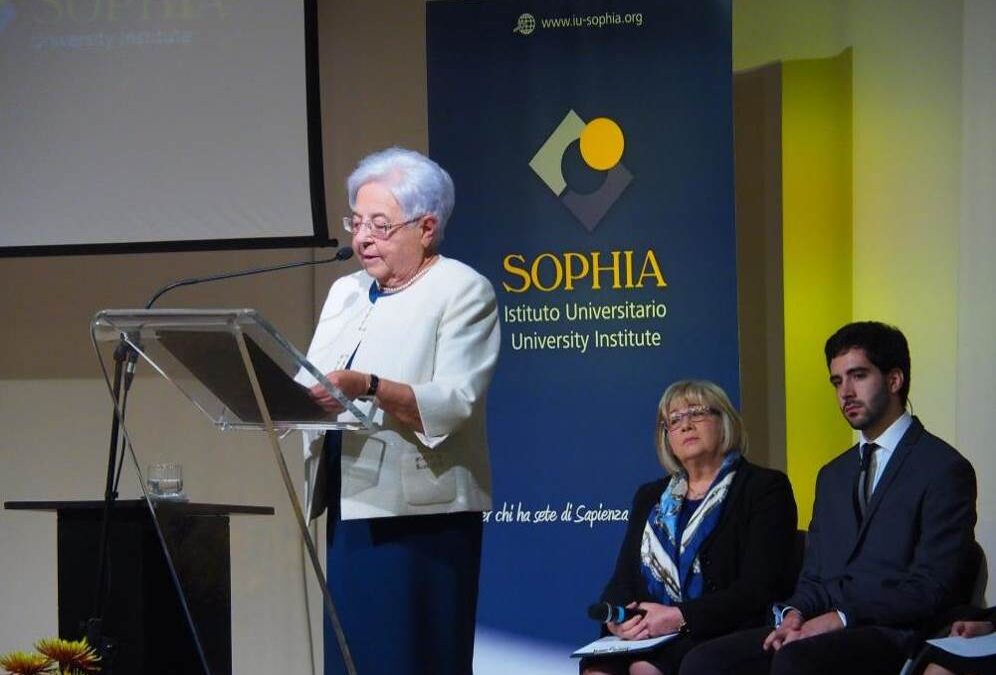
Oct 27, 2017 | Non categorizzato
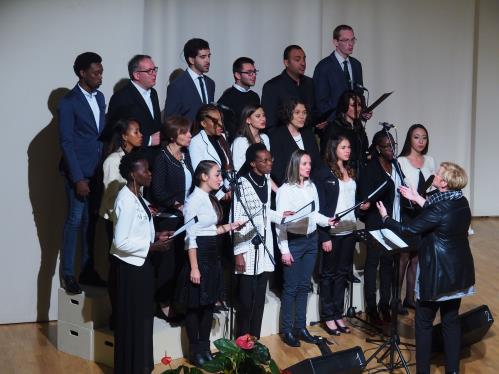 As processes of isolation increase around the world, Sophia University Institute opens a courageous new Centre for Global Studies which will “provide tools for understanding, managing and changing processes of global relations,” explained Pasquale Ferrara, Italian Ambassador to Algeria and president of the new Centre. “The new centre is the result of ten years of academic experience, and its goal is the training of a new generation of leaders that is capable of facing the complexity, and motivated to work for dialogue and peace.” “No country, no group can allow itself to become isolated from the other,” said Paolo Frizzi, professor of Religions and Global Processes, and Director of the Centre. “We are in the middle of an uncertain passage, which is transient and happening on many levels.
As processes of isolation increase around the world, Sophia University Institute opens a courageous new Centre for Global Studies which will “provide tools for understanding, managing and changing processes of global relations,” explained Pasquale Ferrara, Italian Ambassador to Algeria and president of the new Centre. “The new centre is the result of ten years of academic experience, and its goal is the training of a new generation of leaders that is capable of facing the complexity, and motivated to work for dialogue and peace.” “No country, no group can allow itself to become isolated from the other,” said Paolo Frizzi, professor of Religions and Global Processes, and Director of the Centre. “We are in the middle of an uncertain passage, which is transient and happening on many levels. 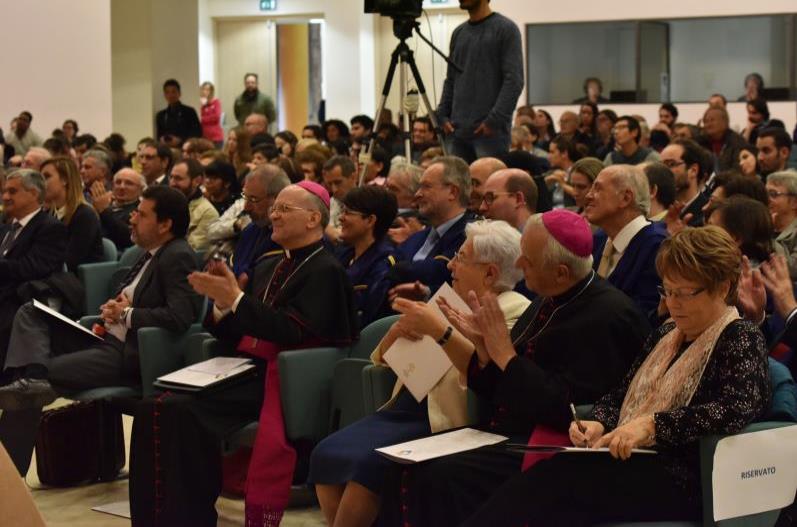 Sophia Institute, the result of Chiara Lubich’s intuition, has tripled its offerings this year: Master Degree in Economics and Management, Trinitarian Ontology and Culture of Unity, with their respective doctorates. President Msgr Piero Coda explains: “The complex nature of the national and global horizon requires a relentless effort oriented towards the unity of the human family guided by a new thought. In these ten years, Sophia has grown into an Intercultural, inter and trans-disciplinary centre where an integral relationship is nurtured among study, experience and research.”
Sophia Institute, the result of Chiara Lubich’s intuition, has tripled its offerings this year: Master Degree in Economics and Management, Trinitarian Ontology and Culture of Unity, with their respective doctorates. President Msgr Piero Coda explains: “The complex nature of the national and global horizon requires a relentless effort oriented towards the unity of the human family guided by a new thought. In these ten years, Sophia has grown into an Intercultural, inter and trans-disciplinary centre where an integral relationship is nurtured among study, experience and research.”
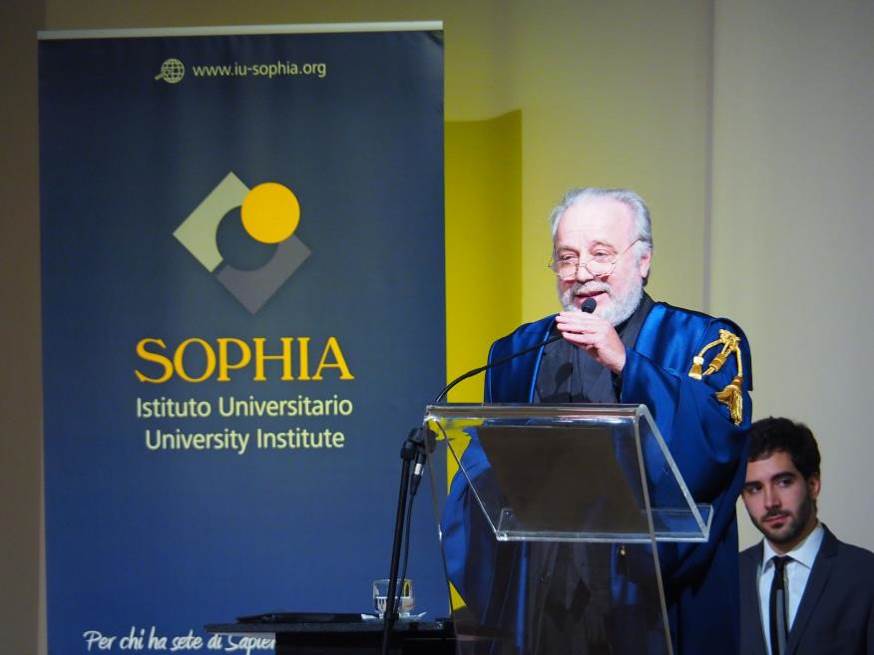
Msgr Piero Coda
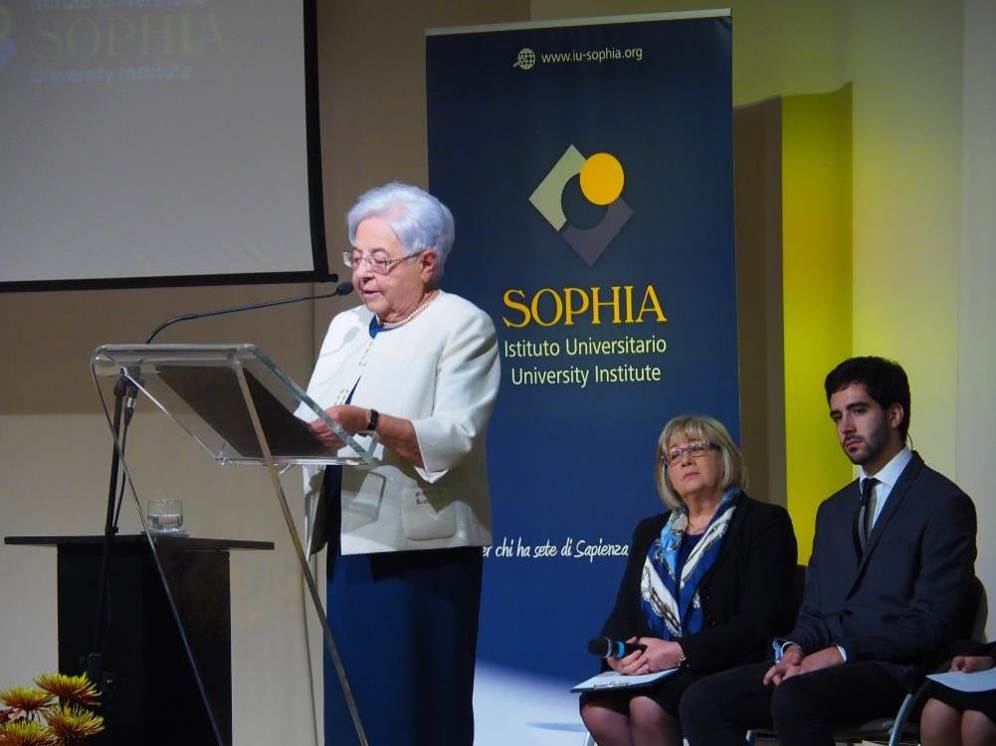
Maria Voce
Oct 26, 2017 | Non categorizzato
Together for Europe (TfE) is an initiative of over 300 Christian Movements and Communities belonging to different Churches in Europe. The Steering Committee which is entrusted with a coordination role is composed of the following members: Christophe D’Aloisio (Fraternité orthodoxe en Europe occidentale), Marco Impagliazzo (Community of Sant’Egidio), Michelle Moran (ICCRS / Sion Community), Gerhard Pross (CVJM/YMCA Esslingen), Thomas Roemer (CVJM/YMCA Munich), Gérard Testard (Efesia), Maria Voce (Focolare Movement) and Fr. Heinrich Walter (Schoenstatt). In 2017, the “Friends” of TfE network will hold their annual conference in Vienna, a city that is a bridge connecting Eastern and Western Europe. A total of 120 participants from around 20 Eastern and Western European countries and 40 Movements are expected to attend. Their main aim will be to pool ideas on three topics:
- What culture is generated by the history of Together for Europe?
- What is our specific contribution to Europe?
- Dialogue between East and West: a mutual enrichment
This network of people embraces all of Europe from England to Russia, from Portugal to Greece. Their shared mission: through the upcoming meeting, to strengthen communion among their individual charisms and build united and multifaceted Europe, with strong social cohesion and cultural diversity. The meeting will open, on 9th November 2017, in the Stephansdom Cathedral of Vienna, with an Ecumenical prayer for Europe. All those who wish for peace in Europe and in the world, are invited to take part in this moment of prayer. Cardinal Christoph Schoenborn, Archbishop of Vienna, Auxiliary Bishop Emeritus Helmuth Kraetzl, Catholic Church, Archpriest Vicar Ivan Petkin, Bulgarian Orthodox Church in Austria, Chorbishop Emanuel Aydin, Syrian Orthodox Church in Austria, Patriarchal Delegate Tiran Petrosyan, Armenian Apostolic Church, Patrick Curran, Archdeacon of the Eastern Archdeaconry of the Anglican Church in Europe, together with all the present will bring before God needs and opportunities of our continent. The intention of the prayer is extremely timely: unity in diversity, peace in justice. Following personalities will address the gathering: Thomas Hennefeld, Superintendent of the Reformed Church of Austria and President of the Ecumenical Council of Churches in Austria, and Joerg Wojahn, Head of the European Commission Representation in Austria. For further information on Together for Europe
Oct 26, 2017 | Non categorizzato
A group of young Columbian architects of the “De La Salle” University of Bogotà and Italians of “G. D’Annunzio” University of Pescara are undertaking a new stage of the traveling workshop, “Habitandando,” organized by the network of the Focolare Movement Dialogue in Architecture. From 24 to 28 October there will be a trip from Bogotà into the interior of the country, with stopovers in some colonial towns and the Amazon plains. From 30 October to 5 November a week of study-work will follow in the Altos de Cazuca district in the outskirts of Bogotà. This is a depressed area, lacking in primary infrastructure and renowned also for security-related problems. The objective is to design and experiment through creative projects and teamwork, architectonic and urban solutions aimed at generating change and creating spaces for the local community. This will be an extreme context at the limit of the resources, technological possibilities, and social and cultural environmental sustainability.
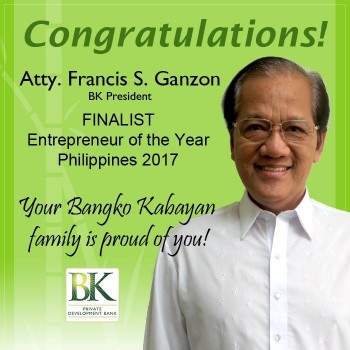
Oct 26, 2017 | Focolare Worldwide
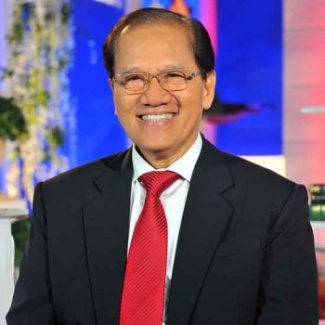 It is currently one of the biggest rural banks of the Philippines. But when Francis Ganzon (67 years old) took the helm in 1989, it only had one branch. Since then, the Institute has engaged in the support and empowering of the small and medium enterprises (SME), through the offer of quality financial systems “with a workforce united with God,” as the Bank site describes its “mission”. After obtaining his law degree, Ganzon dedicated himself to saving an institute, the Ibaan Rural Bank, Inc. (IRB), which was involved in cases of fraud. “I promoted a different work style, focusing on compliance with the laws, professionalism and centrality of the people, and promoted new practices in line with Christian values.” Ganzon embraced the spirit of the Economy of Communion, the international network of entrepreneurs engaged in putting the Social Doctrine of the Church into practice. “Subsequently, we created the Ibaan Rural Bank Foundation, with the objective of extending the microcredit programme also to deserving students with economic difficulties, through scholarships. The Asian financial crisis of 1997 also struck our bank, but we did not close down also thanks to the trust of our clients. That same year, the Bank celebrated its 40th Anniversary, and we changed its name to Bangko Kabayan (fraternity bank) as a further effort to supply people in need with the possibility to access microcredits in order to elevate their own standard of living.”
It is currently one of the biggest rural banks of the Philippines. But when Francis Ganzon (67 years old) took the helm in 1989, it only had one branch. Since then, the Institute has engaged in the support and empowering of the small and medium enterprises (SME), through the offer of quality financial systems “with a workforce united with God,” as the Bank site describes its “mission”. After obtaining his law degree, Ganzon dedicated himself to saving an institute, the Ibaan Rural Bank, Inc. (IRB), which was involved in cases of fraud. “I promoted a different work style, focusing on compliance with the laws, professionalism and centrality of the people, and promoted new practices in line with Christian values.” Ganzon embraced the spirit of the Economy of Communion, the international network of entrepreneurs engaged in putting the Social Doctrine of the Church into practice. “Subsequently, we created the Ibaan Rural Bank Foundation, with the objective of extending the microcredit programme also to deserving students with economic difficulties, through scholarships. The Asian financial crisis of 1997 also struck our bank, but we did not close down also thanks to the trust of our clients. That same year, the Bank celebrated its 40th Anniversary, and we changed its name to Bangko Kabayan (fraternity bank) as a further effort to supply people in need with the possibility to access microcredits in order to elevate their own standard of living.”  “Many clients – continued Ganzon – did not have collaterals, but we considered them as worthy people. This created a rapport of mutual trust: the bank trusted people and granted loans, and the clients trusted the bank. In this way Bangko Kabayan had a strong social impact, improving the lives of many people and many small enterprises. Then it became the preferred credit provider of the SME in our region, opening 23 branches in the provinces of Batangas, Quezon and Laguna.” In the near future, Bangko Kabayan will be committed to building a balanced portfolio of loans and capital, and in investing further in the new technologies, particularly in internet banking. Up to now Bangko Kabayan has been receiving various awards. In 2007, it received the best Capital Build-up in the PremiLandbank and was ranked among the best credit institutes at global level for microcredit. From 2008 to 2011 and again in 2013 and 2015, it was nominated in the region where it has its main office, a partner of the Land Bank of the Philippines. It moreover received Microenterprise access to the MF EAGLE award for bank service from 2003 to 2007 and again in 2010 and 2011. «Determination and integrity will always be compensated,” concluded Ganzon. “I am anxiously waiting for the day in which bank transactions can be done with a handshake instead of on paper.”
“Many clients – continued Ganzon – did not have collaterals, but we considered them as worthy people. This created a rapport of mutual trust: the bank trusted people and granted loans, and the clients trusted the bank. In this way Bangko Kabayan had a strong social impact, improving the lives of many people and many small enterprises. Then it became the preferred credit provider of the SME in our region, opening 23 branches in the provinces of Batangas, Quezon and Laguna.” In the near future, Bangko Kabayan will be committed to building a balanced portfolio of loans and capital, and in investing further in the new technologies, particularly in internet banking. Up to now Bangko Kabayan has been receiving various awards. In 2007, it received the best Capital Build-up in the PremiLandbank and was ranked among the best credit institutes at global level for microcredit. From 2008 to 2011 and again in 2013 and 2015, it was nominated in the region where it has its main office, a partner of the Land Bank of the Philippines. It moreover received Microenterprise access to the MF EAGLE award for bank service from 2003 to 2007 and again in 2010 and 2011. «Determination and integrity will always be compensated,” concluded Ganzon. “I am anxiously waiting for the day in which bank transactions can be done with a handshake instead of on paper.”
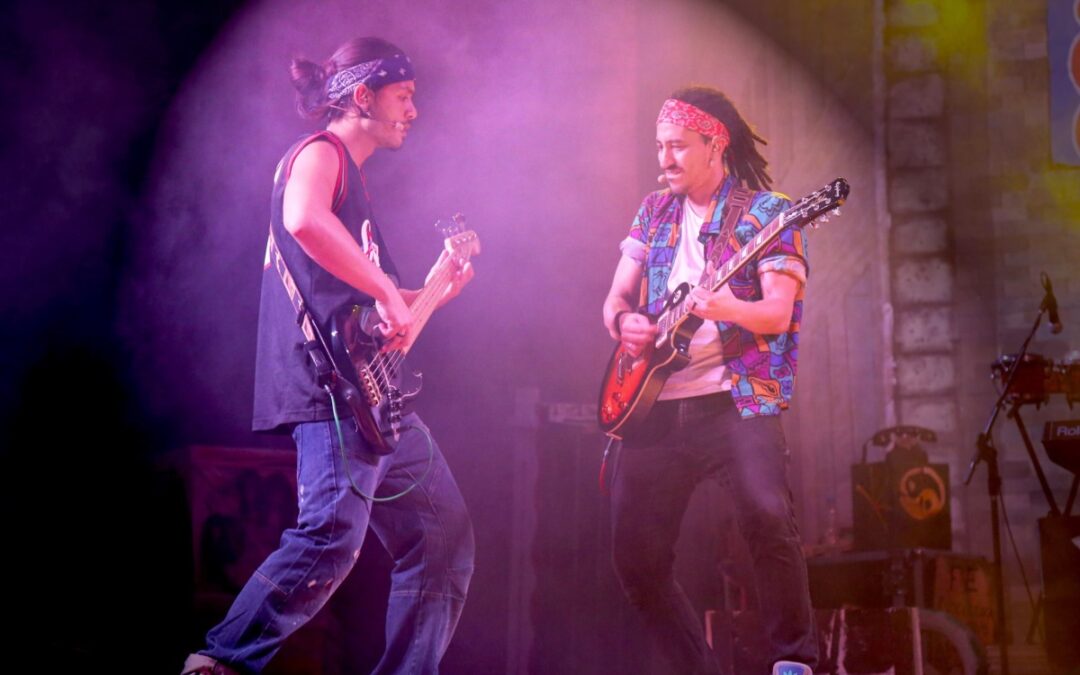
Oct 25, 2017 | Non categorizzato
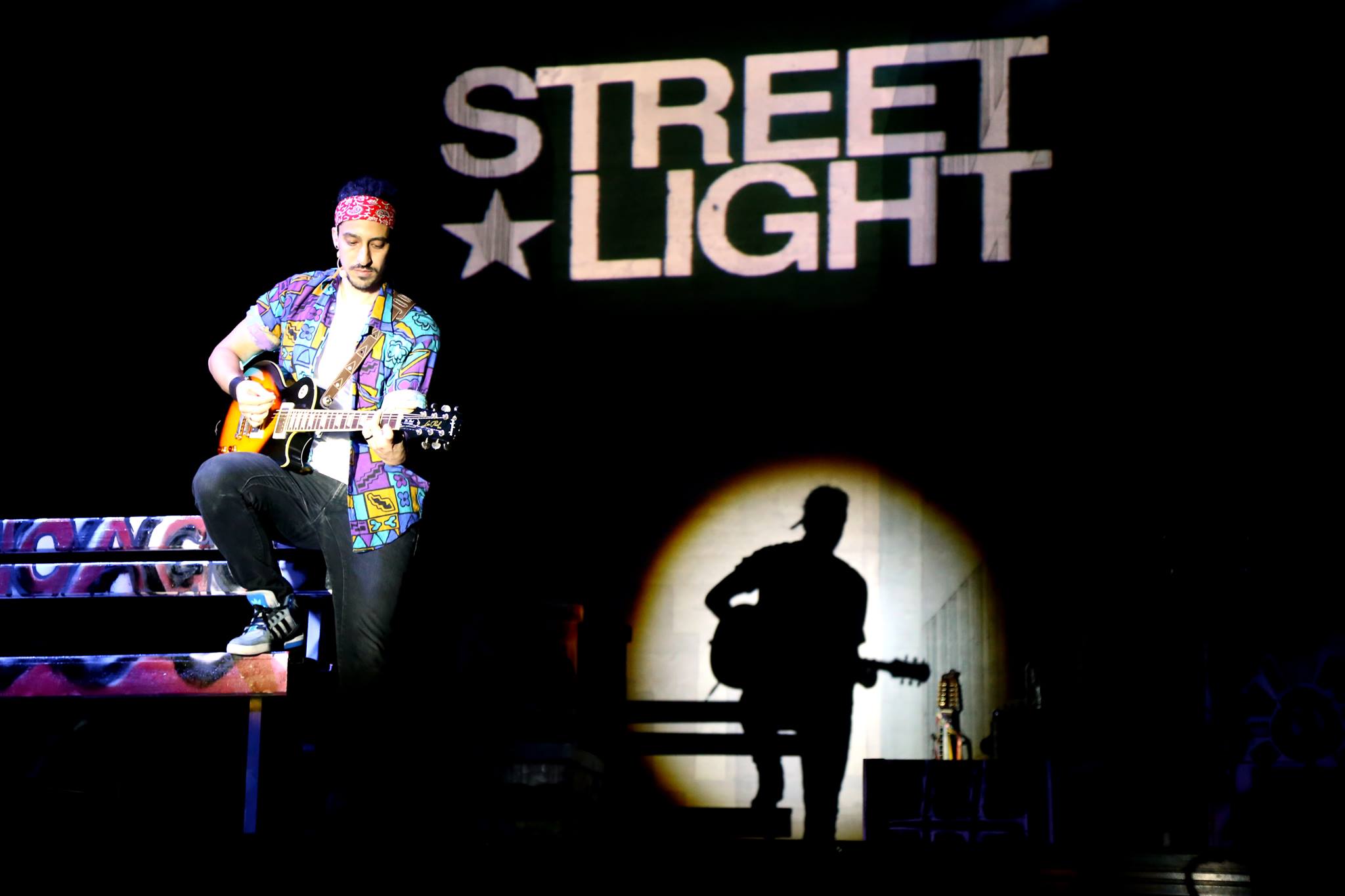 Organized by the Fazenda da Esperança, the Gen Rosso band’s Brazilian tour “Every life has a hope” is now underway. After a first stopover in the State of Santa Caterina, the tour will move on to the Central and Northern regions of the country. Joinville, ten hours by coach from Sao Paolo, is a modern city and a reference point for all dance enthusiasts, and not only the South Americans. Apart from Moscow, it is the only one that hosts a school of the Bolshoi Theater, where the old Russian method is taught. In the city of dance, from last 24 September to 1 October, nine Bolshoi ballet dancers and four others of the Cultural Centre contributed in setting up a musical. Streetlight is an original project that was staged with over 200 youths with drug addiction problems. In three days of intense work, they learnt and practiced dance steps and music, side by side with artists and youngsters, inspired by the motto one for the other. At the end, the curtain rose and the show was staged. It was not a job performed “for” the youth, but “with” the youth, said Globo TV – the most popular TV channel in Brazil – which dedicated several spots and interviews to the programme. A workshop dedicated to the educators and social workers working in the city, was held simultaneously on themes regarding the psychological, social and family processes connected to the rehab from the various types of addictions.
Organized by the Fazenda da Esperança, the Gen Rosso band’s Brazilian tour “Every life has a hope” is now underway. After a first stopover in the State of Santa Caterina, the tour will move on to the Central and Northern regions of the country. Joinville, ten hours by coach from Sao Paolo, is a modern city and a reference point for all dance enthusiasts, and not only the South Americans. Apart from Moscow, it is the only one that hosts a school of the Bolshoi Theater, where the old Russian method is taught. In the city of dance, from last 24 September to 1 October, nine Bolshoi ballet dancers and four others of the Cultural Centre contributed in setting up a musical. Streetlight is an original project that was staged with over 200 youths with drug addiction problems. In three days of intense work, they learnt and practiced dance steps and music, side by side with artists and youngsters, inspired by the motto one for the other. At the end, the curtain rose and the show was staged. It was not a job performed “for” the youth, but “with” the youth, said Globo TV – the most popular TV channel in Brazil – which dedicated several spots and interviews to the programme. A workshop dedicated to the educators and social workers working in the city, was held simultaneously on themes regarding the psychological, social and family processes connected to the rehab from the various types of addictions. 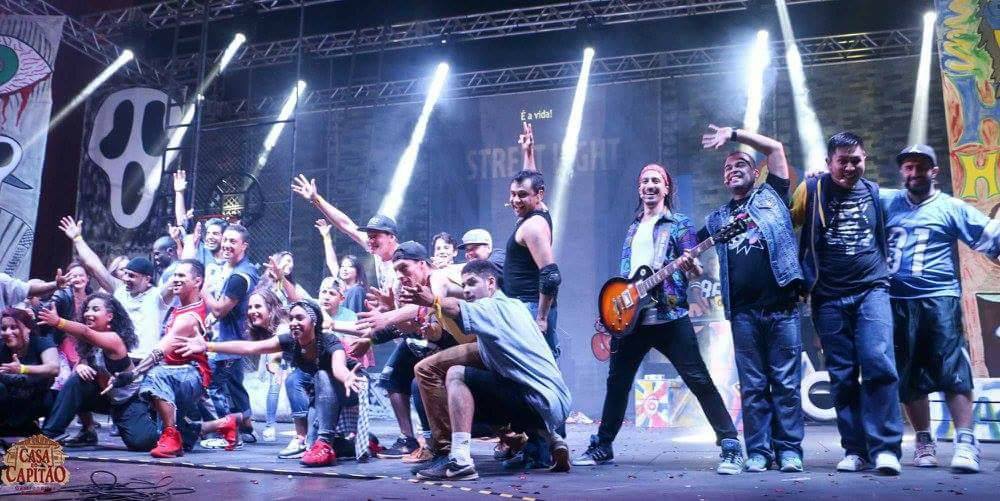 Fr. Luiz, current president of the Fazenda together with Angelucia, Nelson and Iracì, some of the pioneers of the “factory” of hope, which has spread from Brazil to Latin America, the Philippines, Africa, Russia and Central Europe, worked side by side with Gen Rosso, which for that occasion expanded its team, involving also other members of the local Focolare community. Enthusiasm among the youths involved onstage was sky-high. “It is really worthwhile to try and overcome one’s limits. I thank the Fazenda for giving us this opportunity to work with Gen Rosso”.
Fr. Luiz, current president of the Fazenda together with Angelucia, Nelson and Iracì, some of the pioneers of the “factory” of hope, which has spread from Brazil to Latin America, the Philippines, Africa, Russia and Central Europe, worked side by side with Gen Rosso, which for that occasion expanded its team, involving also other members of the local Focolare community. Enthusiasm among the youths involved onstage was sky-high. “It is really worthwhile to try and overcome one’s limits. I thank the Fazenda for giving us this opportunity to work with Gen Rosso”. 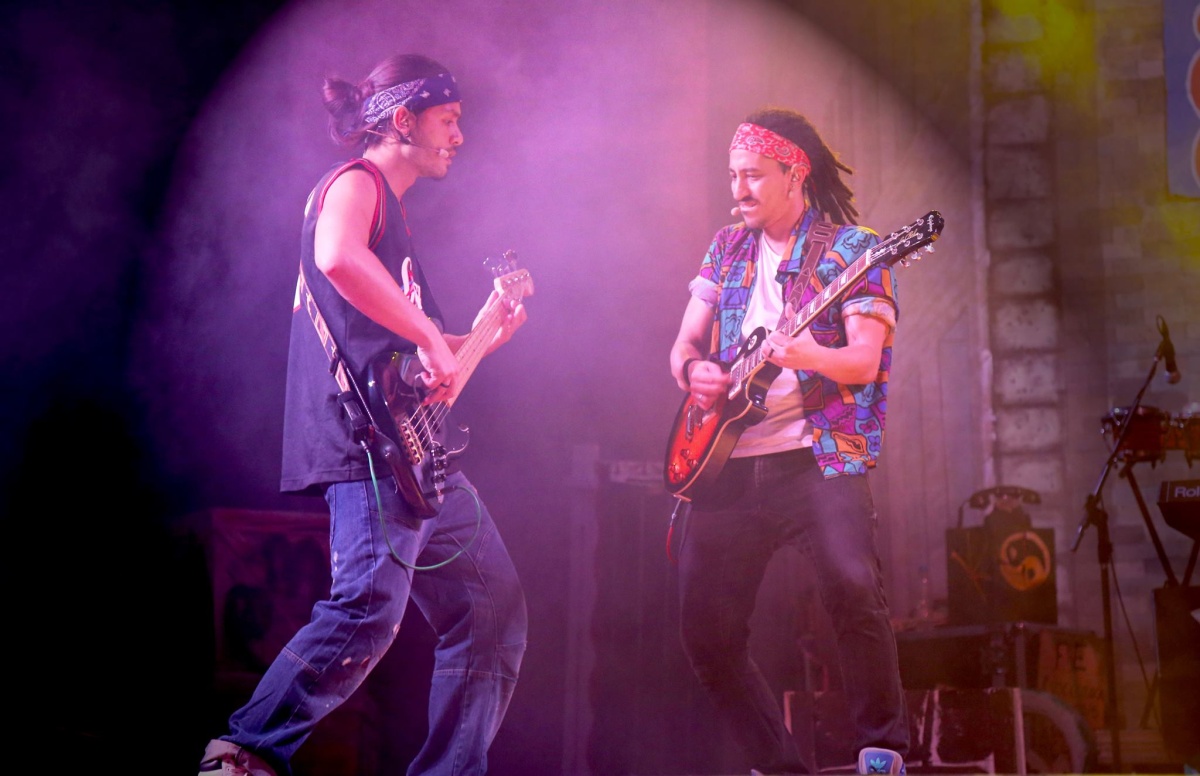 So taken by the music and the rhythm, a boy who in the past headed a violent gang, said: “The adrenalin I had experienced while doing bad things, was for me, the utmost. But I saw that one can be even happier in doing good, without drugs and alcohol. This is something new for me.” William, of the Bolshoi school: “I learned that one can dance not only with technique and discipline but also with one’s heart. It was a joyous and likewise harmonious experience expressed also with a smile.” A ballerina of the Cultural Centre said: ”Our professionalism encountered the force of a lifestyle of many youths: a surprise for me and a miracle of art for one another.” Also the public expressed surprise and enthusiasm: “I saw my city get involved.” “It is art that becomes service to society.” “You have strengthened unity among the various civil communities; a very precious experience which we must pursue in the future.” Meanwhile, after the concert in every city of the tour, the group continued the work to ensure that connections between the various social institutions engaged in the education and rehabilitation from drugs and other addictions, were consolidated and strengthened, so as not to allow the streetlights to dim. Streetlight Video.
So taken by the music and the rhythm, a boy who in the past headed a violent gang, said: “The adrenalin I had experienced while doing bad things, was for me, the utmost. But I saw that one can be even happier in doing good, without drugs and alcohol. This is something new for me.” William, of the Bolshoi school: “I learned that one can dance not only with technique and discipline but also with one’s heart. It was a joyous and likewise harmonious experience expressed also with a smile.” A ballerina of the Cultural Centre said: ”Our professionalism encountered the force of a lifestyle of many youths: a surprise for me and a miracle of art for one another.” Also the public expressed surprise and enthusiasm: “I saw my city get involved.” “It is art that becomes service to society.” “You have strengthened unity among the various civil communities; a very precious experience which we must pursue in the future.” Meanwhile, after the concert in every city of the tour, the group continued the work to ensure that connections between the various social institutions engaged in the education and rehabilitation from drugs and other addictions, were consolidated and strengthened, so as not to allow the streetlights to dim. Streetlight Video.
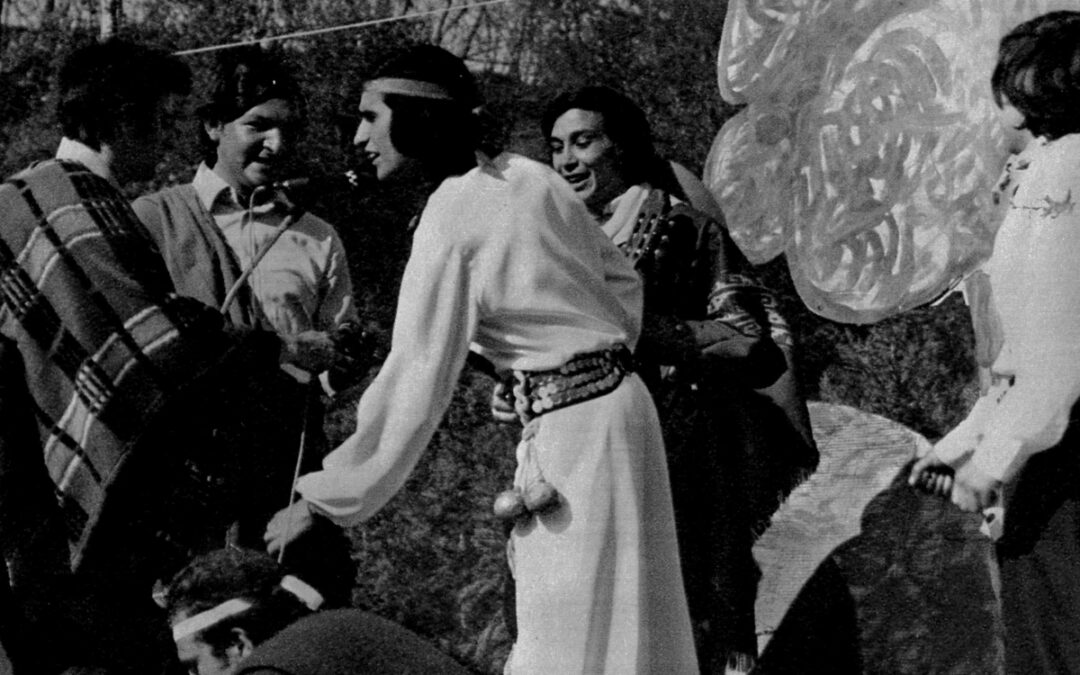
Oct 24, 2017 | Non categorizzato
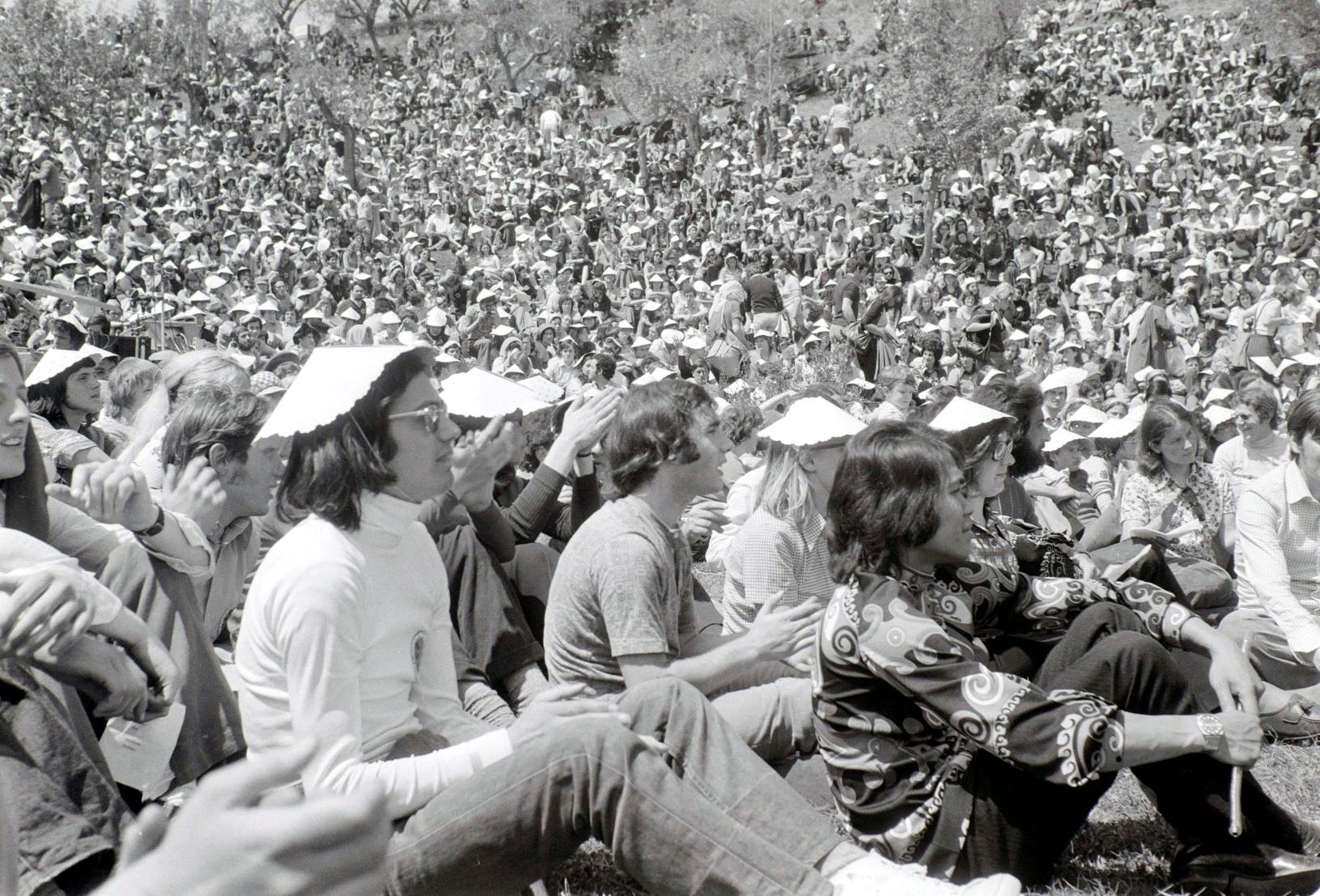 An unending line of buses filled with young people clamoured up the narrow roads that rose from Incisa Valdarno, Italy, to Loppiano. Such a long carcade hadn’t been expected and threatened to throw off the plans. Who would have expected 10,000 young people to come for what would then turn into a yearly event in many cities of the world? It was a real invasion that made all the jaws of Loppiano’s citizens drop. It began on a day of spring sunshine that burst from hearts and faces after a vigil of wind and rain: the first Genfest in history! And I was there! Yes, I was there! “Vivir para cantarlo,” García Márquez would say. “I live to sing it!” I can still see Loppiano’s natural amphitheatre in front of me, filled to the brim with young people from Italy and several other European countries, many hours of travel behind them – and also representatives from other countries around the world: like me from Argentina.
An unending line of buses filled with young people clamoured up the narrow roads that rose from Incisa Valdarno, Italy, to Loppiano. Such a long carcade hadn’t been expected and threatened to throw off the plans. Who would have expected 10,000 young people to come for what would then turn into a yearly event in many cities of the world? It was a real invasion that made all the jaws of Loppiano’s citizens drop. It began on a day of spring sunshine that burst from hearts and faces after a vigil of wind and rain: the first Genfest in history! And I was there! Yes, I was there! “Vivir para cantarlo,” García Márquez would say. “I live to sing it!” I can still see Loppiano’s natural amphitheatre in front of me, filled to the brim with young people from Italy and several other European countries, many hours of travel behind them – and also representatives from other countries around the world: like me from Argentina.
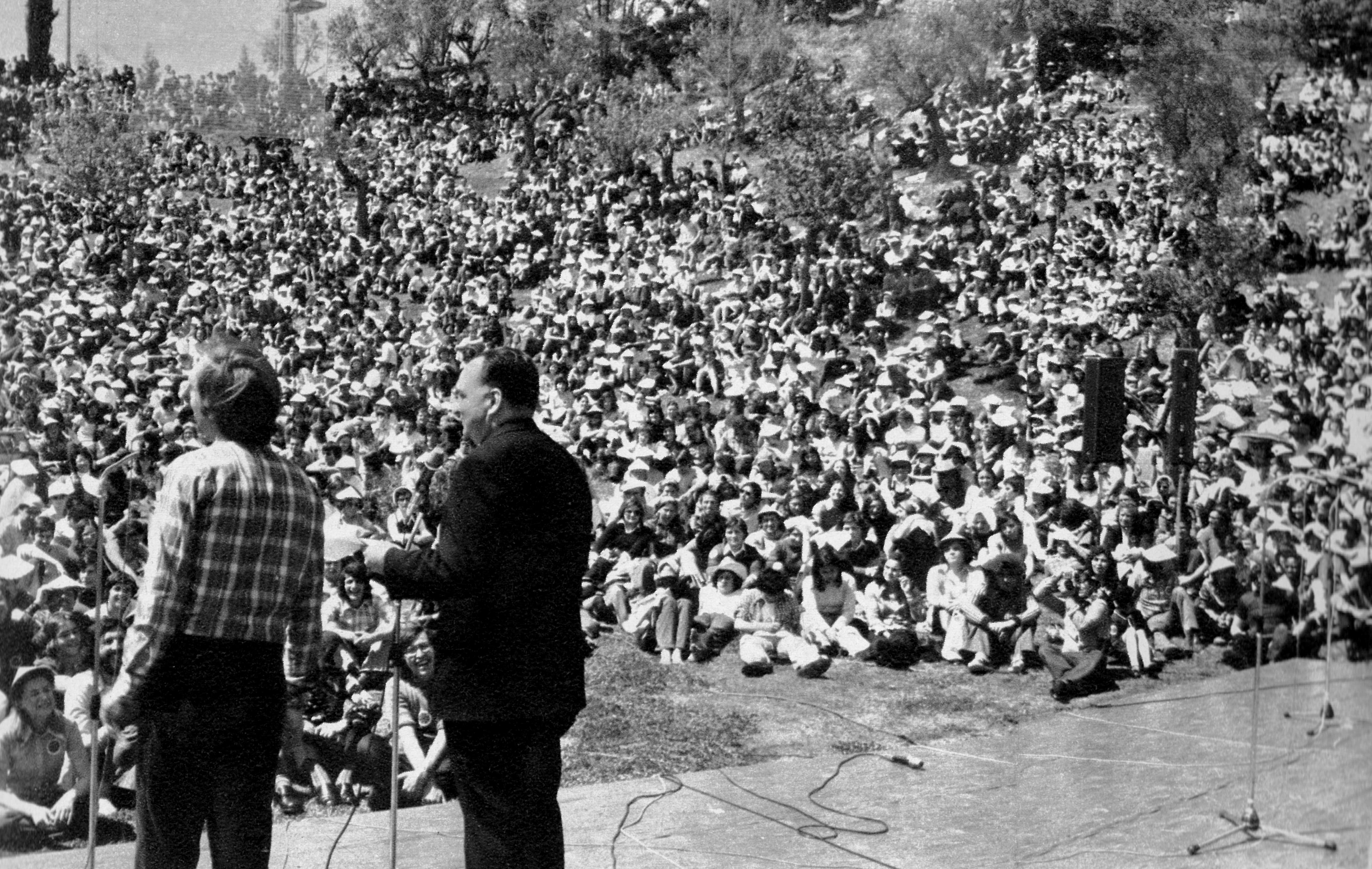
Fr Pasquale Foresi delivered a message from Pope Paul VI
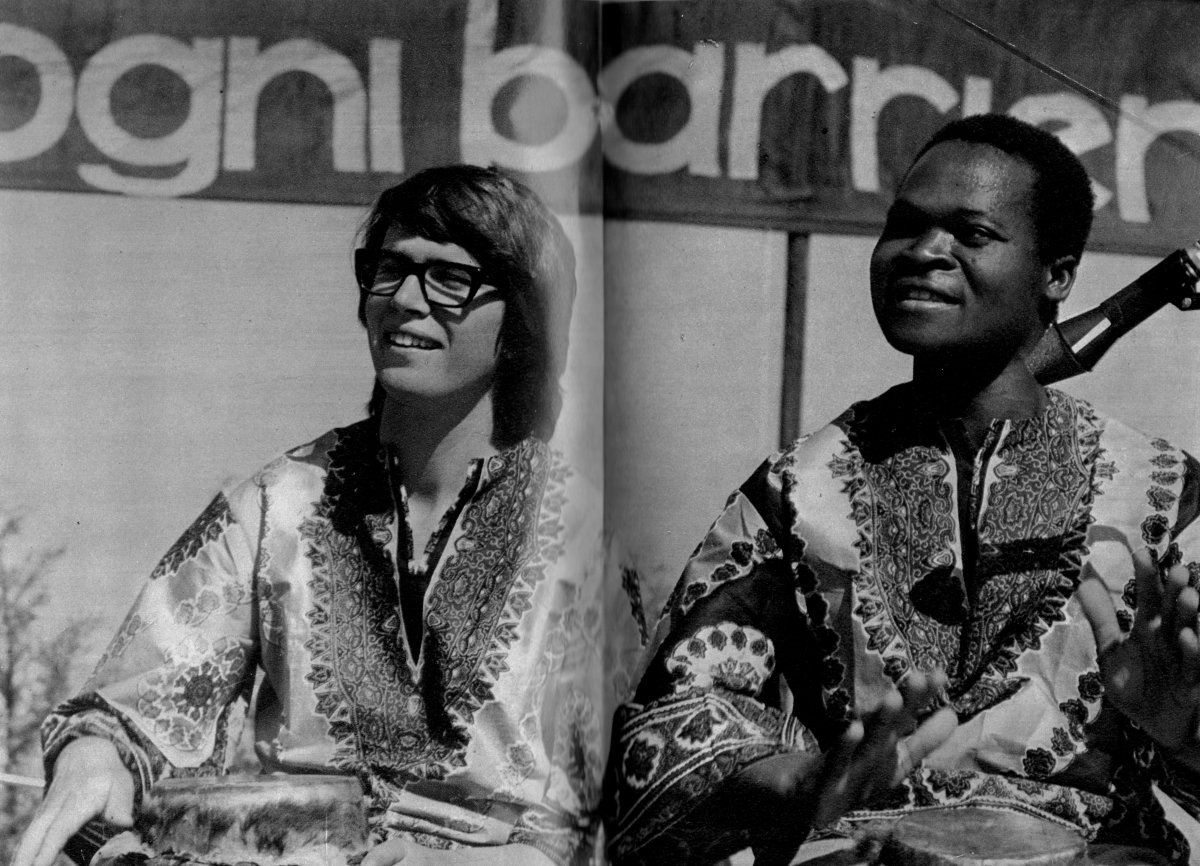
Participants from South Africa
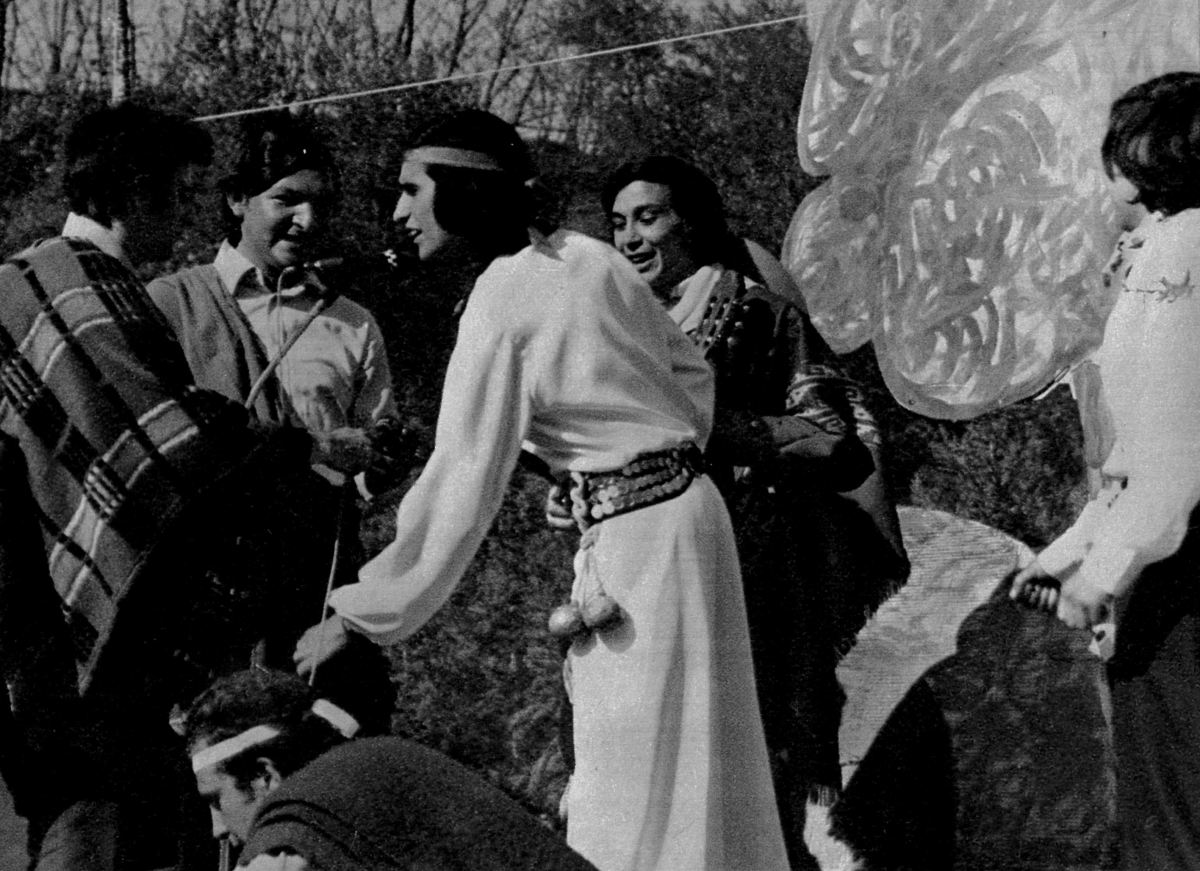
The group from Argentina
Gustavo Clariá
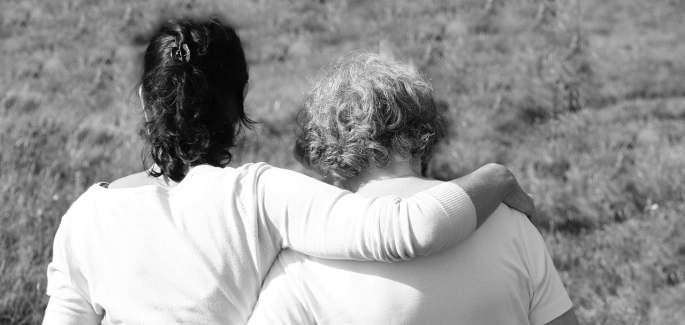
Oct 23, 2017 | Non categorizzato
 My return “My father passed away when I was 14. My mother, who was much younger than he was, gave us children much grief. She was often out with friends drinking, and she eventually left us for someone who divided his time between her and another family. After my siblings married, I found myself living alone, blaming my mother for all my pain. I could not forgive her. Yet I still called myself a Christian. I thought about the fact that she could not give me something she had not received herself. I realised it was up to me, since I had received the grace of the Gospel, to take the first step. It was a slow process. I started by calling her every so often, visiting her with small gifts and praying for her. Once I had felt like a victim of circumstances, but now I discovered that true happiness lies in loving without expecting anything in return. Even my relationship with her partner became more and more peaceful, and I try not to judge. Now I am the bridge between my siblings and my mother, and I’m sure that little by little they will come back to her.” (Alenne, Brazil) The cup of tea “I was in a cafe’ when I noticed an elderly lady asking for a cup of tea. She was quite poor, and the owner, thinking that she wouldn’t be able to pay, refused to serve her. I didn’t have much change in my pocket, but it would have been enough. I thought it was what Jesus would have done, so I said to the owner, “Give her the tea, I’ll pay.” To my surprise he answered: “That wouldn’t be fair. Your generosity helped me understand that it is much simpler for me, as the owner here, to offer it to her.” Taking the first step was all that was needed!” (John Paul, Pakistan) A hundredfold of love “For a number of years I’ve been working at a rehabilitation center, mostly with young people who, despite their vulnerability and suffering, are fighting to get back to a normal life. We work together in the kitchen each Thursday to prepare lunch. I thought I was being useful for them, but instead I’ve experienced that the love I give always comes back hundredfold. I understood that if we make an effort to welcome others as they are, with their weaknesses and painful histories, as Jesus would with a merciful eye, we can experience hope for a more peaceful future.” (Graziella, Italy) Forgetting my shortcomings “When I speak in public, my hands shake and my head gets a bit foggy. I tried to accept this and instead try to do something tangible for others. I started with small gestures, like helping my mother with the housework, or my siblings with their homework. Or I call my grandmother, who lives alone, and I go to visit her, bringing her some flowers or something sweet. At university I try to give a hand to those who are not as successful with exams. By doing this, my life didn’t just change, but I practically forgot all about my shortcomings.” (M., Germany)
My return “My father passed away when I was 14. My mother, who was much younger than he was, gave us children much grief. She was often out with friends drinking, and she eventually left us for someone who divided his time between her and another family. After my siblings married, I found myself living alone, blaming my mother for all my pain. I could not forgive her. Yet I still called myself a Christian. I thought about the fact that she could not give me something she had not received herself. I realised it was up to me, since I had received the grace of the Gospel, to take the first step. It was a slow process. I started by calling her every so often, visiting her with small gifts and praying for her. Once I had felt like a victim of circumstances, but now I discovered that true happiness lies in loving without expecting anything in return. Even my relationship with her partner became more and more peaceful, and I try not to judge. Now I am the bridge between my siblings and my mother, and I’m sure that little by little they will come back to her.” (Alenne, Brazil) The cup of tea “I was in a cafe’ when I noticed an elderly lady asking for a cup of tea. She was quite poor, and the owner, thinking that she wouldn’t be able to pay, refused to serve her. I didn’t have much change in my pocket, but it would have been enough. I thought it was what Jesus would have done, so I said to the owner, “Give her the tea, I’ll pay.” To my surprise he answered: “That wouldn’t be fair. Your generosity helped me understand that it is much simpler for me, as the owner here, to offer it to her.” Taking the first step was all that was needed!” (John Paul, Pakistan) A hundredfold of love “For a number of years I’ve been working at a rehabilitation center, mostly with young people who, despite their vulnerability and suffering, are fighting to get back to a normal life. We work together in the kitchen each Thursday to prepare lunch. I thought I was being useful for them, but instead I’ve experienced that the love I give always comes back hundredfold. I understood that if we make an effort to welcome others as they are, with their weaknesses and painful histories, as Jesus would with a merciful eye, we can experience hope for a more peaceful future.” (Graziella, Italy) Forgetting my shortcomings “When I speak in public, my hands shake and my head gets a bit foggy. I tried to accept this and instead try to do something tangible for others. I started with small gestures, like helping my mother with the housework, or my siblings with their homework. Or I call my grandmother, who lives alone, and I go to visit her, bringing her some flowers or something sweet. At university I try to give a hand to those who are not as successful with exams. By doing this, my life didn’t just change, but I practically forgot all about my shortcomings.” (M., Germany)
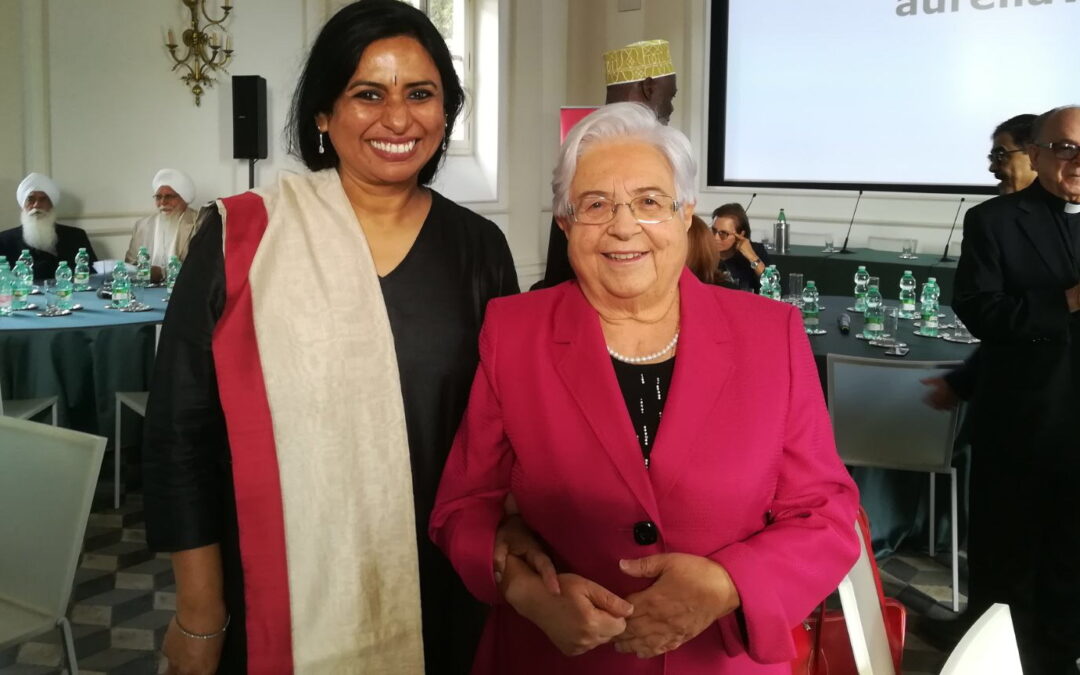
Oct 21, 2017 | Non categorizzato
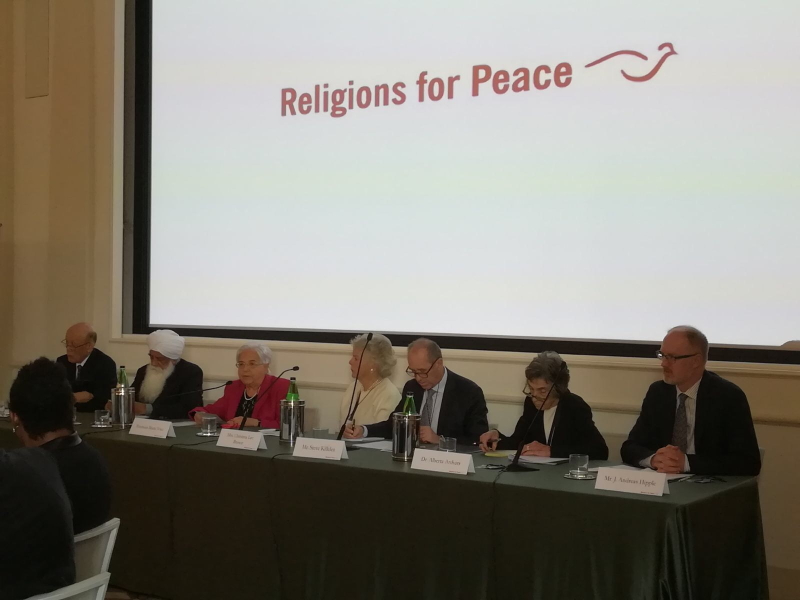 “There is a need for a common and cooperative effort on the part of the religions in promoting an integral ecology. Religions have the wherewithal to further a moral covenant that can promote respect for the dignity of the human person and care for creation”. This was a message that Pope Francis, prior to greeting the crowds at St Peter Square, addressed to the 80 delegates of Religions for Peace accompanied by Cardinal Jean-Louis Pierre Tauran, President of the Pontifical Council for Interreligious Dialogue. The Pope expressed his “esteem and appreciation for the work of “Religions for Peace”. You provide a valuable service to both religion and peace, for the religions are bound by their very nature to promote peace through justice, fraternity, disarmament and care for creation”.
“There is a need for a common and cooperative effort on the part of the religions in promoting an integral ecology. Religions have the wherewithal to further a moral covenant that can promote respect for the dignity of the human person and care for creation”. This was a message that Pope Francis, prior to greeting the crowds at St Peter Square, addressed to the 80 delegates of Religions for Peace accompanied by Cardinal Jean-Louis Pierre Tauran, President of the Pontifical Council for Interreligious Dialogue. The Pope expressed his “esteem and appreciation for the work of “Religions for Peace”. You provide a valuable service to both religion and peace, for the religions are bound by their very nature to promote peace through justice, fraternity, disarmament and care for creation”.
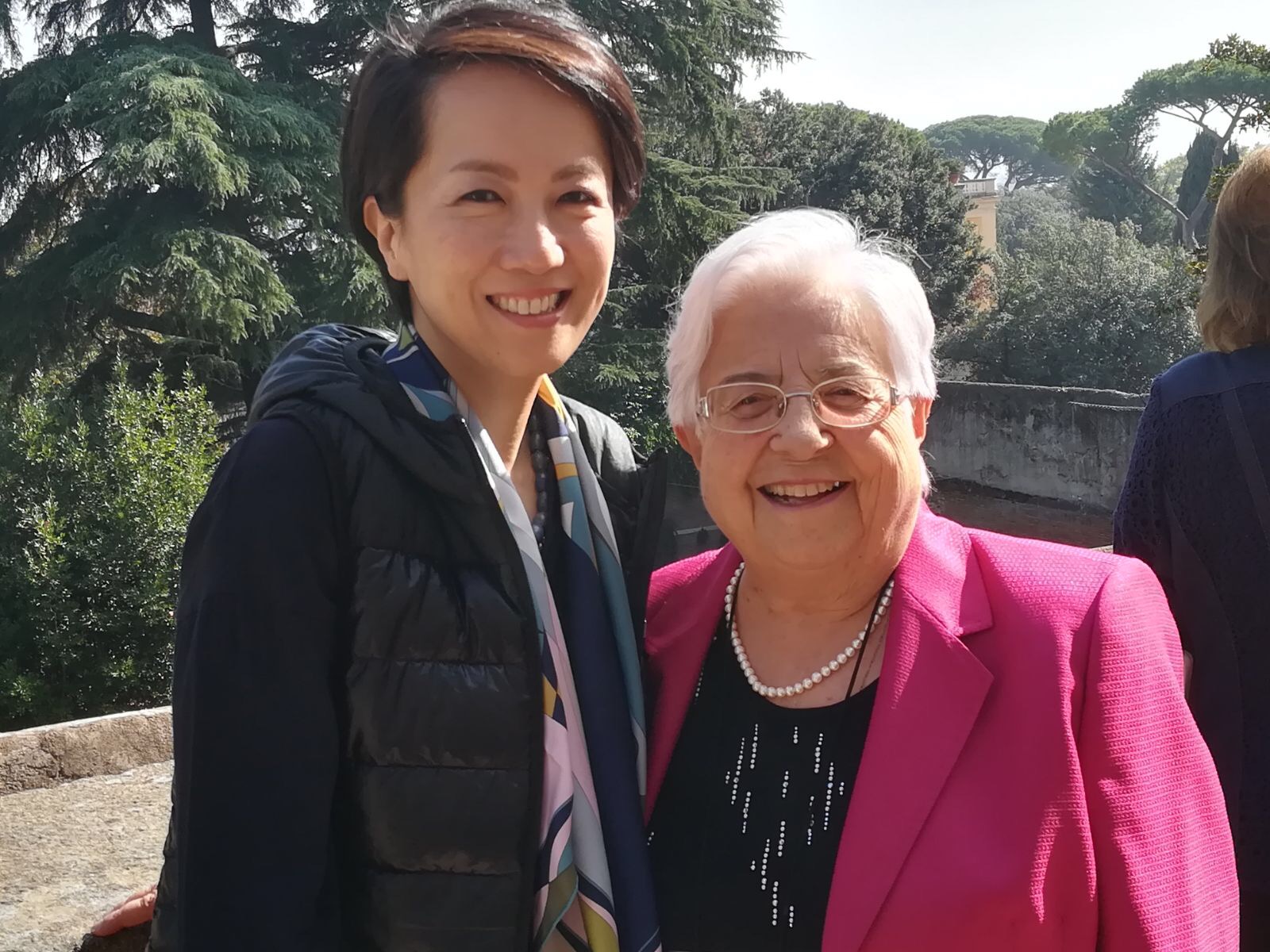
Maria Voce with Rev. Kosho Niwano, President-Designate of the Buddhist Movement Rissho Kosei-kai
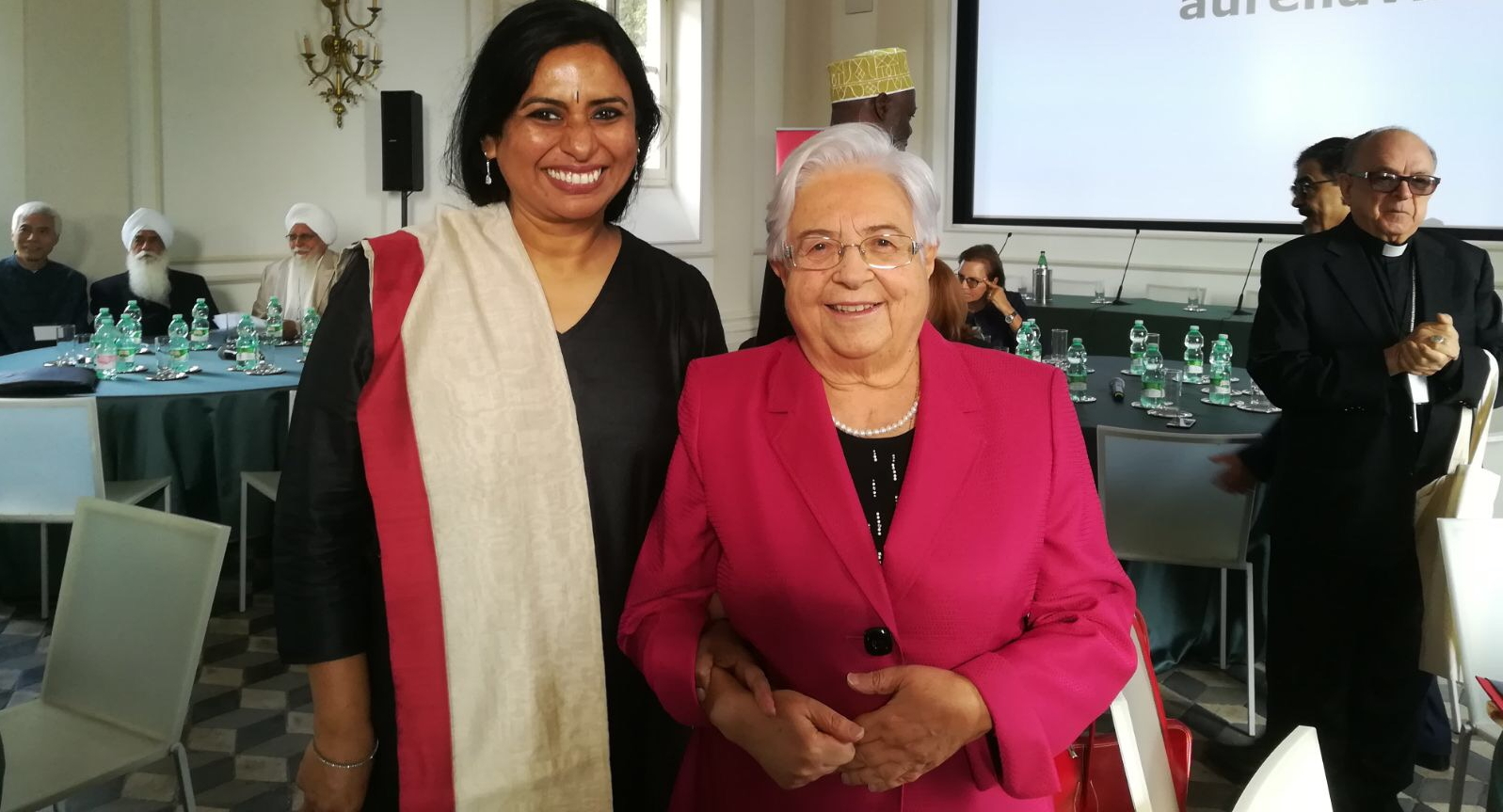
With Dr Vinu Aram, Director of Shanti Ashram and co-Moderator, Religions for Peace International.
Oct 20, 2017 | Non categorizzato
The death toll of the doublé suicide attack that took place last Saturday in Mogadishu, Somalia, continues to rise. The most recent news reports of at least 300 deaths and hundreds of injured. The October 14 attack was the most serious one in recent years, with 20 schoolchildren on a school bus. At the October 18th General Audience in St Peter’s Square, Pope Francis stated: “I want to express my sorrow for the massacre. This act of terrorism deplorable, also because it rages against a people that is already sorely tried.” He concluded: “I pray for the deceased and for the wounded, for their families and for the whole Somalian people. I implore the conversion of the violent and encourage all those who are working with enormous difficulty for peace in that battered country.”.
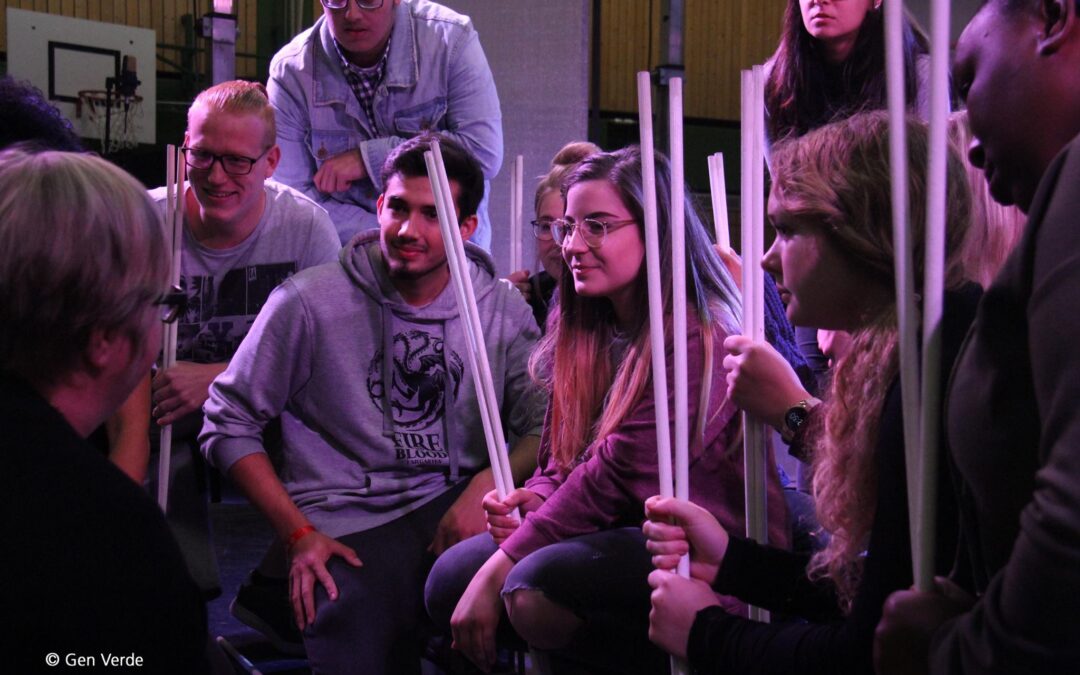
Oct 20, 2017 | Non categorizzato
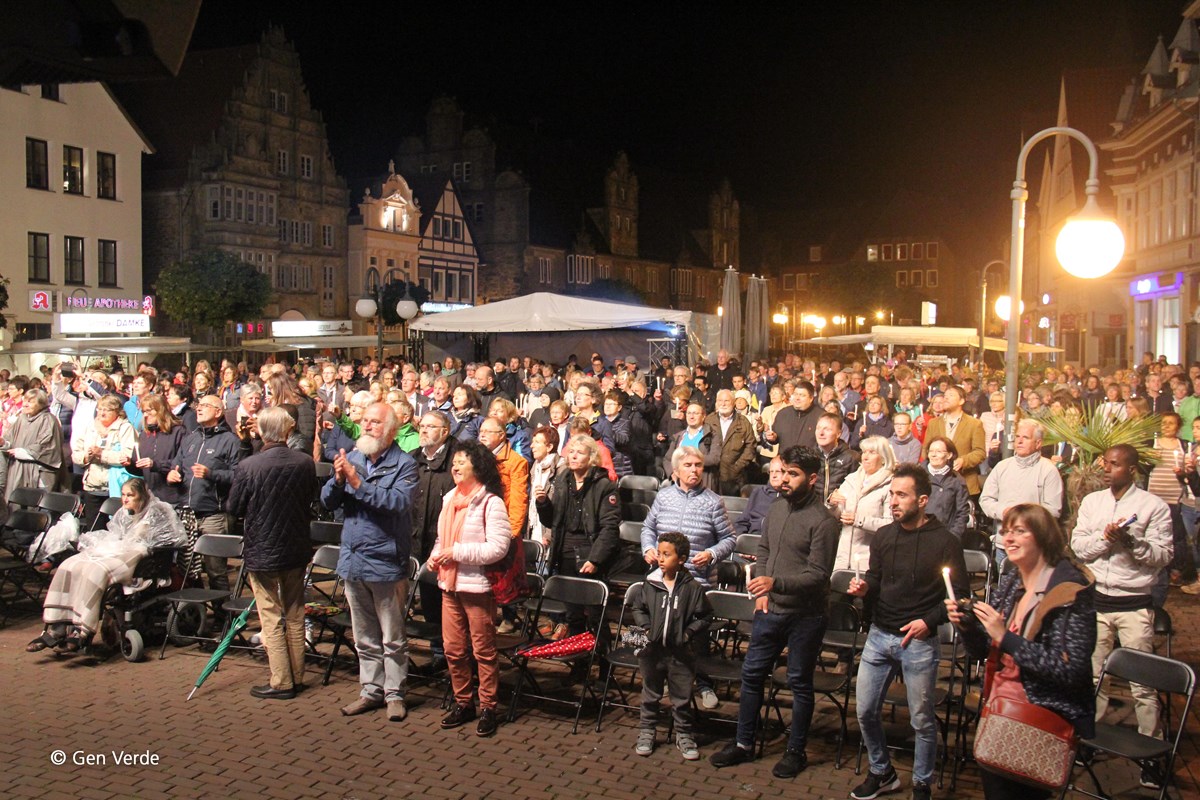 A month of dialogue, encounters and rediscovery of the “other’s” value. In a country characterized by a strong multi-ethnic feature, rhythm and music exercised a unifying power. On 9 September, in the town of Stadthagen, in the Lower Saxony region, on the occasion of the celebrations for the Reformation Jubilee, Gen Verde (22 members from 14 different countries) brought a note of internationality with the show, On the Other Side. A journey from one part of the planet to the other, recounted through personal experiences or that of entire populations, highlighted the wealth of diversity and the potential of those who find themselves “on the other side.” On 15 September in Boppard, at the local Fazenda da Esperança, community that challenges drug addiction in the perspective of a rebirth, the La vita LIVE concert became the occasion for a personal encounter between the members of the band and the experiences of the youth. The opportunity to understand that each one can take a small but huge step to change something, and to discover each other as brothers.
A month of dialogue, encounters and rediscovery of the “other’s” value. In a country characterized by a strong multi-ethnic feature, rhythm and music exercised a unifying power. On 9 September, in the town of Stadthagen, in the Lower Saxony region, on the occasion of the celebrations for the Reformation Jubilee, Gen Verde (22 members from 14 different countries) brought a note of internationality with the show, On the Other Side. A journey from one part of the planet to the other, recounted through personal experiences or that of entire populations, highlighted the wealth of diversity and the potential of those who find themselves “on the other side.” On 15 September in Boppard, at the local Fazenda da Esperança, community that challenges drug addiction in the perspective of a rebirth, the La vita LIVE concert became the occasion for a personal encounter between the members of the band and the experiences of the youth. The opportunity to understand that each one can take a small but huge step to change something, and to discover each other as brothers. 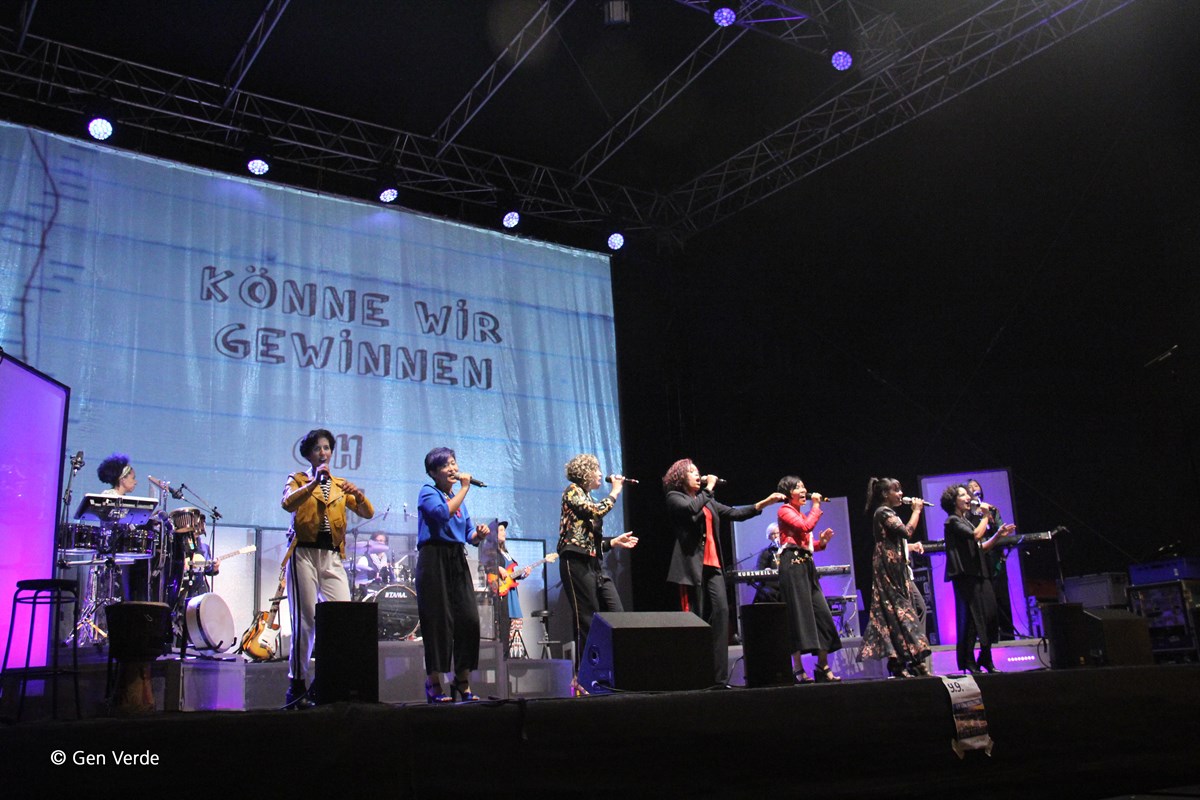 The following days, Gen Verde’s typical artistic features were expressed in a Start Now workshop: an intense boot camp that lasted five days, held in each of the three stopovers, working side by side with boys and girls. During the creative stage, which comes about always in a new and unforeseeable way, the youths worked in teams to develop their own talents and potentials, co-protagonists of a fascinating experience based on mutual listening and transparency. After two days of intense work, supported by the group’s trust and respect, the youths performed with the band in the final show, in a crescendo of emotions. There were three workshop-shows: in Dortmund, where the group worked with 170 boys and girls and in Duderstadt, with the students of three schools, among which a big group of immigrants, and lastly in Mannheim, with men and women living in a big refugee camp.
The following days, Gen Verde’s typical artistic features were expressed in a Start Now workshop: an intense boot camp that lasted five days, held in each of the three stopovers, working side by side with boys and girls. During the creative stage, which comes about always in a new and unforeseeable way, the youths worked in teams to develop their own talents and potentials, co-protagonists of a fascinating experience based on mutual listening and transparency. After two days of intense work, supported by the group’s trust and respect, the youths performed with the band in the final show, in a crescendo of emotions. There were three workshop-shows: in Dortmund, where the group worked with 170 boys and girls and in Duderstadt, with the students of three schools, among which a big group of immigrants, and lastly in Mannheim, with men and women living in a big refugee camp. 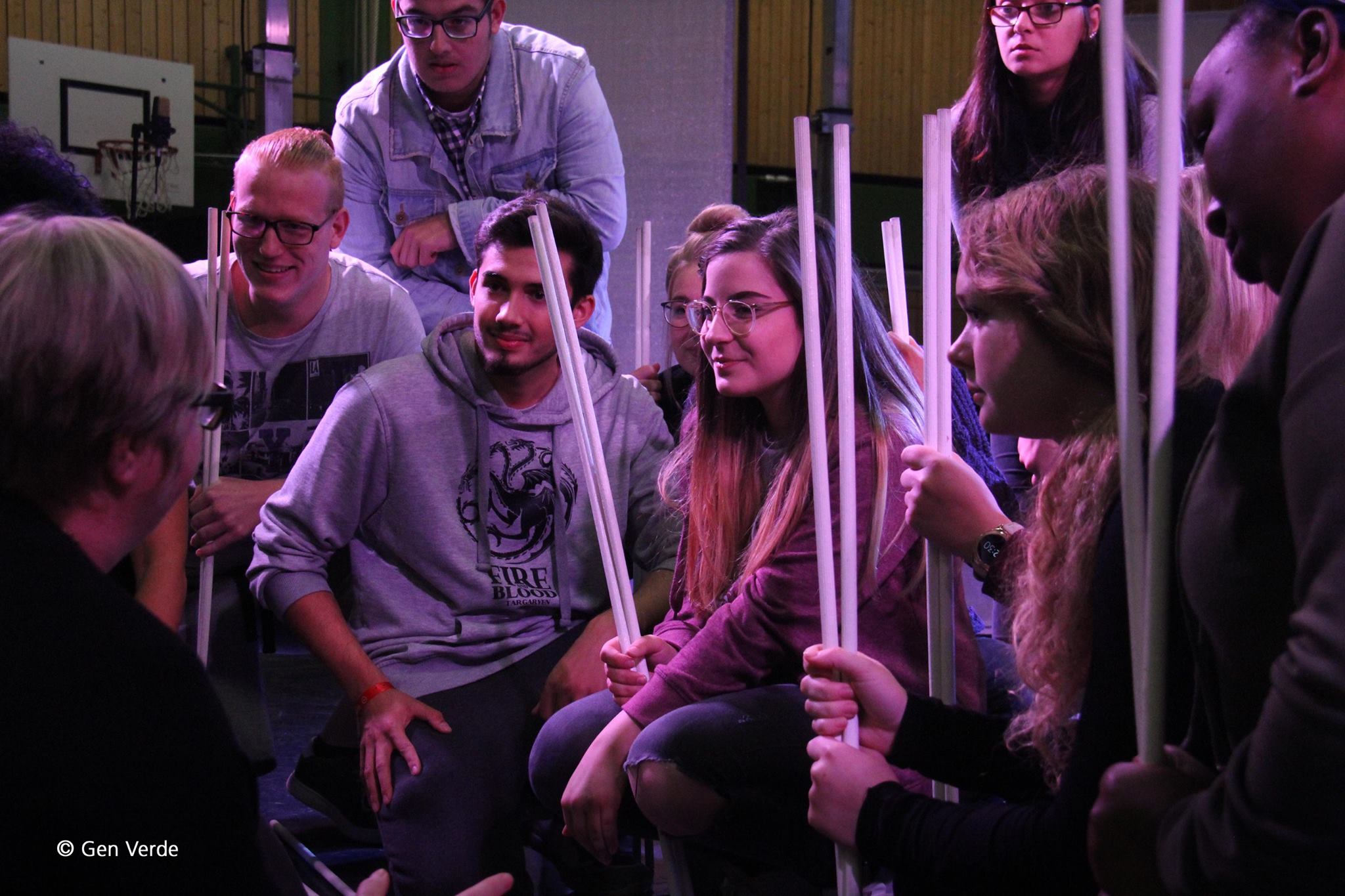 In every city, during the final show, the same miracle came about though with different characteristics: changes in life, atmosphere of deep fraternity, and the involvement even of those who were initially reluctant. “It is incredible what one can do in just two days!” exclaimed a still incredulous girl. And a young boy: “The errors did not paralyse us, but rather, we were encouraged to go on.” Particularly in Mannheim, Gen Verde met people who had suffered such heartbreaking pain, and had been subjected to barbarous treatment or had lost all their possessions. The group members recounted: “We went to visit them where they live, and they shared their stories with us. During the soiree, when we sang “Who will cry for you,” many relived moments of the tragedies they had undergone.” And the words “No one is a stranger to me” resounded like never before. Fotogallery
In every city, during the final show, the same miracle came about though with different characteristics: changes in life, atmosphere of deep fraternity, and the involvement even of those who were initially reluctant. “It is incredible what one can do in just two days!” exclaimed a still incredulous girl. And a young boy: “The errors did not paralyse us, but rather, we were encouraged to go on.” Particularly in Mannheim, Gen Verde met people who had suffered such heartbreaking pain, and had been subjected to barbarous treatment or had lost all their possessions. The group members recounted: “We went to visit them where they live, and they shared their stories with us. During the soiree, when we sang “Who will cry for you,” many relived moments of the tragedies they had undergone.” And the words “No one is a stranger to me” resounded like never before. Fotogallery
https://vimeo.com/236654355
Oct 19, 2017 | Focolare Worldwide
The clashes have started again and the tension is high. On 22 September and 1 October the army suppressed the peaceful demonstrations, killing and wounding some of the protesters who were asking for the independence of the British-speaking regions. That same day in the Northwest and Southwest Regions (inhabited by an English minority, 20 % of Cameroon’s population), once again internet was cut off. The “English-speaking issue” is well rooted in the past. In October 2016, the English-speaking population had started to hold organized protests against its progressive marginalisation. After months of tensions and accusations of discrimination, violent repressions followed, with real guerilla actions. Fr. Antonio Mascia writes from Fontem: “This is a delicate and uncertain time from the socio-political point of view, and we do not know where it will lead to. In various cities, soldiers of the army shot at the crowd that was peacefully demonstrating and many people were arrested. We are counting on your prayers.”
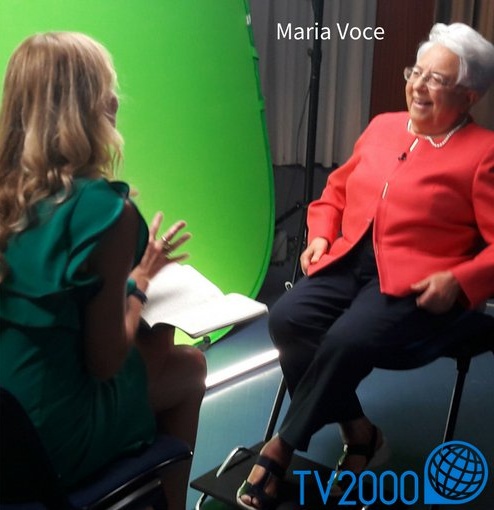
Oct 19, 2017 | Non categorizzato
 “Soul” is the name of a television program that seeks “to go deep into the soul” of key figures of our times who have a great depth of human and cultural experience. On Sunday, September 24th, Monica Mondo, the show’s presenter, conducted an interview with Maria Voce. A group of girls in Trent . . . a disastrous context of war. “An inspiration had made Chiara Lubich understand the need for an eternal ideal that doesn’t pass away. This ideal is God.” These were the first words by the Focolare president, Maria Voce, during an interview that ranged from the origins of the Focolare Movement to its current challenges. It is the only Movement in the ecclesial world that, according to its Statutes, must be led by a woman. “The recognition of women is much simpler than we think. It means recognizing their specific characteristics without which people cannot express themselves. God created humankind in his image and likeness, and he created it distinctly, man and woman, to create humanity in them. The woman’s role is very important. It’s her femininity, her capacity to give herself and be disposed to sacrifice.” Referring to her personal experience, Maria Voce explained, “I come from a traditional practising Catholic family. The problem started when I decided to give myself to God. My father was quite attached to me and had many plans for me. Being the first of seven children, it was also normal for me to think; I will get married and have many children. The Movement made it possible for me to live the Gospel in its entirety. It changed my life. I continued to practice law in my region, but I began to meet my clients seeing them as neighbours I could love. This was the transformation in my life. When I was in the focolare community in Turkey, my father wrote me for the first time on my birthday, ‘Best wishes! Dad’. A few days later, he died of a heart attack. I felt it was God’s love that had reconciled him to my choice in life.” What is a “hearth” (focolare), a house? “It’s a group of people who live together, all called by God to the same vocation, each being ready to give their life for the others, moment by moment – in order to be Work of Mary. The greatest work Mary did was to give Jesus to the world. The men and women focolarini want to relive Mary by having the living presence of Jesus among them through mutual love.” Virginity is a word that is not in vogue nowadays. “Virginity is the answer to a calling. Out of love, Jesus calls someone to an infinite love; and infinite does not have parts, the infinite is everything. If God calls with this love, the answer can only be an all-encompassing love. To live marriage, too, you need to be virgins at heart.” Chiara Lubich gave you another name. A strange name, the name of a place? “Yes. Emmaus. It expresses the desire and the effort to enable Jesus to be present even after his death and Resurrection, and to walk with Him.” Succeeding a founder is not easy. It is difficult to reconcile faithfulness and contemporising of a charism. “The inspiration lies in the charism. The charism is eternal; people pass away. Chiara Lubich lived this charism to the full in her times, and she has handed it on to us. We are united to the source, but now the question we ask is; ‘What would Chiara say today?’ This is what guides my actions. It’s not repetition; there are many things now that weren’t there in Chiara’s day.” Is this still the age of Movements? “The Movements have characteristics that foster Christian life. They still have much to say and give, not only for young people but for the health of families.” Catholics involved in politics and Europe. What is your view? “If Europe forgets its Christian roots, it will disappear. Therefore, it is important for Catholics to work in politics, to revalue their Christian roots, recognizing the equal dignity of other people, because we are all sons and daughters of God. You can dialogue with everybody, whatever their creed, because you dialogue with people. Loving our enemies is still part of the Gospel!” Is there still the capacity to come up with places, experiences, and new ways? “We don’t need to create new things, but to renew the world with the charism we have. I think of the people from the Movement, from all walks of life, who decide to give up their vacations to travel to the Amazon, to share the Gospel life with people there; or who move to another place in order to build a school for poor children.” How do you distinguish between witness, evangelization and dialogue, without imposing ideas or being combative? “We should proclaim Christ first and foremost with our life. If our life witnesses to Christ, eventually other people will become interested in knowing what is at the root of it. The unity [we speak of] is the one the Gospel talks about, it is unity in God, with which each one identifies, because all are children of God and brothers and sisters to one another. If there is not this foundation, then you cannot talk about unity, but mutual understanding. Unity comes from God and is in God. You can experience it with people who aren’t of the same faith or do not have the same way of seeing things, but who are willing to join together for a greater ideal, that of being brothers and sisters.” Do Catholics hide themselves too much? “They need to be more incisive. Perhaps one of the fruits of the Movement is to reawaken the Christian DNA we bring with us from Baptism.” You still have a lawyer’s attitude! If you had to defend a cause right now, what cause would you devote yourself to with the greatest passion? Maria Voce did not hesitate to say, “Universal brotherhood.” Read the full interview https://youtu.be/WzIuz75PTMM
“Soul” is the name of a television program that seeks “to go deep into the soul” of key figures of our times who have a great depth of human and cultural experience. On Sunday, September 24th, Monica Mondo, the show’s presenter, conducted an interview with Maria Voce. A group of girls in Trent . . . a disastrous context of war. “An inspiration had made Chiara Lubich understand the need for an eternal ideal that doesn’t pass away. This ideal is God.” These were the first words by the Focolare president, Maria Voce, during an interview that ranged from the origins of the Focolare Movement to its current challenges. It is the only Movement in the ecclesial world that, according to its Statutes, must be led by a woman. “The recognition of women is much simpler than we think. It means recognizing their specific characteristics without which people cannot express themselves. God created humankind in his image and likeness, and he created it distinctly, man and woman, to create humanity in them. The woman’s role is very important. It’s her femininity, her capacity to give herself and be disposed to sacrifice.” Referring to her personal experience, Maria Voce explained, “I come from a traditional practising Catholic family. The problem started when I decided to give myself to God. My father was quite attached to me and had many plans for me. Being the first of seven children, it was also normal for me to think; I will get married and have many children. The Movement made it possible for me to live the Gospel in its entirety. It changed my life. I continued to practice law in my region, but I began to meet my clients seeing them as neighbours I could love. This was the transformation in my life. When I was in the focolare community in Turkey, my father wrote me for the first time on my birthday, ‘Best wishes! Dad’. A few days later, he died of a heart attack. I felt it was God’s love that had reconciled him to my choice in life.” What is a “hearth” (focolare), a house? “It’s a group of people who live together, all called by God to the same vocation, each being ready to give their life for the others, moment by moment – in order to be Work of Mary. The greatest work Mary did was to give Jesus to the world. The men and women focolarini want to relive Mary by having the living presence of Jesus among them through mutual love.” Virginity is a word that is not in vogue nowadays. “Virginity is the answer to a calling. Out of love, Jesus calls someone to an infinite love; and infinite does not have parts, the infinite is everything. If God calls with this love, the answer can only be an all-encompassing love. To live marriage, too, you need to be virgins at heart.” Chiara Lubich gave you another name. A strange name, the name of a place? “Yes. Emmaus. It expresses the desire and the effort to enable Jesus to be present even after his death and Resurrection, and to walk with Him.” Succeeding a founder is not easy. It is difficult to reconcile faithfulness and contemporising of a charism. “The inspiration lies in the charism. The charism is eternal; people pass away. Chiara Lubich lived this charism to the full in her times, and she has handed it on to us. We are united to the source, but now the question we ask is; ‘What would Chiara say today?’ This is what guides my actions. It’s not repetition; there are many things now that weren’t there in Chiara’s day.” Is this still the age of Movements? “The Movements have characteristics that foster Christian life. They still have much to say and give, not only for young people but for the health of families.” Catholics involved in politics and Europe. What is your view? “If Europe forgets its Christian roots, it will disappear. Therefore, it is important for Catholics to work in politics, to revalue their Christian roots, recognizing the equal dignity of other people, because we are all sons and daughters of God. You can dialogue with everybody, whatever their creed, because you dialogue with people. Loving our enemies is still part of the Gospel!” Is there still the capacity to come up with places, experiences, and new ways? “We don’t need to create new things, but to renew the world with the charism we have. I think of the people from the Movement, from all walks of life, who decide to give up their vacations to travel to the Amazon, to share the Gospel life with people there; or who move to another place in order to build a school for poor children.” How do you distinguish between witness, evangelization and dialogue, without imposing ideas or being combative? “We should proclaim Christ first and foremost with our life. If our life witnesses to Christ, eventually other people will become interested in knowing what is at the root of it. The unity [we speak of] is the one the Gospel talks about, it is unity in God, with which each one identifies, because all are children of God and brothers and sisters to one another. If there is not this foundation, then you cannot talk about unity, but mutual understanding. Unity comes from God and is in God. You can experience it with people who aren’t of the same faith or do not have the same way of seeing things, but who are willing to join together for a greater ideal, that of being brothers and sisters.” Do Catholics hide themselves too much? “They need to be more incisive. Perhaps one of the fruits of the Movement is to reawaken the Christian DNA we bring with us from Baptism.” You still have a lawyer’s attitude! If you had to defend a cause right now, what cause would you devote yourself to with the greatest passion? Maria Voce did not hesitate to say, “Universal brotherhood.” Read the full interview https://youtu.be/WzIuz75PTMM

Oct 18, 2017 | Non categorizzato
 We wish to express our joy and relief to hear about Fr Maurizio Pallù‘s release last night, shortly before midnight,in Nigeria, The Italian priest, who belongs to the Neocatechumenal Way, was abducted on 12 October on his way to Benin City. He has been working in the African nation for three years following a long experience as a missionary in different parts of the world. The confirmation of his release was announced by the Italian Foreign Minister.
We wish to express our joy and relief to hear about Fr Maurizio Pallù‘s release last night, shortly before midnight,in Nigeria, The Italian priest, who belongs to the Neocatechumenal Way, was abducted on 12 October on his way to Benin City. He has been working in the African nation for three years following a long experience as a missionary in different parts of the world. The confirmation of his release was announced by the Italian Foreign Minister.
Oct 18, 2017 | Non categorizzato
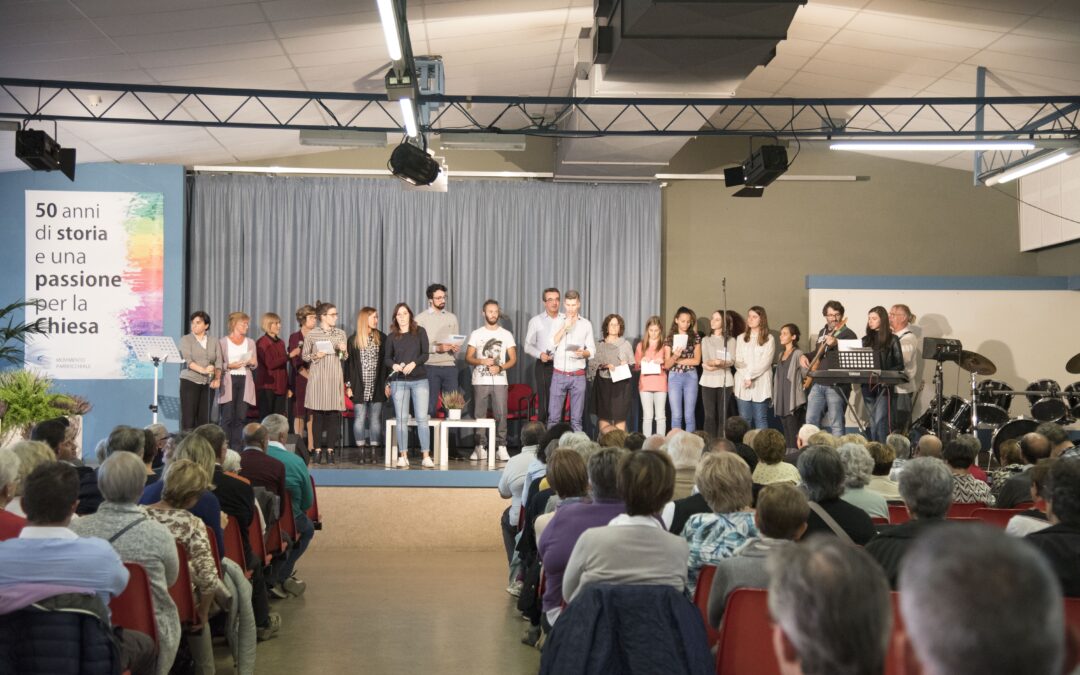
Oct 17, 2017 | Non categorizzato
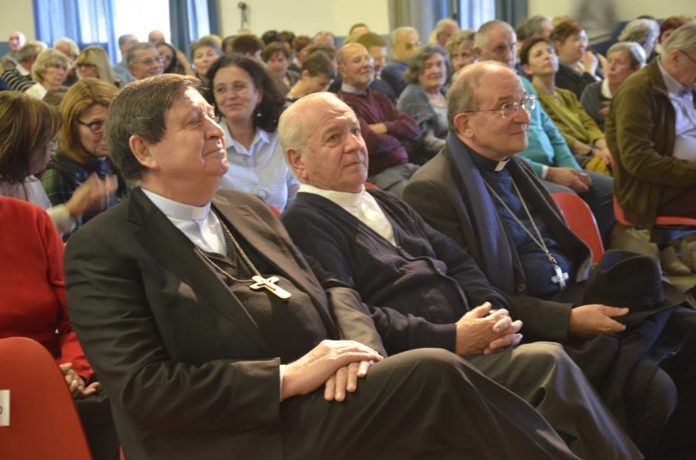 The picturesque setting with mountains all around was a welcoming scene that embraced all the people that went up the Val di Lanzo for the celebration of the 50th anniversary of the founding of the Parish Movement. The event was titled 50 Years of Passion for the Church and was held at the Maria Orsola Centre, which was filled to the brim with people from the area. Among them was Cardinal card. João Bráz de Aviz, Prefect of the Congregation for Institutes of Consecrated Life and Apostolic Life; along with Giuseppe Petrocchi, Archbishop of Aquila. In her message, Focolare president, Maria Voce, mentioned how fifty years before, in Vallo, one of the first communities gathered with Archbishop Vincenzo Chiarle to live the Focolare’s spirituality of communion and give “witness to an authentic lifestyle of the Gospel in the context of a parish, renewing spirits and structures.” They were a model of a “living church,” according to the definition of Archbishop Petrocchi, small in size, but great in spirit and in service. An example of holiness emerged from the community, the sixteen year-old Maria Orsola, now on her way to official recognition as a model of holiness.
The picturesque setting with mountains all around was a welcoming scene that embraced all the people that went up the Val di Lanzo for the celebration of the 50th anniversary of the founding of the Parish Movement. The event was titled 50 Years of Passion for the Church and was held at the Maria Orsola Centre, which was filled to the brim with people from the area. Among them was Cardinal card. João Bráz de Aviz, Prefect of the Congregation for Institutes of Consecrated Life and Apostolic Life; along with Giuseppe Petrocchi, Archbishop of Aquila. In her message, Focolare president, Maria Voce, mentioned how fifty years before, in Vallo, one of the first communities gathered with Archbishop Vincenzo Chiarle to live the Focolare’s spirituality of communion and give “witness to an authentic lifestyle of the Gospel in the context of a parish, renewing spirits and structures.” They were a model of a “living church,” according to the definition of Archbishop Petrocchi, small in size, but great in spirit and in service. An example of holiness emerged from the community, the sixteen year-old Maria Orsola, now on her way to official recognition as a model of holiness. 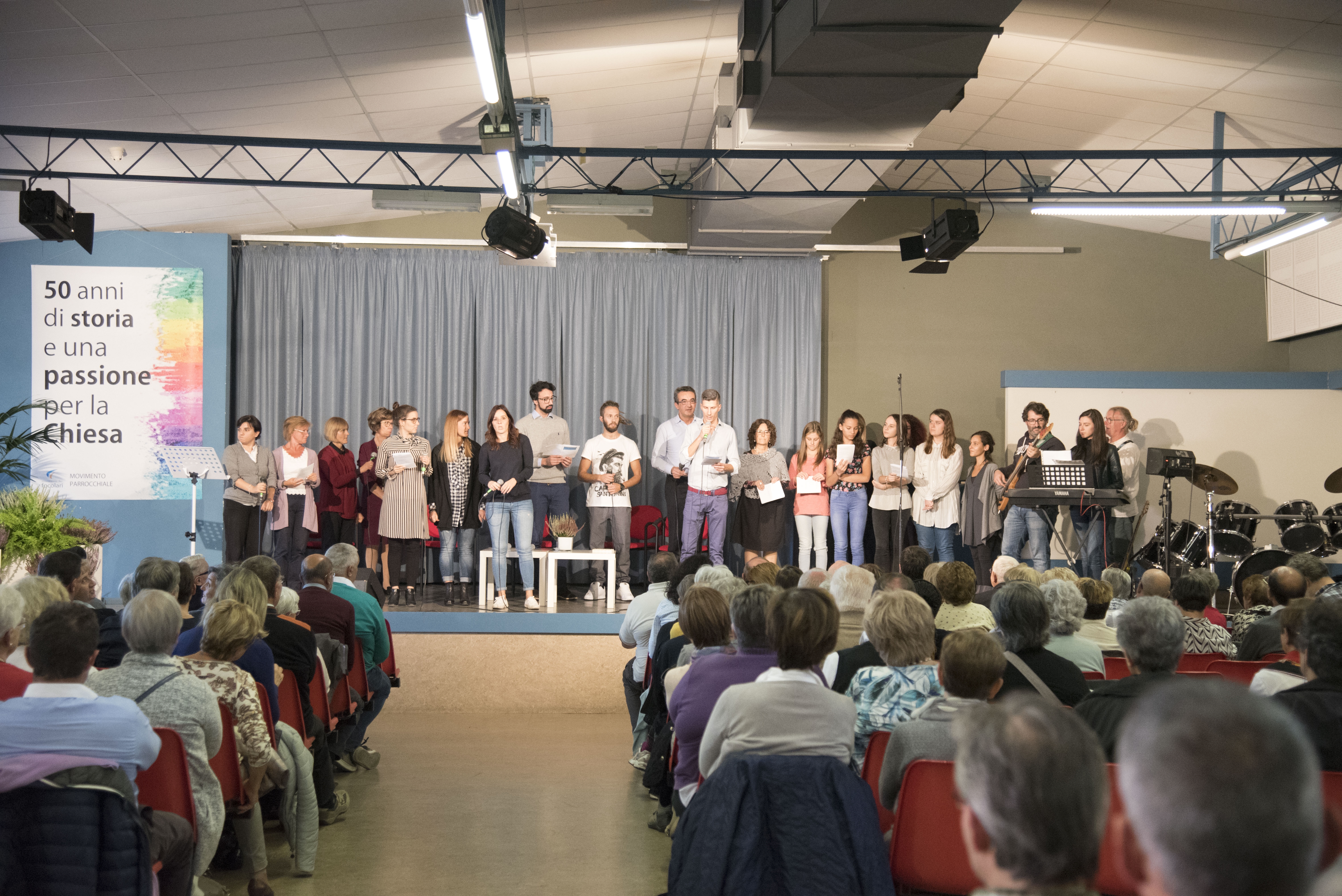 From the intuition of Chiara Lubich going back to the late 1940s regarding the influence that the spirituality of unity would have on parish communities, to the historic meeting with Paul VI in 1967, which marks the official beginnings, the history of the Parish Movement was described by the first witnesses. The commitment continues. Vallo continues to be a popular destination for groups of young people and communities because of the spirituality of communion that is lived there. Today Vallo welcomes many communities from all the regions of Italy and the world. Bruno and Luisa, one married couple from Genoa, Italy, share their testimony of active involvement in strict unity with their pastor. The experience of Luca was very touching. Thanks to the support of the young people from his parish, he was able to transform the unexpected side effects of a road accident, into a rediscovery of prayer and the precious value of life. As Archbishop of Turin, Cesare Nosiglia commented in his open address, celebrating 50 years of life means to go back to the roots and keep moving on towards the new challenges. Carla Cotignoli
From the intuition of Chiara Lubich going back to the late 1940s regarding the influence that the spirituality of unity would have on parish communities, to the historic meeting with Paul VI in 1967, which marks the official beginnings, the history of the Parish Movement was described by the first witnesses. The commitment continues. Vallo continues to be a popular destination for groups of young people and communities because of the spirituality of communion that is lived there. Today Vallo welcomes many communities from all the regions of Italy and the world. Bruno and Luisa, one married couple from Genoa, Italy, share their testimony of active involvement in strict unity with their pastor. The experience of Luca was very touching. Thanks to the support of the young people from his parish, he was able to transform the unexpected side effects of a road accident, into a rediscovery of prayer and the precious value of life. As Archbishop of Turin, Cesare Nosiglia commented in his open address, celebrating 50 years of life means to go back to the roots and keep moving on towards the new challenges. Carla Cotignoli
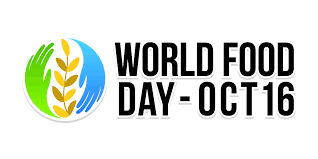
Oct 16, 2017 | Non categorizzato
 Established by FAO (Food and Agriculture Organization) of the United Nations, World Food Day is celebrated annually on 16 October to raise public awareness regarding poverty, hunger and malnutrition in the world, as well as issues regarding food safety and methods to improve agricultural productivity. This year the theme is focused on: “Change the future of migration. Invest in food security and rural development.”. During an official visit to the FAO headquarters in Rome, Pope Francis reminded everyone this morning that “all human beings have the right to, without having to part from their loved ones.” “Faced with such a goal,” he said, “the credibility of the entire international system is at stake. (…) It is therefore urgent to find new paths, to transform the possibilities available to us into a guarantee that permits each person to look to the future with well-founded trust and not only with desire.” Significantly, In the entrance hall, the sculpture donated by the Holy Father to the FAO was unveiled, depicting the small Syrian who drowned at the beach in Bodrum,Turkey. A warning not to forget.
Established by FAO (Food and Agriculture Organization) of the United Nations, World Food Day is celebrated annually on 16 October to raise public awareness regarding poverty, hunger and malnutrition in the world, as well as issues regarding food safety and methods to improve agricultural productivity. This year the theme is focused on: “Change the future of migration. Invest in food security and rural development.”. During an official visit to the FAO headquarters in Rome, Pope Francis reminded everyone this morning that “all human beings have the right to, without having to part from their loved ones.” “Faced with such a goal,” he said, “the credibility of the entire international system is at stake. (…) It is therefore urgent to find new paths, to transform the possibilities available to us into a guarantee that permits each person to look to the future with well-founded trust and not only with desire.” Significantly, In the entrance hall, the sculpture donated by the Holy Father to the FAO was unveiled, depicting the small Syrian who drowned at the beach in Bodrum,Turkey. A warning not to forget.
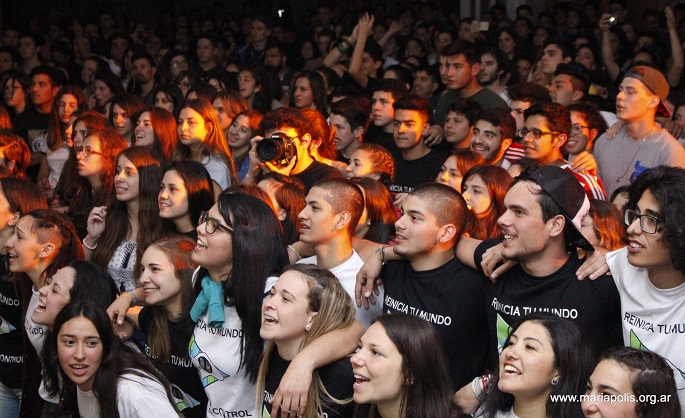
Oct 16, 2017 | Focolare Worldwide
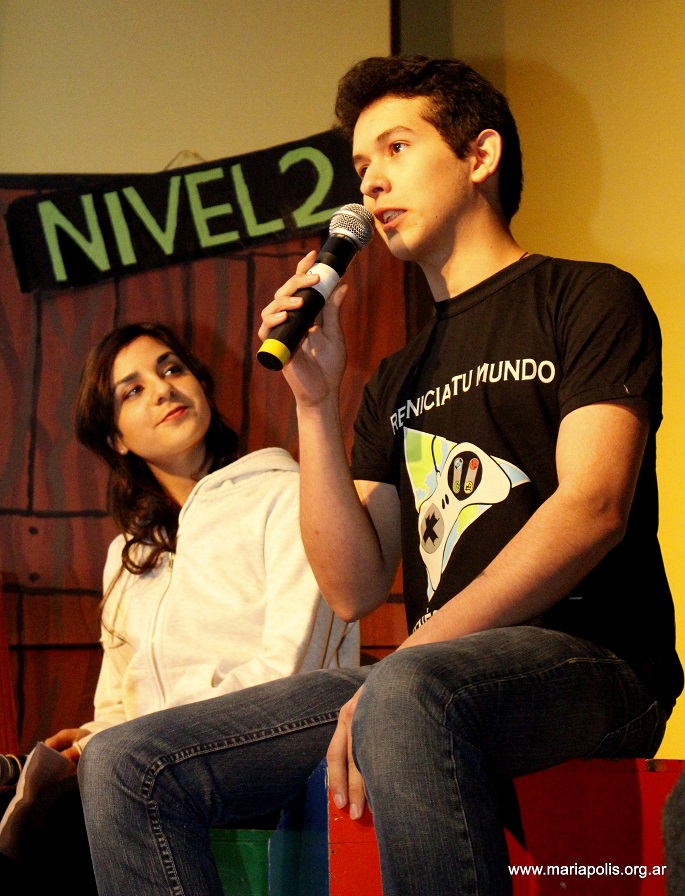 Once again this year the Youth Fest that coincides with the start of spring in the southern hemisphere, has made its mark. On September 23 and 24 more than a thousand young people from Uruguay, Paraguay and several regions of Argentina took over the permanent Mariapolis immersed in the Argentinian Pampas, to have an experience of brotherhood. But this year they’re looking farther – to Manila where the 2018 Genfest will be held with young people from around the world.
Once again this year the Youth Fest that coincides with the start of spring in the southern hemisphere, has made its mark. On September 23 and 24 more than a thousand young people from Uruguay, Paraguay and several regions of Argentina took over the permanent Mariapolis immersed in the Argentinian Pampas, to have an experience of brotherhood. But this year they’re looking farther – to Manila where the 2018 Genfest will be held with young people from around the world. 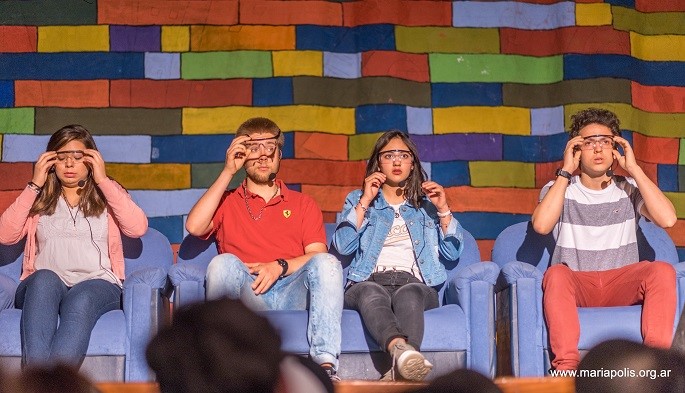 Using a video game format, the young people gradually confront some of the issues they have to face in their daily lives: appearance, individualism, choices and consumerism. These are the four levels that the four actors on stage have to pass through to overcome and reach the last level with each other’s help. The keys that get them through each level are: values such as self-acceptance, solidarity, effort with regard to what the conscience suggests to every one of us, and sharing. But often you need to take into account the past that draws you back and the future that can paralyse you. Only one option is left: to live the present and, in that moment, take control and reset your history.
Using a video game format, the young people gradually confront some of the issues they have to face in their daily lives: appearance, individualism, choices and consumerism. These are the four levels that the four actors on stage have to pass through to overcome and reach the last level with each other’s help. The keys that get them through each level are: values such as self-acceptance, solidarity, effort with regard to what the conscience suggests to every one of us, and sharing. But often you need to take into account the past that draws you back and the future that can paralyse you. Only one option is left: to live the present and, in that moment, take control and reset your history.  The inventor of the game leaves the actors and the Youth Fest participants with a question: Reset, yes or no? The answer is left open. The video game ends and becomes a metaphor for life that places the players in front of the possibility of going through the daily situations of life in order to grow and reach their personal goals. The game becomes real life. Reset your life, you’re in control is the slogan of the event which, with the help of songs that had been composed for the event, planted the message of the 2017 Youth Fest in the hearts of all the participants.
The inventor of the game leaves the actors and the Youth Fest participants with a question: Reset, yes or no? The answer is left open. The video game ends and becomes a metaphor for life that places the players in front of the possibility of going through the daily situations of life in order to grow and reach their personal goals. The game becomes real life. Reset your life, you’re in control is the slogan of the event which, with the help of songs that had been composed for the event, planted the message of the 2017 Youth Fest in the hearts of all the participants.
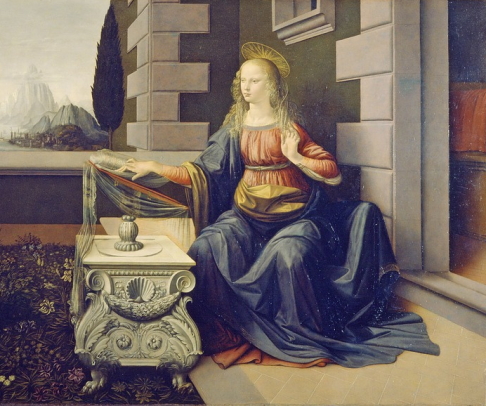
Oct 14, 2017 | Non categorizzato
 “Mary treasured all these things and pondered them in her heart” (Lk 2:19). This statement is from Luke’s Gospel where the evangelist includes it in the wonderful description of the shepherds at the grotto of Bethlehem where Jesus was born. An angel had informed the shepherds of the amazing event: “Fear not! I bring you tidings of great joy that will be for the whole people, for unto you is born this day in the city of David, a Saviour” (Lk 2:10-11). As soon as they reach the place, “they told all that had been said to them concerning the boy; and all who heard it were amazed at what the shepherds said. But Mary treasured all these things and pondered them in her heart” (Lk 2:19). Luke gently contrasts the outward amazement of the others who are at the grotto – shepherds, perhaps townspeople – to the dense loving and faith-filled silence of Mary. The words of those simple pilgrims to the first Marian shrine on earth, enter her soul, taking their place alongside the other revelations that she had received, and they make her understand more and more the mystery that is unfolding before her very eyes, a mystery she shares in as Mother of God. One can only Mary’s instant willingness to respond to God’s word and loving guardianship of the sacred gifts she received, but never disclosed to anyone for many years. Perhaps it was only to Luke that Our Lady personally told about this attitude of her soul during the days around the Saviour’s birth. Only she could have known it. We are so in need of the comforting sweetness of God’s gifts today. In the stressful, frenzied rhythm of these times, we run the risk of materialising everything even the life of the spirit. Silence, humility, reserve, meekness, patience in trial, can seem like obsolete virtues that are no longer viable, no longer able to allow the presence of Christianity to be felt in this century. We believe more in loudspeakers than in an edifying sentence from the Gospel. One believes more in the speeches of orators than in the prayerful silence of souls consecrated to God. First of all, the aggressiveness of the wicked and the power of their possibilities attempts to to leverage the aggressiveness of the good with their capital and power. It’s materialism that seeks to demean the values of the spirit, turning them into external expressions that will no longer carry any weight amidst the deafening deafening noise all around them. Only what is the fruit of the spirit has value in front of a world flattened by materialism; only what is part of our deep and personal love for God. For this reason humankind must once more fix its gaze on Mary.” Pasquale Foresi, “Parole di vita”, (Rome: Ed. Città Nuova, 1963) 15-17.
“Mary treasured all these things and pondered them in her heart” (Lk 2:19). This statement is from Luke’s Gospel where the evangelist includes it in the wonderful description of the shepherds at the grotto of Bethlehem where Jesus was born. An angel had informed the shepherds of the amazing event: “Fear not! I bring you tidings of great joy that will be for the whole people, for unto you is born this day in the city of David, a Saviour” (Lk 2:10-11). As soon as they reach the place, “they told all that had been said to them concerning the boy; and all who heard it were amazed at what the shepherds said. But Mary treasured all these things and pondered them in her heart” (Lk 2:19). Luke gently contrasts the outward amazement of the others who are at the grotto – shepherds, perhaps townspeople – to the dense loving and faith-filled silence of Mary. The words of those simple pilgrims to the first Marian shrine on earth, enter her soul, taking their place alongside the other revelations that she had received, and they make her understand more and more the mystery that is unfolding before her very eyes, a mystery she shares in as Mother of God. One can only Mary’s instant willingness to respond to God’s word and loving guardianship of the sacred gifts she received, but never disclosed to anyone for many years. Perhaps it was only to Luke that Our Lady personally told about this attitude of her soul during the days around the Saviour’s birth. Only she could have known it. We are so in need of the comforting sweetness of God’s gifts today. In the stressful, frenzied rhythm of these times, we run the risk of materialising everything even the life of the spirit. Silence, humility, reserve, meekness, patience in trial, can seem like obsolete virtues that are no longer viable, no longer able to allow the presence of Christianity to be felt in this century. We believe more in loudspeakers than in an edifying sentence from the Gospel. One believes more in the speeches of orators than in the prayerful silence of souls consecrated to God. First of all, the aggressiveness of the wicked and the power of their possibilities attempts to to leverage the aggressiveness of the good with their capital and power. It’s materialism that seeks to demean the values of the spirit, turning them into external expressions that will no longer carry any weight amidst the deafening deafening noise all around them. Only what is the fruit of the spirit has value in front of a world flattened by materialism; only what is part of our deep and personal love for God. For this reason humankind must once more fix its gaze on Mary.” Pasquale Foresi, “Parole di vita”, (Rome: Ed. Città Nuova, 1963) 15-17.
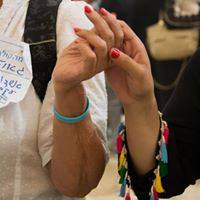
Oct 13, 2017 | Non categorizzato
 On 24 September, 30,000 women set out on a peace march from Sderot (Negev) to Jerusalem. The initiative, promoted by “Women Wage Peace” (WWP) included meetings, moments of dialogue and prayer. It ended on 11 October in Jerusalem. “Grassroots initiatives such as this one are important because they express a part of the Israeli people who do not want war, occupation, and to continue in this situation,” commented the Maronite Patriarchate of Jerusalem. The voice of these women fills the void left by an absence of political parties truly committed to peace, at a time of “political stagnation” due to the disinterest of the international community in the Palestinian issue. WWP was born three years ago in response to the conflict in Gaza, and currently numbers 24,000 members, including “thousands of women who belong to right, centre and left wing factions, who are Arab and Jewish, religious and lay, all united to seek a political peace agreement to end the Israeli-Palestinian conflict.” Prayer of the Mothers
On 24 September, 30,000 women set out on a peace march from Sderot (Negev) to Jerusalem. The initiative, promoted by “Women Wage Peace” (WWP) included meetings, moments of dialogue and prayer. It ended on 11 October in Jerusalem. “Grassroots initiatives such as this one are important because they express a part of the Israeli people who do not want war, occupation, and to continue in this situation,” commented the Maronite Patriarchate of Jerusalem. The voice of these women fills the void left by an absence of political parties truly committed to peace, at a time of “political stagnation” due to the disinterest of the international community in the Palestinian issue. WWP was born three years ago in response to the conflict in Gaza, and currently numbers 24,000 members, including “thousands of women who belong to right, centre and left wing factions, who are Arab and Jewish, religious and lay, all united to seek a political peace agreement to end the Israeli-Palestinian conflict.” Prayer of the Mothers
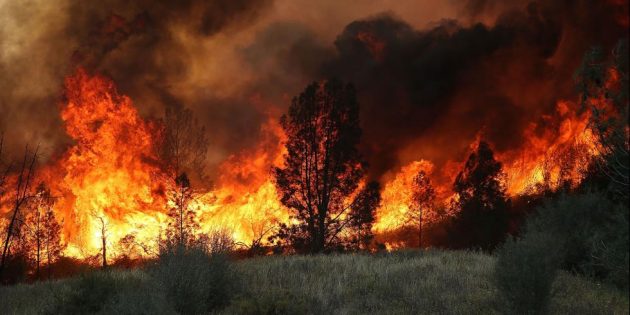
Oct 13, 2017 | Focolare Worldwide
 The untamed fires that are devastating parts of California, strengthened by the strong winds and unseasonable temperatures, have left dozens of victims, the largest number in the recorded history of California, along with hundreds of people who are missing. The number of volunteers and equipment is quite striking: more than 8 thousand fire-fighters and volunteers, 550 ground equipment, 73 helicopters and more than 30 air-planes. Images of the fires that are destroying more than 80,000 hectares are spreading around the world. Countless homes have been burnt down. The most devastated counties include Sonoma, Mendocino, Yuba and Napa. Thousands of people have already been evacuated, especially in Napa County, which is known for its wine vineyards. One of the most hit areas is Sonoma County where Santa Rosa is located, which is head location for more than 200 thousand inhabitants. Entire regions of the city have been reduced to ashes. From Santa Rosa, Cindy Fitzmaurice, from the Focolare community was able to send news through Facebook, concerning the difficult conditions that many are living in now that they’ve had to abandon their houses. “We’re ready to flee,” she writes, posting a photo taken around three o’clock in the morning, in which the sky appears orange. “My heart is in pieces for my friends who have lost everything. We’re learning what really matters, and it’s certainly not material things.” It’s been a hard experience for Cindy and her neighbours, fleeing the fires in the middle of the night, looking for shelter in the homes of friends. Some had to escape with nothing but their pyjamas, leaving everything else behind. Fortunately, she writes again: “Evacuated, but safe and sound. May God bless Santa Rosa. Leaving my house after 25 years was hard. But at least we had enough time to do it and, for this, we are eternally grateful. Other’s can’t say the same. We’ll see what tomorrow will bring.” Following a night of fear and praying, last Wednesday Cindy was able to tell her friends about the good news: “Feeling extremely grateful. We are back home this morning. “Feeling extremely grateful. We are back home this morning. For now. the winds shifted east overnight toward Napa. Good for us, but so bad for others. I can’t even imagine their loss. Cindy thanks her friends who take care of them, especially her elderly mother-in-law. “All we can do is be grateful and see how we can help others. Thank you all for your prayers.” Cindy’s 18 year old niece works at a nursing home: “All the residents were evacuated to anther city. I’m proud of how she’s taking care of all of them.” Many others have posted photos on Facebook of their houses devoured by the flames and reduced to ashes. But they’re grateful to be alive. This is what matters most.
The untamed fires that are devastating parts of California, strengthened by the strong winds and unseasonable temperatures, have left dozens of victims, the largest number in the recorded history of California, along with hundreds of people who are missing. The number of volunteers and equipment is quite striking: more than 8 thousand fire-fighters and volunteers, 550 ground equipment, 73 helicopters and more than 30 air-planes. Images of the fires that are destroying more than 80,000 hectares are spreading around the world. Countless homes have been burnt down. The most devastated counties include Sonoma, Mendocino, Yuba and Napa. Thousands of people have already been evacuated, especially in Napa County, which is known for its wine vineyards. One of the most hit areas is Sonoma County where Santa Rosa is located, which is head location for more than 200 thousand inhabitants. Entire regions of the city have been reduced to ashes. From Santa Rosa, Cindy Fitzmaurice, from the Focolare community was able to send news through Facebook, concerning the difficult conditions that many are living in now that they’ve had to abandon their houses. “We’re ready to flee,” she writes, posting a photo taken around three o’clock in the morning, in which the sky appears orange. “My heart is in pieces for my friends who have lost everything. We’re learning what really matters, and it’s certainly not material things.” It’s been a hard experience for Cindy and her neighbours, fleeing the fires in the middle of the night, looking for shelter in the homes of friends. Some had to escape with nothing but their pyjamas, leaving everything else behind. Fortunately, she writes again: “Evacuated, but safe and sound. May God bless Santa Rosa. Leaving my house after 25 years was hard. But at least we had enough time to do it and, for this, we are eternally grateful. Other’s can’t say the same. We’ll see what tomorrow will bring.” Following a night of fear and praying, last Wednesday Cindy was able to tell her friends about the good news: “Feeling extremely grateful. We are back home this morning. “Feeling extremely grateful. We are back home this morning. For now. the winds shifted east overnight toward Napa. Good for us, but so bad for others. I can’t even imagine their loss. Cindy thanks her friends who take care of them, especially her elderly mother-in-law. “All we can do is be grateful and see how we can help others. Thank you all for your prayers.” Cindy’s 18 year old niece works at a nursing home: “All the residents were evacuated to anther city. I’m proud of how she’s taking care of all of them.” Many others have posted photos on Facebook of their houses devoured by the flames and reduced to ashes. But they’re grateful to be alive. This is what matters most.
Oct 13, 2017 | Non categorizzato
In spite of the difficult social, political and economic situation across the country, dialogue among different Christian traditions has not waivered. The Focolare community in Caracas writes: “Last 14 Septmber we met at the focolare in Caracas with Anglican pastor Francisco Salazar and his wife and Pastor Coromoto Jimenez to spend some family time together. Pastor Salazar told us that the international conference in Rome last May was like “bumping across Jesus. There one found a new vision of unity and of the Church.” In Venezuela we are also holding several events to mark the 500th anniversary of the Reform. “On October 1st we were invited to a concert celebration at the Lutheran Church of Caracas with more than 200 people, including three Lutheran pastors, the ambassador of Germany and representatives from the Presbyterian and Catholic Churches. It was a solemn event with songs, memories and quotes from Luther, which witnessed to unity in diversity. One pastor remarked: “We have to unite more and more, we have the same faith in Jesus.” On November 19, the Presbyterian Church in Venezuela will mark 120 years. “They are inviting bishops, priests and Focolare members to celebrate the occasion with them. A real friendship has been formed with Pastor Maria Jimenez and her husband uriel Ramirez.”
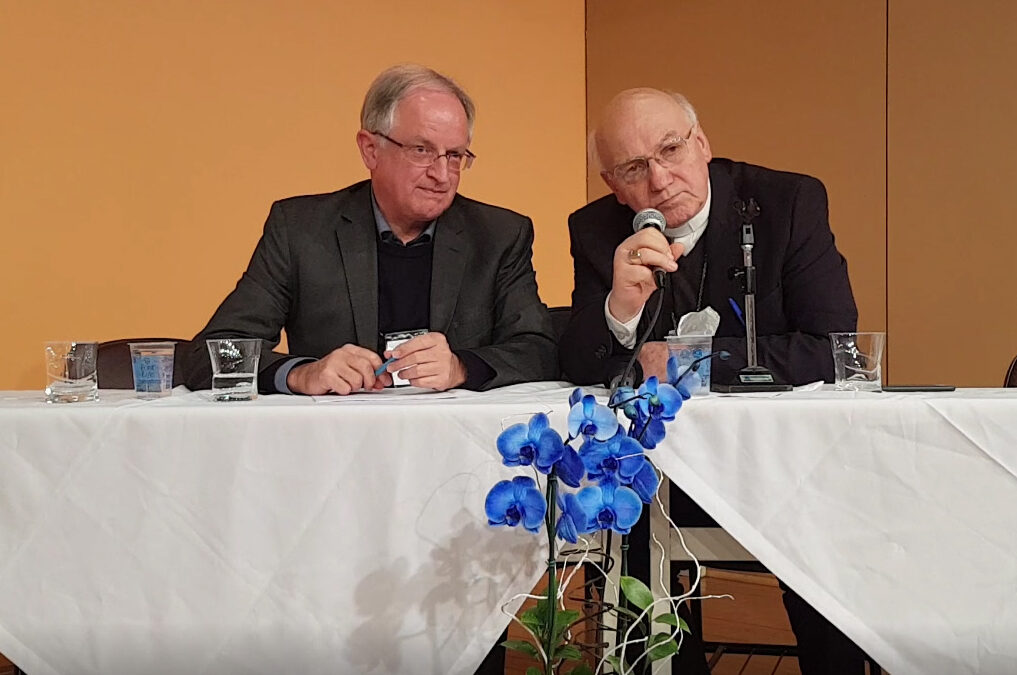
Oct 13, 2017 | Focolare Worldwide
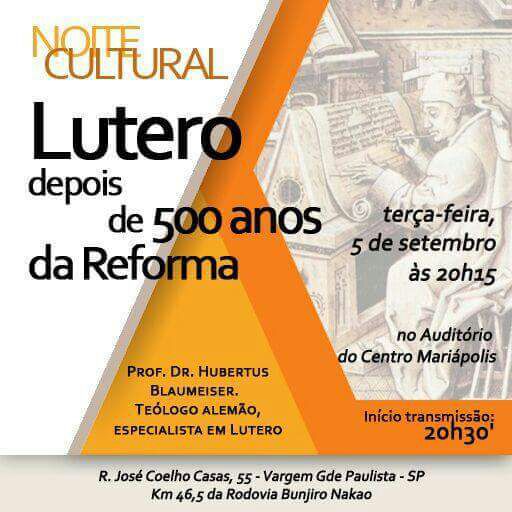 Curitiba, capital of the state of Paraná (Southern Brazil), is a city that holds many records: it has the highest educational index rates of the country, the lowest illiteracy rates and a high quality of education (The Federal University is the first in Brazil). It is considered the most eco-sustainable Brazilian city, thanks to innovative plans that have reconciled urban growth with care for the environment. In this “primacy city”, an important step was taken in the long and fruitful ecumenical journey between Catholics and Lutherans. The Commission for ecumenism and interreligious dialogue of the National Conference of Bishops of Brazil (CNBB) and the Commission for bilateral Catholic-Lutheran dialogue, in collaboration with Catholic University of Paraná (PUCPR), chose the “green city” as the venue of the Ecumenical Marian Symposium, from 1 to 3 September.
Curitiba, capital of the state of Paraná (Southern Brazil), is a city that holds many records: it has the highest educational index rates of the country, the lowest illiteracy rates and a high quality of education (The Federal University is the first in Brazil). It is considered the most eco-sustainable Brazilian city, thanks to innovative plans that have reconciled urban growth with care for the environment. In this “primacy city”, an important step was taken in the long and fruitful ecumenical journey between Catholics and Lutherans. The Commission for ecumenism and interreligious dialogue of the National Conference of Bishops of Brazil (CNBB) and the Commission for bilateral Catholic-Lutheran dialogue, in collaboration with Catholic University of Paraná (PUCPR), chose the “green city” as the venue of the Ecumenical Marian Symposium, from 1 to 3 September. 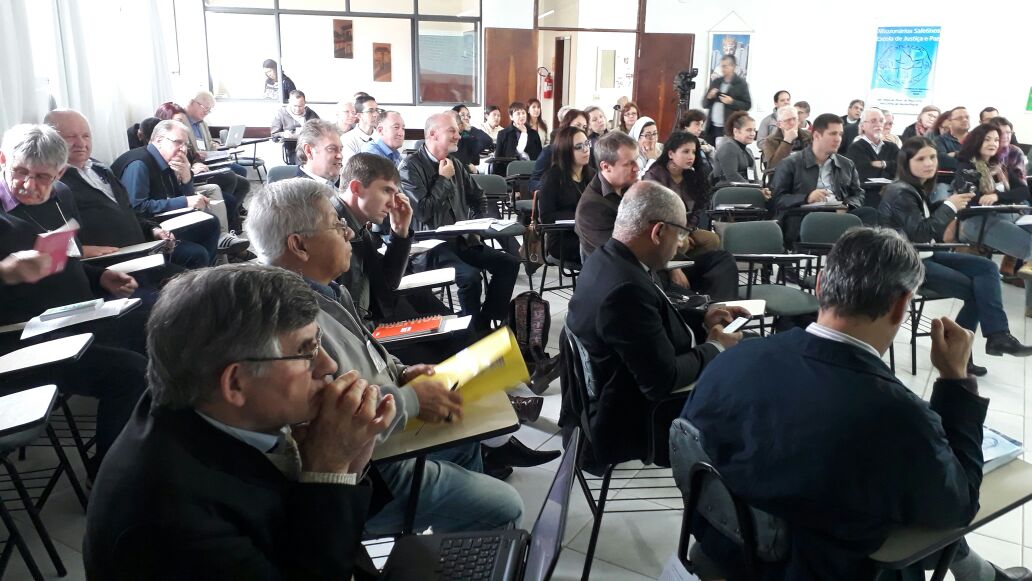 The occasion arose from two important anniversaries. The first was the third centenary of the salvaging of the statue of Our Lady of Aparecida from the waters of the Paraiba do Sul river. The Brazilian people are very familiar with the story of the group of poor fishermen who in 1717, in view of the banquet organized for the imminent visit of the governor of the São Paolo Province, after an unsuccessful day of fishing, again launched their nets into the river. To their surprise, they found a small muddy statue of “Our Lady,” first the body and then the head, entangled in their nets. Upon throwing their nets once again, these were unexpectedly filled with a great amount of fish. It was the first of a long series of miracles obtained from the “Black Virgin,” who subsequently became the patron of the Brazilian people. The second anniversary was the 5th centennial of the Protestant Reformation. The celebrations were jointly carried out with the historical event of Lund in October 2016, by the Catholic and Lutheran churches, in a spirit of communion, dialogue and thanksgiving. The Curitiba Symposium is thus part of an important ecumenical path.
The occasion arose from two important anniversaries. The first was the third centenary of the salvaging of the statue of Our Lady of Aparecida from the waters of the Paraiba do Sul river. The Brazilian people are very familiar with the story of the group of poor fishermen who in 1717, in view of the banquet organized for the imminent visit of the governor of the São Paolo Province, after an unsuccessful day of fishing, again launched their nets into the river. To their surprise, they found a small muddy statue of “Our Lady,” first the body and then the head, entangled in their nets. Upon throwing their nets once again, these were unexpectedly filled with a great amount of fish. It was the first of a long series of miracles obtained from the “Black Virgin,” who subsequently became the patron of the Brazilian people. The second anniversary was the 5th centennial of the Protestant Reformation. The celebrations were jointly carried out with the historical event of Lund in October 2016, by the Catholic and Lutheran churches, in a spirit of communion, dialogue and thanksgiving. The Curitiba Symposium is thus part of an important ecumenical path.
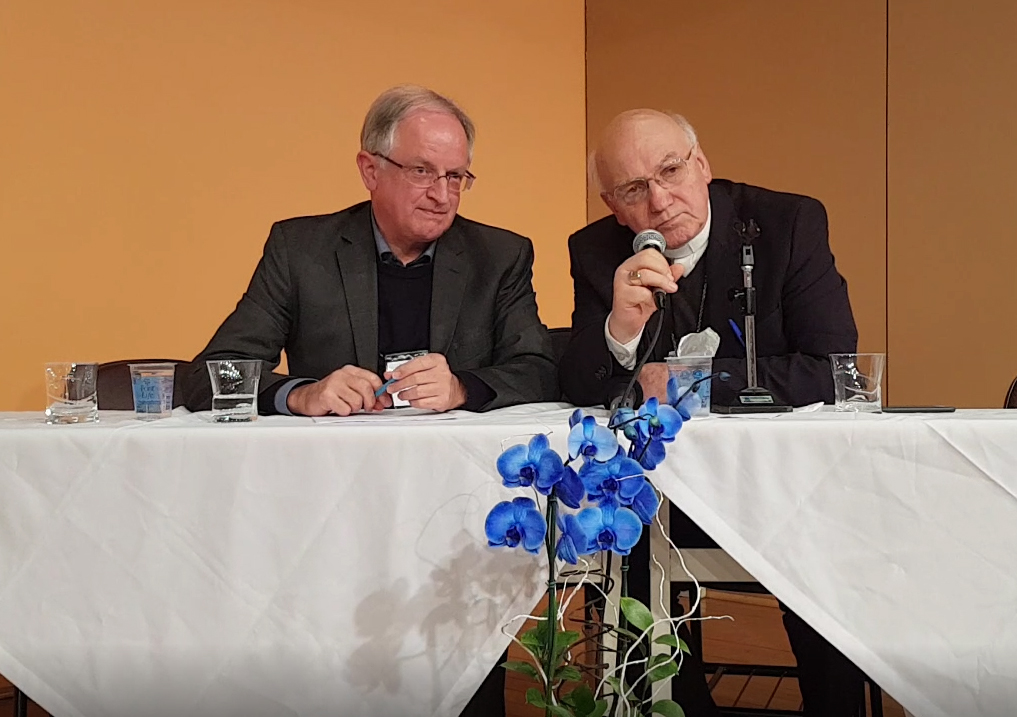
Fr Hubertus Blaumeiser and Bishop Dom Biasin, President of the Ecumenical Commission.
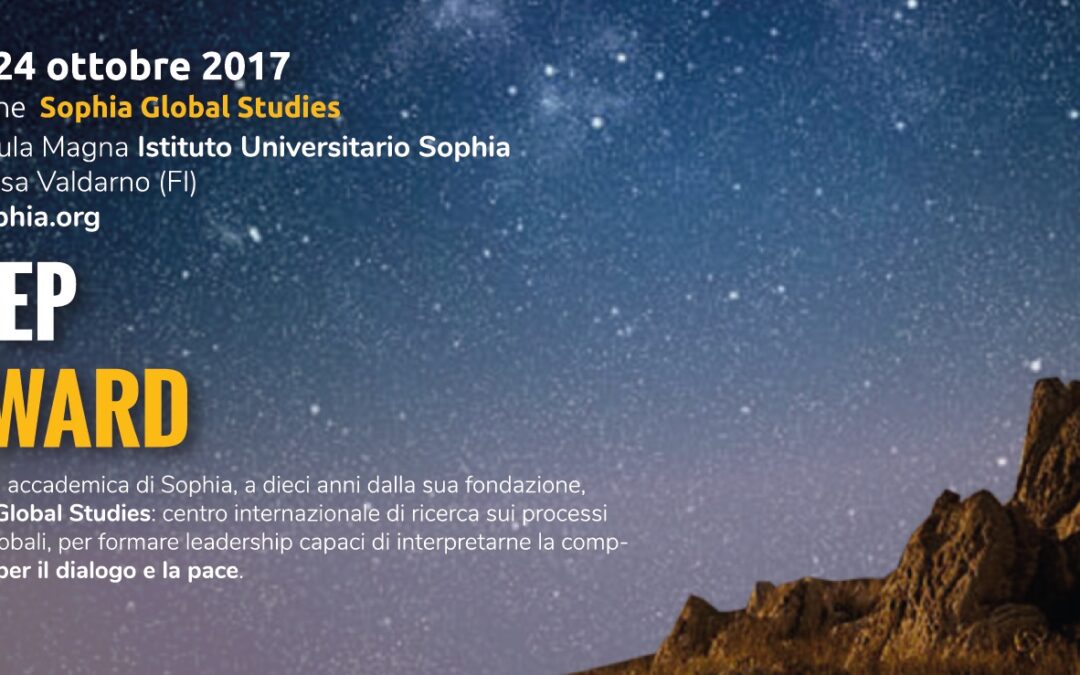
Oct 12, 2017 | Non categorizzato
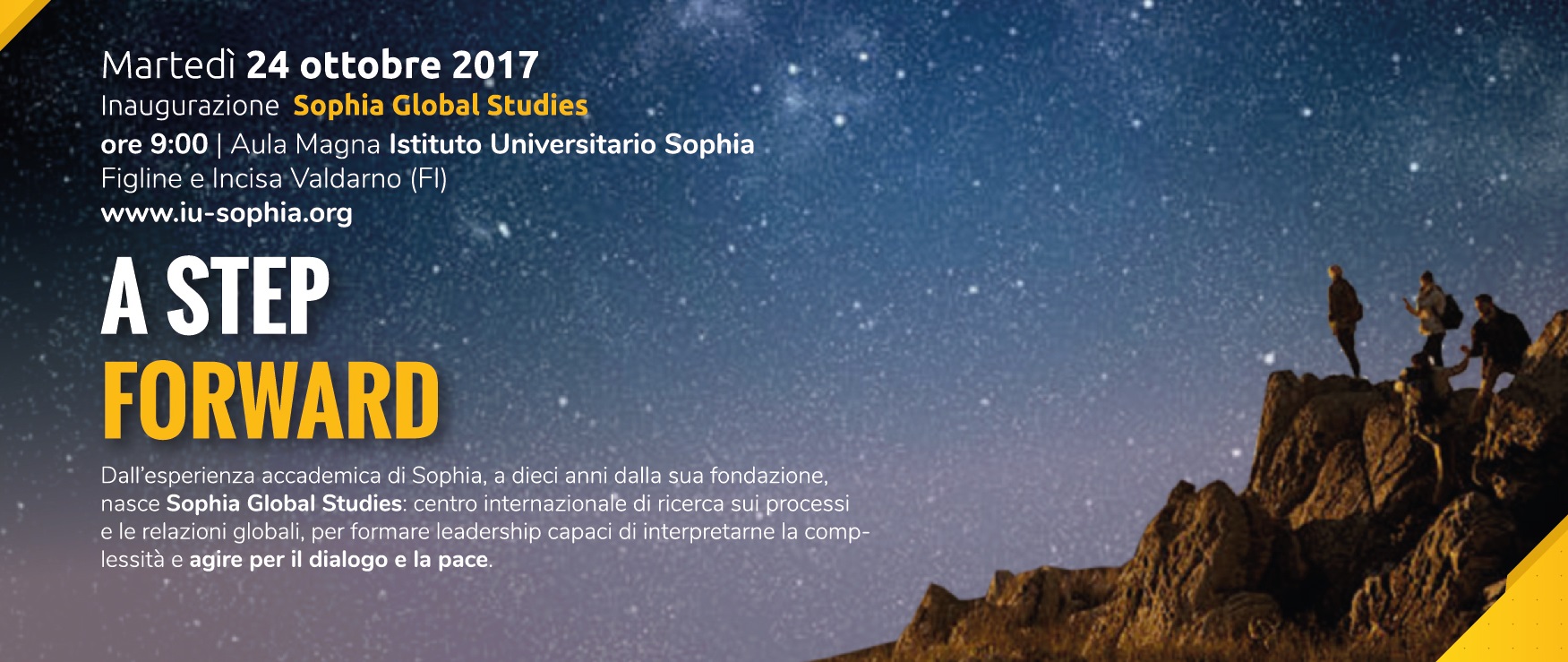 The tenth academic year of Sophia University Institute, which was formalized on December 7, 2007 by Pontifical Decree, will be launched on October 24, 2017. In the letter sent on that occasion to Chiara Lubich, who was the inspiration of Sophia, the Prefect of the Congregation for Catholic Education underscored the novelty of the Institute “that flows from the roots of the spirituality of unity and from the Movement’s rich experience.” He also asserted his best wishes for this “important project, well rooted in the academic tradition but also brave and forward-looking.” Ten year later, the Sophia academic community gratefully remembers the journey from then until now and plans strategies that will determine the near future in total faithfulness to the mission that has shaped Sophia Institute. The main event of the day will be the official opening of the new Sophia Global Studies Academic Centre. Inauguration Forum
The tenth academic year of Sophia University Institute, which was formalized on December 7, 2007 by Pontifical Decree, will be launched on October 24, 2017. In the letter sent on that occasion to Chiara Lubich, who was the inspiration of Sophia, the Prefect of the Congregation for Catholic Education underscored the novelty of the Institute “that flows from the roots of the spirituality of unity and from the Movement’s rich experience.” He also asserted his best wishes for this “important project, well rooted in the academic tradition but also brave and forward-looking.” Ten year later, the Sophia academic community gratefully remembers the journey from then until now and plans strategies that will determine the near future in total faithfulness to the mission that has shaped Sophia Institute. The main event of the day will be the official opening of the new Sophia Global Studies Academic Centre. Inauguration Forum

 The political and social context is very dangerous and the per capita income is among the lowest in the world as pressure from international powers is being placed on the enormous natural resources of the region. But there is also the echo of the great African leaders from the twentieth century, from Nkruah to Senghor, from Lumumba to Nyerere that still resonates like a warning to leave the past behind and set great goals that “always seem impossible until done” (Mandela). It was in that context that on November 4th of last year the Ecoforleaders School of Higher Training in Communion Leadership was inaugurated in Kinshasa, Democratic Republic of the Congo in the presence of several political, diplomatic, academic ((among whom the Rectors of the Catholic University and the University of Mapon, and the two Emeritus Rectors of the Kasangani University and the National Pedagogy), Christian and Muslim religious leaders in an attempt to lift up a hope for openness in that African country. It all began with a group of African students who wondered how they could offer themselves for the building of a new Africa. Now they are working with the support of Sophia University Institute and the Focolare’s International Centre of the Movement for Unity in Politics.
The political and social context is very dangerous and the per capita income is among the lowest in the world as pressure from international powers is being placed on the enormous natural resources of the region. But there is also the echo of the great African leaders from the twentieth century, from Nkruah to Senghor, from Lumumba to Nyerere that still resonates like a warning to leave the past behind and set great goals that “always seem impossible until done” (Mandela). It was in that context that on November 4th of last year the Ecoforleaders School of Higher Training in Communion Leadership was inaugurated in Kinshasa, Democratic Republic of the Congo in the presence of several political, diplomatic, academic ((among whom the Rectors of the Catholic University and the University of Mapon, and the two Emeritus Rectors of the Kasangani University and the National Pedagogy), Christian and Muslim religious leaders in an attempt to lift up a hope for openness in that African country. It all began with a group of African students who wondered how they could offer themselves for the building of a new Africa. Now they are working with the support of Sophia University Institute and the Focolare’s International Centre of the Movement for Unity in Politics.  The Secretary of the Bishops Conference of the Democratic Republic of the Congo was invited to cut the ribbon, a man know for having conducted the dialogue between politicians of the majority and opposition leaders during the election controversy that linked the presidential election date to the next census. The Secretary remains a point of encounter between the parties until this day. Five students will begin courses given by a faculty that includes three university rectors and several tutors. This is not an isolated initiative, because the School is inserted into a broader project already presented at UNESCO, a project of formation in a leadership style inspired by universal brotherhood, which include the training of tutors and professors in Nairobi next January. The project is of interest to the whole East of Africa and will last for three years. Afterwards, it will be expanded to other regions of the continent. See also: News Repubblica Democratica del Congo
The Secretary of the Bishops Conference of the Democratic Republic of the Congo was invited to cut the ribbon, a man know for having conducted the dialogue between politicians of the majority and opposition leaders during the election controversy that linked the presidential election date to the next census. The Secretary remains a point of encounter between the parties until this day. Five students will begin courses given by a faculty that includes three university rectors and several tutors. This is not an isolated initiative, because the School is inserted into a broader project already presented at UNESCO, a project of formation in a leadership style inspired by universal brotherhood, which include the training of tutors and professors in Nairobi next January. The project is of interest to the whole East of Africa and will last for three years. Afterwards, it will be expanded to other regions of the continent. See also: News Repubblica Democratica del Congo 














 A month and a half has gone by since the passing of Hurricane Maria, which caused the death of ten people and the destruction of thousands of homes, with its 250 km winds and torrential rains.
A month and a half has gone by since the passing of Hurricane Maria, which caused the death of ten people and the destruction of thousands of homes, with its 250 km winds and torrential rains. 



















 The organisers explained that this initiative was inspired by the appeal launched by Pope Francis for solidarity with Syrian people. Liz Taite of the Focolare Movement explained: “In a moment in which various circumstances are sowing division and conflicts, the Focolare Movement, together with people of different faiths, intends to publicly promote a message of peace. This event is the sign that God is at work and that peace is possible.” Azzam Mohammad, director of the Ahl Al Bait Society said: “Together we want to bring down the barriers, eliminate the fear and diffidence, and increase comprehension and mutual respect. We worked with sincerity and heartiness as a team, and it was a success. This is a step that marks the history of our common endeavours and will be an example for all the communities around us. Now we have started to plan for the next event.”
The organisers explained that this initiative was inspired by the appeal launched by Pope Francis for solidarity with Syrian people. Liz Taite of the Focolare Movement explained: “In a moment in which various circumstances are sowing division and conflicts, the Focolare Movement, together with people of different faiths, intends to publicly promote a message of peace. This event is the sign that God is at work and that peace is possible.” Azzam Mohammad, director of the Ahl Al Bait Society said: “Together we want to bring down the barriers, eliminate the fear and diffidence, and increase comprehension and mutual respect. We worked with sincerity and heartiness as a team, and it was a success. This is a step that marks the history of our common endeavours and will be an example for all the communities around us. Now we have started to plan for the next event.” 







 It is currently one of the biggest rural banks of the Philippines. But when Francis Ganzon (67 years old) took the helm in 1989, it only had one branch. Since then, the Institute has engaged in the support and empowering of the small and medium enterprises (SME), through the offer of quality financial systems “with a workforce united with God,” as the Bank site describes its “mission”. After obtaining his law degree, Ganzon dedicated himself to saving an institute, the Ibaan Rural Bank, Inc. (IRB), which was involved in cases of fraud. “I promoted a different work style, focusing on compliance with the laws, professionalism and centrality of the people, and promoted new practices in line with Christian values.” Ganzon embraced the spirit of the
It is currently one of the biggest rural banks of the Philippines. But when Francis Ganzon (67 years old) took the helm in 1989, it only had one branch. Since then, the Institute has engaged in the support and empowering of the small and medium enterprises (SME), through the offer of quality financial systems “with a workforce united with God,” as the Bank site describes its “mission”. After obtaining his law degree, Ganzon dedicated himself to saving an institute, the Ibaan Rural Bank, Inc. (IRB), which was involved in cases of fraud. “I promoted a different work style, focusing on compliance with the laws, professionalism and centrality of the people, and promoted new practices in line with Christian values.” Ganzon embraced the spirit of the 

























 Using a video game format, the young people gradually confront some of the issues they have to face in their daily lives: appearance, individualism, choices and consumerism. These are the four levels that the four actors on stage have to pass through to overcome and reach the last level with each other’s help. The keys that get them through each level are: values such as self-acceptance, solidarity, effort with regard to what the conscience suggests to every one of us, and sharing. But often you need to take into account the past that draws you back and the future that can paralyse you. Only one option is left: to live the present and, in that moment, take control and reset your history.
Using a video game format, the young people gradually confront some of the issues they have to face in their daily lives: appearance, individualism, choices and consumerism. These are the four levels that the four actors on stage have to pass through to overcome and reach the last level with each other’s help. The keys that get them through each level are: values such as self-acceptance, solidarity, effort with regard to what the conscience suggests to every one of us, and sharing. But often you need to take into account the past that draws you back and the future that can paralyse you. Only one option is left: to live the present and, in that moment, take control and reset your history. 







